
- South Korea
- Indonesia (Bali)
- Central Asia
- African Safari
- South Africa
- Itinerary Ideas

Best and Worst Times to Visit Greece 2024
Greece is famous for its stunning islands, deep history, and warm hospitality, which makes it a popular destination for summer vacations, honeymoons, and anniversaries.
For the best weather conditions, the best time to visit Greece is during spring (April to early June) or autumn (September to October) outside the summer peaks (July to August). These periods offer warm and sunny weather at around 24°C (75°F), without swarming crowds and the highest prices.
While planning a trip to Greece , read on to find out more detailed information about visiting Greece for different purposes and travel guides by month.
Discover real reviews of Highlights Travel Family 's best-rated service across trusted platforms.
Content Preview
- 1. Best Times to Do Greek Island-Hopping (Santorini, Mykonos...)
2. Best Times for the Cheapest Prices and Fewest Crowds
3. worst times to visit greece, 4. greece travel guide by month, 1. best times to do greek island-hopping (santorini, mykonos...).
Greek islands make up most of its stunning scenery, not limited to the Cyclades and Dodecanese.
The best time to do Greek island hopping is between late May and early October as there are more sunny days and the weather is warm enough to swim — the seawater's temperature exceeds 22°C (72°F).
During this period, the Aegean Sea shows its full beauty with crystal-clear seawater and stunning beaches as well as warm breezes bringing salty and fresh smells, making for a perfect summer vacation. Ferries and flights are also more frequent than at other times, so you can maximize your schedule.
But you would not be alone to enjoy this perfect time. Expect big crowds during the peak season from June to August , along with rising temperatures and prices.
To get the best prices and avoid crowds during this period, late May to mid-June and late September to mid-October would be your best choices. Most hotels and venues on the islands are already/still open and you could save at least 50% on costs without waiting in long queues and hot weather, with average highs exceeding 35°C (95°F).
To plan a perfect family summer vacation during this period, you may interested in How to Plan a Perfect Family Trip to Greece with Kids >>>
While spring and autumn are the shoulder seasons in Greece, winter (November to March) is considered to be the low season to go to Greece with the cheapest prices and fewest crowds. This is because of occasional rain or snow and cool weather averaging 12°C (54°F).
Most hotels and venues on the islands are closed during this period and it might be too cold to swim. But on the bright side, it won't make a significant difference to visiting historic sites and ancient ruins with a weather-smart schedule, and you won't encounter large crowds and long queues.
If you're planning to travel during festivals , such as Christmas and New Year, these are exceptions, with a sudden rise in prices of accommodation and flights from 40%. Making reservations 3–6 months prior to your trip would be helpful to get a better deal for your trip and avoid unreasonable costs.
Looking for a hassle-free vacation? Simply reach out to us at Global Highlights. Your needs would be taken care of in every respect by your professional consultant, and we would personalize a smooth and stress-free private tour just for you.
More detailed information about budget breakdown: How Much Does a Trip to Greece Cost >>>
Generally speaking, Greece is a year-round destination and could offer something whenever you pay a visit, with the worst time depending on where your interests lie.
If your itinerary includes a lot of outdoor sightseeing and hiking, then you should avoid July and August because of the uncomfortably hot weather with average highs exceeding 35°C (95°F), along with the highest prices and biggest crowds of the year.
However, if islands and beaches are a must for you, then November to March would be your worst time to visit Greece. During this period, most businesses on the islands close and the weather tends to be gloomy with occasional rain/snow, making it uncomfortable to engage in water activities.
Are you having trouble balancing island beach time with outdoor sightseeing? Late May, June, and October would be your best times to go to Greece when the crowds and prices are relatively lower and you could participate in everything you want to make the most of your vacation in Greece.
Need more advice to plan a perfect trip to Greece? Contact us now at Global Highlights and together we would customize a hassle-free private tour for you.
Click the link for each month to check out detailed travel guide information.
- Jan. and Feb.
- Jul. and Aug.
Greece in January and February
Weather in Greece in January and February is similar, with gloomy days and chilly air averaging 10°C (50°F).
Despite the fact that it might be uncomfortably cold/wet to spend a long time on outdoor sightseeing, these months offer distinct advantages, such as fewer tourists and lower prices. Imagine having renowned attractions, such as the Acropolis in Athens and the White Tower of Thessaloniki, all to yourself.
Besides visiting ski resorts, such as Metsovo and Arachova, for winter leisure, January and February also offer festivals that let you experience warm hospitality and local culture.
You could celebrate the New Year holiday and enjoy fireworks at Athens' Syntagma Square, witness the inspiring cross retrieval ceremony during Epiphany for blessings, and join in the joyful Patras Carnival. With an array of exciting events, you would not lack interesting things to do.
Greece in March
While most island destinations remain closed, weather in March in Greece brings cool yet sunnier, with temperatures averaging about 15°C (59°F).
Santorini offers tranquil moments in the warmth of the sun and the Meteora region offers awe-inspiring spring landscapes during a weather-smart itinerary.
Moreover, Greece celebrates its Independence Day on March 25th , a time when people gather to cherish hard-won victories. Join in the parades, dances, and toasts — foreign travelers can easily blend into the joyful atmosphere.
Greece in April
April is considered to be the start of the best times to visit Greece, with sunny days and warm temperatures of about 19°C (66°F), which is great weather for outdoor sightseeing or hiking but may still be too cold for water activities.
Since April also signals the start of the shoulder season, you won't encounter hordes of tourists in most regions. The exception is during Greek Orthodox Easter , which falls on May 5th in 2024.
Tourists from all over the world travel to Greece and gather in Athens to celebrate Easter, resulting in a brief surge in travel activity and prices.
Greece in May
May marks the month for the full opening of island destinations before the summer season. With warm temperatures averaging 23°C (73°F), it could be a great weather for sunbathing and swimming on one of these sun-soaked paradises. Furthermore, this is the last opportunity to seize low-season discounts on popular islands, such as Santorini, Naxos, and Paros.
Not limited to islands alone, mainland Greece also shines in May. Gorgeous wildflowers blanket the mountains and plains, painting an idyllic scene that would captivate your eyes.
Greece in June
June brings about an increase in temperatures, rising to about 28°C (82°F), alongside the increasing crowds and prices. As the coolest month of the summer season, June offers sunny weathers and perfect conditions for visiting your desired destinations.
Hike in the Parnassos National Park in Delphi , explore the charming streets of the old town in Nafplio , or unwind on the captivating pink sands of Elafonisi Beach in Crete . Greece in June gives a warm welcome wherever you want to visit.
Greece in July and August
July and August in Greece form the peak of summer, both with scorching daily high temperatures averaging about 32°C (90°F) and swarms of holiday-makers from all over the world. Islands like Mykonos and Santorini beckon with their crystal-clear waters and lively atmosphere, inviting you to relax on stunning beaches and enjoy the vibrant nightlife.
If you prefer history and culture, explore the indoor sites to escape the heat. The Acropolis Museum or the National Archaeological Museum in Athens could be great options. To avoid crowds and the summer heat, visiting at less popular times of the day would be helpful, such as in the morning before 8am or at lunchtime between 11am and 1pm.
Greece in September
September in Greece brings milder weather, with temperatures averaging about 27°C (81°F). It's an ideal time for exploring Greece without the intense summer heat or the large crowds of tourists.
Enjoy pleasant seaside temperatures on the Greek islands, embark on boat trips to explore the volcano and hot springs in Santorini, or indulge in water sports, such as snorkeling and windsurfing, in Crete.
On the mainland, consider attending one of the local wine festivals that take place in September, such as the Anhiolos Wine Festival in Thessaloniki. It would add extra fun to your journey and you could experience the rich wine culture of Greece.
Greece in October
The weather tends to be mild in October in Greece, with high temperatures averaging about 22°C (72°F) and sunny days, making it an ideal month to explore Greece.
The Greek islands have a quieter ambiance without crowds and such high prices. Most facilities would still be operating, allowing you more space to savor their beauty and tranquility.
With such good weather, October is also an opportune time to delve deeper into Greece's cultural heritage. Marvel at the Heraklion Archaeological Museum in Crete or explore the Sanctuary of Asklepios at Epidaurus, a UNESCO World Heritage site.
Greece in November
November is the start of the low season for visiting Greece, bringing cooler temperatures averaging about 17°C (63°F). Most islands close from this month until May since it is too cool for most to relax on the beaches.
While visiting islands may not be a good choice, you could explore mainland Greece during this month as it offers a different kind of charm. Take leisurely walks to explore the bustling cities and towns, appreciate the changing of the guard at Syntagma Square, and enjoy the opportunity to connect with the locals on a more personal level.
Greece in December
December in Greece is considered to be the festive month of the low season and temperatures average about 14°C (57°F).
While the weather may be cooler than other months, Greece is still warmer than most countries in Europe. The cities come alive with enchanting decorations and a joyful atmosphere, attracting people there to celebrate Christmas.
Explore the Christmas markets in Athens or Thessaloniki, where you could enjoy the dazzling lights, festive music, the warmth of Greek hospitality, and even find unique gifts for your loved ones.
Keep in mind to reserve your accommodation and flights 3–6 months before your trip for a better deal. Or you could simply reach out to us now at Global Highlights and we would personalize the perfect private tour for you.
Why Global Highlights (10,000+ reviews & 98.8% 5-star rating)
- Save Your Time:
- Less research, more enjoyment!
- Real-time 1V1 expert planning
- Maximize Your Flexibility:
- Personal local guide and ride
- Explore at your own pace
- Celebrate Your Journeys:
- Specially-crafted family adventures
- Celebrate milestones with style!
- African Safari 2024/2025 | Witness the Big Five Live
- Private Egypt Tours 2024/2025 | Creating Lasting Memories
- India Tours 2024/2025: Unique Personalized Experiences
- Japan Private Tours 2024/2025: Unique Personalized Experiences
- Private Morocco Tours 2024/2025: Personalized and Stress-free
- Middle East Tours 2024/2025: Personalized and Stress-free
- Thailand Tours
- Vietnam Tours 2024/2025: Unique Personalized Experiences
- Top Private Turkey Tours 2024/2025: Personalized and Stress-free
- Greece Weather in January: Travel Tips for First-Timers
- Greece Weather in February: Travel Tips for First-Timers
- Greece Weather in March: Travel Tips for First-Timers
- Greece Weather in April 2024: Travel Tips for First-Timers
- Greece Weather in May 2024: Travel Tips for First-Timers
- Greece Weather in June 2024: Travel Tips for First-Timers
- Greece Weather in July 2024:Travel Tips for First-Timers
- Greece Weather in August 2024: Travel Tips for First-Timers
- Greece Weather in September 2024: Travel Tips for First-Timers
- Greece Weather in October 2024: Travel Tips for First-Timers
- Greece Weather in November 2024: Travel Tips for First-Timers
- Greece Weather in December 2024: Travel Tips for First-Timers
Get Inspired with Some Popular Itineraries
Sign up to our newsletter.
Be the first to receive exciting updates, exclusive promotions, and valuable travel tips from our team of experts.
Why Global Highlights
Where can we take you today.
- Southeast Asia
- Japan, South Korea
- India, Nepal, Bhutan, and Sri lanka
- Travel Agents
- Privacy Policy

Address: Building 6, Chuangyi Business Park, 70 Qilidian Road, Guilin, Guangxi, 541004, China


Real Greek Experiences
Greek Culture, Travel Information, Itineraries, Life in Greece
Top 10 Tips For Visiting Greece In Summer 2024
Summer in Greece is lovely, but it can also be very busy and hot! Here are a few tips for visiting Greece in summer 2024, to help you enjoy your holiday.

Summer Vacation in Greece
Greece is one of the most popular holiday destinations in Europe, and for good reason. Everyone loves Greek mythology and culture, the food, all those beaches, and the endless hours of sun.
If it’s your first time in Greece though, check these top 10 tips for traveling to Greece in the summer first.
1. Visit Greece in summer, but avoid July and August
Here is my number 1 tip: if you can, try to avoid July and August . Visit Greece in early June, mid September or even early October instead.
Here’s why June and September are the best months to visit Greece:
- Accommodation prices are lower
- Flight costs are generally lower
- It’s easier to find last minute ferry tickets to the islands
- Most places in Greece are less crowded
- The weather is cooler and less windy
- The locals are in a better mood!
This is even more important for popular destinations such as Santorini and Milos . It’s also crucial if you love active holidays, especially hiking or cycling.
Athens and Thessaloniki are an exception to the above. As many Greeks go on vacation in August, the cities are busier with tourists rather than locals.
Check out this article on the cheapest time to visit Greece .
2. Prepare for the heat
Summer temperatures in Greece can rise above 35 C (95 F), and sometimes even above 40 C (104 F). You will need to plan your days accordingly.
Visit the ancient sites as early as possible, in order to avoid walking underneath the scorching sun.
You can then visit a museum or two , and make best use of the air-conditioned spaces as it gets hotter around midday.
A late lunch, followed by a few hours on the beach, will also be appealing to most people, especially families. You can also visit the ancient sites just before sunset.
Sunset from the temple of Poseidon at Cape Sounio
Even if you plan to spend all your time on the beach, you need to think about the sun and the heat. Whatever you do, do not forget your hat and sunscreen – and make sure you drink enough water!
Check this guide: How to stay cool in the summer in Athens
3. Try different beaches
If all you want to do in the summer in Greece is to hit the beach, you are not the only one.
The beaches on the most popular Greek islands , like Mykonos or Santorini, can get very crowded in the summer months. July and August, when many Greeks also go on holiday, are the busiest months.

If you prefer less crowded beaches, have a look on the map. There are plenty of quieter islands waiting to be discovered, like Andros , Tinos , Kimolos , Sikinos, Donoussa, Ithaca or Astypalaia, to name just a few.
You can also consider a road trip along the Greek coast in the Peloponnese, Epirus, Pelion, Chalkidiki, Evia or South Crete. Check out this article with some of my favourite beaches in Greece .
4. Not all beaches are the same
Keep in mind that not all beaches are the same. A beach that is ideal for windsurfing will be unsuitable for snorkelling, and a beach that attracts teenagers and young adults might not be appealing to families.
If you are interested in summer sports like windsurfing or kite surfing, check out places like Pounda Beach in Paros, Vasiliki in Lefkada and Prasonisi in Rhodes. The winds here make the waves perfect for water sports enthusiasts.

These might not be suitable for families with younger children though. A beach which is more sheltered from the meltemi wind would be a better option. There are plenty of areas with calm clear waters to choose from!
5. Pre-booking ferry tickets and rooms during busy periods is essential
Even in the age of budget airlines, Greek island-hopping on the ferries has never been more popular.
Twenty years ago, it was common to just show up at Piraeus port in Athens, buy a ticket to an island, and hop on a ferry.
Upon arrival on the island, several people were there advertising rooms to let at the fishing villages. Even at the busiest times of the year, there always seemed to be ferry tickets and rooms available.

Times have changed. These days, if you are catching a ferry from Piraeus in the peak season, it’s best to book your tickets in advance.
It’s even more important to pre-book your tickets if you are travelling on a Friday or a Sunday, when many Athenians also choose to travel, and the ferries can be packed.
I recommend using Ferryscanner for your Greek ferry tickets.
In terms of accommodation, you should be ok finding last-minute rooms in the shoulder season. If you are travelling in summer, it’s much better to book in advance.
6. Greek food tastes even better in summer
I am probably biased, but… Greek food tastes even better in the summer! Delicious fish, fresh salads and plenty of vegetarian dishes complement the all-year-round souvlaki and moussaka .

On hot days, you will probably find that a Greek salad and a big bowl of fruit will soon become your favourite meal – possibly along with a cold beer or a glass of ouzo 🙂
Check out this list of 50 delicious Greek dishes , and this guide to popular Greek drinks .
7. See a performance at an ancient Greek theatre
With the abundance of ancient sites in Greece, it’s hardly surprising that some musical and theatrical performances take place in ancient Greek theatres .
If you are in Athens or in the Peloponnese, check out any cultural events at the Herodion and Epidaurus theatre . The feeling of watching a performance in a 2,000 year old theatre is amazing!

Read about the Athens and Epidaurus festival in this guide to the best time to visit Athens .
8. Beware of strikes
Sometimes, there are transport strikes in Athens and Greece . Ferries, trains, aeroplanes, taxis, as well as the Athens metro , tram and buses can all be affected.
Strikes are often announced at the last minute, and can seriously affect your trip. Sometimes, they are supported by gatherings or demonstrations, usually around Syntagma square.

If you are flying into and out of Athens from your home country, and are then moving on to another area, I strongly recommend allowing at least one day in Athens before you have to catch your flight back home.
I update this Facebook page regularly with strike information, so make sure to follow.
9. A week is not enough to see all of Greece
Greece is a small country, but visiting all the best known attractions can take you a surprisingly long time.
If you only have a few days in Greece, focus on two or three areas rather than trying to fit in five or six destinations. Chances are, after your visit you will want to return to Greece again and again!
Read more at this article: Planning a trip to Greece .
10. Siga siga – Take it easy!
If you want to experience life in true Greek style, you need to take things easy – siga siga ! Enjoy a Greek coffee or frappe , a delicious Greek meal and a long chat with your newly made friends. This is what a Greek summer is all about!
Frequently asked questions about summer in Greece
Here are a few things you need to know if you are spending some of your summer in Greece:
What are the summer months in Greece?
The summer months in Greece are June, July and August. This is considered the high season in Greece.
What is the hottest month in Greece?
The hottest months in Greece are July and August. If you can’t tolerate the heat, and prefer mild weather, consider visiting in spring or autumn instead.
Is Greece better in July or August?
Both July and August are the warmest and busiest months in Greece. If you prefer fewer crowds, try to visit in June or September if you can.
Is summer hot in Greece?
Summer in Greece is hot. Average day temperatures can often exceed 35-40 C (95-104 F). Nighttime temperatures are lower, and you might even need a light sweater. Sea temperatures range between around 22-26 C (72-79 F), and the Aegean Sea is colder than the Ionian Sea.
Can you swim in Greece in June?
June is a wonderful time to swim in Greece and the Greek islands. The sea has warmed up after the winter, and the days are sunny and clear.
Are there any movies about Greece in summer?
Some of the most famous movies about summer in Greece include Sirley Valentine, Mamma Mia and the Big Blue. Here is a big fat list of movies about Greece !
Are there any books about summer in Greece?
There’s a book by Patricia Wilson which is called “Summer in Greece”. It’s a beautifully written story about a lady called Shelly Summer, who often escapes the British rain and spends her vacation on the Greek islands.
At some point, Shelly discovers the memoirs of her great grandmother, Gertie Smith. She realizes that Gertie had spent some of her life on the Greek island of Lemnos. The book follows a split timeline, linking Shelly to her great grandma and the Great War.
More travel guides about Greece and the Greek islands
Not a summer person? No worries! Greece is a year-round destination. Have a look at these articles – you might be surprised!
- Athens in November
- The hottest Greek islands in October
- Santorini in winter
- The best time of year to visit Greece
- Greek celebrations
- Greek Easter , including Easter Sunday celebrations
- Christmas in Greece
- Athens to Thessaloniki by train
- Useful words and phrases in Greek
- Greek SIM cards

Hi and welcome to my blog! I am Vanessa from Athens, and I love summer in Greece. My favourite months are June and September, as the beaches are quieter, and it’s easier to get around – plus, the weather is better for hiking. For more information about Greece, follow my FB page and FB group .

4 thoughts on “Top 10 Tips For Visiting Greece In Summer 2024”
Wow! Thank you so much for this amazing guide! I’ve already spent a lot of time to plan my trip to Greece this summer! By the way, one of the problem that I have is to find a suitable cell phone carrier. I found some companies that offer international calling plans – Have you heard smth about it?
In our (extensive!) experience, when we travel ourselves, it’s always best to buy local SIM cards. Here in Greece, we both use a prepaid SIM card called Cosmote Whatsup. Cosmote has the best coverage in Greece, and you can get several GBs for just a few euros.
Vanessa. Your letter is loaded with great ideas. My wife and I will be enjoying a 3 day stay in Athens in May. Its wonderful to read your thoughts and what to do in Greece, Thankyou
May is a fantastic time of year to be here! Enjoy your vacation!
Leave a Comment Cancel reply
Save my name, email, and website in this browser for the next time I comment.
- Search Please fill out this field.
- Manage Your Subscription
- Give a Gift Subscription
- Sweepstakes
- Travel Tips
The Best Time to Visit Greece for Good Weather, Fewer Crowds, and Affordable Prices
Greece is calling your name.
:max_bytes(150000):strip_icc():format(webp)/Stacey-Leasca-2000-631fabdcfe624115bea0ce8e25fdec96.jpg)
Greece has long beckoned travelers with its beauty. From the crystalline waters in the surrounding Mediterranean Sea and the rich historical sites that dot the nation's map to the divine cuisine and stellar hotels, the European country deserves a spot high on travelers' wish lists.
Travelers flock to Greece year-round, but some months are better to visit than others, especially if you're keen to explore beaches, avoid the masses, or score a deal on a hotel room. Here are the main tourist seasons to keep in mind:
- High Season: June to September
- Shoulder Seasons: April to May and October
- Low Season: November to March
Ready to plan your trip? Here are the best times to travel to Greece, whether you're after good weather, affordable prices, or fewer crowds.
Michela Buttignol/Travel+Leisure
Best Times to Visit Greece for Smaller Crowds
Unsurprisingly, the most popular times to visit Greece are the late spring, summer, and early fall months. This is when the weather is ideal, and all the venues open their doors, inviting guests to stay, eat, and drink.
According to CEIC Data , Greece received 3.64 million tourists in June 2022. In July of the same year, that number rose to 5.27 million, and in August, a whopping 5.86 million enjoyed a Greek getaway, making it by far its busiest month to visit. Numbers dropped in the fall, with 4.56 million visitors in September and 2.75 million in October.
If you don't plan on hitting the beaches, consider a trip to Greece during the winter. While the weather is cooler (the average temperatures hover around 50 degrees Fahrenheit), the crowds are much thinner. In 2023, around 635,000 people visited Greece in January, and a mere 572,500 came in February. In fact, the nation didn't crack one million visitors until April, making the winter much more manageable if you're trying to avoid crowds. However, many venues and hotels close for the winter, so search for accommodations in your intended destination to see what's available and when.
Alessandra Amodio
Best Times to Visit Greece for Good Weather
If you're after warm weather but want to avoid the sweltering heat, plan a trip in late spring or early fall (April through June or September through October). In May, the average temperature in Athens, the nation's capital, ranges from a high of 74.8 degrees Fahrenheit to a low of 61.5 degrees Fahrenheit. In June, things warm up to an average high of 82.6 degrees Fahrenheit — perfect for taking a dip in the ocean.
In September, the average temperatures drop a little in Athens to a high of 80.6 degrees Fahrenheit and a low of 69.6 degrees Fahrenheit. October is even chillier, with an average high hitting 71.4 degrees Fahrenheit and an average low around 62.1 degrees Fahrenheit. Yes, it's cool, but nowhere near cold enough to feel uninviting. Just remember, the country is relatively large, especially if you include the best islands in Greece , so check your exact destination for average temperatures before booking.
Best Times to Visit Greece for Lower Prices
Visiting Greece on a budget is possible. All you need to do is plan accordingly. According to Skyscanner , the cheapest months to book a flight to Greece are October, November, March, and April. The website notes that July tends to be the most expensive month to fly to Greece, so it's best to avoid the middle of the high season if you're trying to save money.
While April is a less expensive month to fly, it's worth noting that hotel prices increase slightly during Greek Orthodox Easter, which sometimes falls at the end of April. The end of December and the beginning of January see a similar spike. Hotels tend to be pricey during July and August, so avoid these busy months if you're looking for lower room rates.
Best Time to Visit the Greek Islands
Again, the best time to visit depends on what you're after, but generally speaking, for the most delightful weather, plan a trip to the Greek islands in the late spring, early summer, or beginning of fall. Yes, you can visit in midsummer if you don't mind the heat (and being shoulder-to-shoulder with other travelers).
For example, in Santorini, the average high in July hits 84 degrees Fahrenheit, while the average low is 73 degrees Fahrenheit. The upside is the ultra-warm water at this time of year, with an average sea temperature of 75 degrees Fahrenheit. In July, the island typically only experiences one or two rainy days, making your chances of basking in the sun pretty good.
September is considered one of the best months to visit the Greek islands, as the weather is still sunny and warm, and the crowds have thinned out. However, you'll want to research the island you plan to visit since temperatures vary across the archipelagoes.
Worst Times to Visit Greece
There's no bad time to visit Greece. However, July and August can be uncomfortably hot and humid — especially in Athens — with temperatures often soaring above 86 degrees Fahrenheit. The capital city and Cycladic islands (including Mykonos and Santorini) are also at their most crowded and expensive during these months, so it's best to avoid midsummer if you're looking for more elbow room, lower prices, and a relaxed atmosphere.
On the flip side, January is the coldest month in Greece, with temperatures hovering around 55 degrees Fahrenheit. While the cool weather is ideal for exploring historical sites, shops, and art galleries in Athens , it will likely be too chilly to swim in the ocean. If your dream vacation in Greece includes beach time, avoid visiting during the winter months.
:max_bytes(150000):strip_icc():format(webp)/Julia-Eskins-Headshot-Julia-Eskins-2000-422db59e8e3a4b15b4c26bc7bfa75413.jpeg)
Advertiser Disclosure
Many of the credit card offers that appear on this site are from credit card companies from which we receive financial compensation. This compensation may impact how and where products appear on this site (including, for example, the order in which they appear). However, the credit card information that we publish has been written and evaluated by experts who know these products inside out. We only recommend products we either use ourselves or endorse. This site does not include all credit card companies or all available credit card offers that are on the market. See our advertising policy here where we list advertisers that we work with, and how we make money. You can also review our credit card rating methodology .
The Best Time To Visit Greece [By Seasons and Interests]
Katie Seemann
Senior Content Contributor and News Editor
341 Published Articles 44 Edited Articles
Countries Visited: 28 U.S. States Visited: 29
Editor & Content Contributor
146 Published Articles 727 Edited Articles
Countries Visited: 35 U.S. States Visited: 25
Keri Stooksbury
Editor-in-Chief
29 Published Articles 3077 Edited Articles
Countries Visited: 45 U.S. States Visited: 28
![best time to visit greece in the summer The Best Time To Visit Greece [By Seasons and Interests]](https://upgradedpoints.com/wp-content/uploads/2022/08/Santorini-Greece-1.jpg?auto=webp&disable=upscale&width=1200)
Greece: At a Glance
Spring (march, april, may), summer (june, july, august), fall (september, october, november), winter (december, january, february), the best time to visit the greek islands, the best time to visit mykonos, the best time to visit santorini, the best time to visit crete, the best time to visit corfu, the cheapest time to travel to greece, final thoughts.
We may be compensated when you click on product links, such as credit cards, from one or more of our advertising partners. Terms apply to the offers below. See our Advertising Policy for more about our partners, how we make money, and our rating methodology. Opinions and recommendations are ours alone.
Greece is a bucket-list destination for many travelers. This Mediterranean country offers incredible historical sites like the Acropolis, iconic views in places like Santorini, and lively nightlife in Mykonos, along with plenty of art, culture, and breathtaking scenery throughout the country.
A question many people ask is: “What’s the best time to visit Greece?” While there’s no definitive answer to this question, there are some guidelines you may want to follow based on what you’re looking for (great weather, no crowds, etc.).
In this post, we’ll go over the benefits and drawbacks of visiting Greece in each season and look at the best times to visit based on your interests.

Greece is located in southeastern Europe, boarded by Albania, North Macedonia, Bulgaria, and Türkiye. While you may be familiar with some of the country’s more famous islands like Crete, Santorini, and Mykonos, there are actually thousands of islands scattered throughout the Ionian and Aegean Seas, giving the country one of the longest coastlines in the world.
Greece thrived in ancient times and is often called the cradle of Western civilization. Perhaps its most famous landmark is the Acropolis , which includes the Parthenon and the Temple of Athena Nike. These sites have enormous architectural and historical significance and can draw 16,000 visitors in a single day .
Greece has a Mediterranean climate, meaning it’s hot and dry in the summer and cool and wet in the winter. During the summer, it can be very hot and there’s little rainfall. Summer heat in Greece is no joke — Athens is often cited as the hottest capital city in Europe. In the winter, northern and mountainous regions can see snow while southern islands remain mild.
Hot Tip: The currency in Greece is the euro, so be sure to have some handy. We also recommend using a credit card without foreign transaction fees whenever possible.
The Best Time To Visit Greece by Season

If you’re looking for mild weather and smaller crowds, consider visiting Greece in the spring. April and May are great times to visit as long as the beach isn’t the first priority on your to-do list (it’s still a little chilly for the beach during these months). Average daytime temperatures range from about 60 degrees in March to about 77 degrees in May.
Most of the Greek Islands are fully open by May for the summer tourism season.
Holy Week and Easter (March or April, depending on the year) are important times in the country, so you may see prices increase during these events.
- Apokries (February or March)
- Orthodox Easter and Holy Week (March or April)
- Salsa Spring Festival (May)

It probably comes as no surprise that summer is the most popular time to visit Greece . Unfortunately, this also means it’s the most crowded time in Greece.
July and especially August are the hottest and busiest months in the country. If you’re planning on visiting historical sites in Athens or popular islands like Santorini or Mykonos, be prepared for extreme heat and huge crowds.
Average daily temperatures range from about 86 degrees to 90 degrees, but it’s not uncommon to see days that exceed 100 degrees.
- Athens Epidaurus Festival (all summer)
- Kalamata International Dance Festival (July)
- Rockwave Festival (July)
- Olympus Festival (July to August)
- Sani Festival (July to August)
- Vovousa Festival (July to August)
- Molyvos International Music Festival (August)
Hot Tip: If you enjoy unique accommodations, check out these boutique hotels in Athens .

Early fall — especially September — can be a great time to visit Greece since it’s still warm but crowds start to thin once kids are back in school.
September has an average daily temperature of 83 degrees, but after that, cooler days start to appear. The average daily temperature in October is 73 degrees and it drops to 64 degrees in November.
While October might be a little too cool for swimming, it’s a wonderful time for sightseeing. The rainy season starts around the end of September, so keep that in mind when you’re visiting Greece in the fall. And don’t forget to pack a travel umbrella or rain poncho !
- Athens International Film Festival (September to October)
- Athens Marathon. The Authentic (November)
- Thessaloniki International Film Festival (November)

Winter is the low season in Greece , with crowds and costs at a minimum beginning in November all the way until March. Many tourist attractions have shorter hours and some islands can even close for the whole season.
Winter can actually be a decent time to visit Athens, though. While the weather can be chilly, it’s not frigid, with average daily temperatures hovering around 55 degrees. There are lots of Christmas festivities throughout the city in December, making it a fun time to visit the capital.
Popular attractions like the Acropolis will be less crowded during the winter and it can also be a great time for cheaper airfare and hotel prices. According to Google Travel , December is the least expensive month to visit Greece.
- Christmas in Athens (December)
The Best Time To Visit Greece by Interest and Island

Greece is known for its islands. The best times to visit the Greek Islands are the summer months of June and July . August is a popular month to visit but it can be incredibly crowded. Some islands are also great to visit as early as April or May and as late as September.
Generally, winter is not a great time to visit the Greek Islands. The weather can be cold and wet and many hotels, restaurants, and shops shut down for the season. This is especially true on the smaller islands. Ferry schedules are also reduced during winter, so travel between the islands can be more difficult.
Hot Tip: No matter what month you visit, you can use points and miles to fly to Greece .
The best times to visit Mykonos are the late spring or early fall . During these times, temperatures are still warm, but it’s less crowded and hotel prices are lower.
Of course, if you’re after the iconic summer beach-party vibe the island is known for, you’ll need to brace yourself for heat and crowds if you visit during the popular summer months of June, July, and August. The summer weather is hot, dry, and windy with average temperatures peaking around 84 degrees in July and August. August also tends to be the most crowded month so try to avoid traveling then if you can.
It’s possible to visit Mykonos during the winter . The weather, while unpredictable, is relatively mild, with low temperatures only dipping into the upper 40s.
While you’ll avoid crowds and pay less for your trip, keep in mind that many restaurants, shops, and attractions may be closed and ferry service can be limited. However, if you’re interested in strolling the almost empty streets to take in all of the island’s beauty, winter can be a great time to visit Mykonos.

Santorini, also known as Thira, might be the most popular island to visit in Greece and is undoubtedly one of the most recognizable in all of Europe . Summer is the busiest time on the island, with most visitors coming in July and August. To avoid crowds, schedule your trip in the shoulder months of April, May, September, or October when crowds are thinner but the weather is still warm.
November through March are the coolest months with high temperatures between 57 and 60 degrees and lows ranging from 50 to 57 degrees. While winter is a good time to visit to avoid crowds, it’s also the wettest season in Santorini, so be sure to pack accordingly.
Hot Tip: Check out these boutique hotels in Santorini if you’re looking for a unique place to stay.
Crete is the largest of the Greek Islands , and as the southernmost island in the country, it’s one that can be visited year-round.
Generally, May, June, and September are the best months to visit Crete for the perfect balance of great weather and fewer crowds. As with most of the Greek Islands, July and August are the hottest and most popular times to visit, so crowding can be an issue.
Hot Tip: Not sure where to stay? Check out these boutique hotels in Greece (including the Greek Islands) .
Corfu is a Greek Island in the Ionian Sea known for its beaches. If you want to soak up some sun on the beach, the best time to visit Corfu is in the summer (July and August specifically) when the weather is hot and dry. However, that’s the most crowded time on the island, as well. If you’d like to avoid crowds as much as possible, try to visit in the shoulder months of May, June, and September for a nice balance of good weather and reasonable crowds.
The cheapest time to visit Greece is during the winter . This is a time when crowds are almost non-existent and prices for things like accommodations, flights, and even food are at their lowest. Keep in mind, though, that certain areas of Greece, especially the islands, will see many shops and restaurants close down for the season, so plan your trip accordingly.
Hot Tip: According to Kayak , February is the cheapest month to fly to Greece. To save money on flights, check out these booking websites .
Greece is an incredible country to visit and is high on many travelers’ bucket lists. In addition to famous ancient ruins like the Acropolis in Athens, there are thousands of islands to visit. You’ll find gorgeous beaches, delicious food, mountains for hiking, and plenty of small towns to explore.
The best time to visit Greece can vary based on what you’re looking for, but generally, you’ll want to shoot for the shoulder seasons of late spring and early fall. These time periods offer a nice balance between weather that’s not too hot and crowds that aren’t too thick. Whenever you decide to go, Greece is definitely a country you’ll enjoy visiting.
Frequently Asked Questions
What is the best season to travel to greece.
For the best balance of good weather and reasonable crowds, the best seasons to travel to Greece are spring and fall.
What is the best time to visit Greece to avoid crowds?
If you want to avoid crowds in Greece, visit in the winter. Tourists are few and far between during the winter months. However, if you’re visiting the Greek Islands it will be too cold for swimming and some shops, restaurants, and attractions may be closed for the season.
What is the best time to go to Greece for beaches?
If you’re going to Greece for the beaches, the best times to visit are July and August. The weather will be hot and dry — perfect for a day at the beach. June and September will also be warm enough for swimming, and these months have the benefit of slightly fewer visitors.
What is the off-season in Greece?
Winter is the off-season in Greece. From November to March, the weather can be chilly and wet, and many of the islands partially shut down since there are so few tourists.
Does Greece have a rainy season?
Yes, the rainy season in Greece lasts from the end of September until June. November and December are the rainiest months of the year. July and August are the driest months, with almost no rain.
Was this page helpful?
About Katie Seemann
Katie has been in the points and miles game since 2015 and started her own blog in 2016. She’s been freelance writing since then and her work has been featured in publications like Travel + Leisure, Forbes Advisor, and Fortune Recommends.
INSIDERS ONLY: UP PULSE ™

Get the latest travel tips, crucial news, flight & hotel deal alerts...
Plus — expert strategies to maximize your points & miles by joining our (free) newsletter.
We respect your privacy . This site is protected by reCAPTCHA. Google's privacy policy and terms of service apply.
Related Posts
![best time to visit greece in the summer The Best Times To Visit Hawaii in 2023 [By Seasons & Islands]](https://upgradedpoints.com/wp-content/uploads/2020/05/Maui-Sunset.jpg?auto=webp&disable=upscale&width=1200)
UP's Bonus Valuation
This bonus value is an estimated valuation calculated by UP after analyzing redemption options, transfer partners, award availability and how much UP would pay to buy these points.
The best time to go to Greece

Jul 3, 2023 • 6 min read

Greece’s most significant spiritual holiday, Orthodox Easter, takes place in either April or May ©Hector Christiaen/Shutterstock
Greece is famed for its crystalline seas, ancient attractions, and warm hospitality.
Summer is when most travelers choose to explore its countless islands , while spring and fall are the best times of year to marvel at the myriad of archeological sites dotted around the country.
Winter can be cool and occasionally rainy but for those conscious about budget or interested in seeing how the locals live, the vibrant capital of Athens still delivers history, culture, and good times in spades, even when the sunshine starts to fade.
Whether you’re dreaming of the southeast Mediterranean nation’s dreamy beaches , ancient allure, or buzzing city life, these are the best times to visit Greece.

May to October is best for island-hopping
Orthodox Easter, Greece’s most significant spiritual holiday, lands in April or May and unofficially debuts in the island-hopping season. In the final month of spring, the seas only just start to lose their winter chill and are still too cool for swimming, at least by local standards. In May, the average daily high is a warm 77°F and days are normally sunny.
Keep in mind that the deep cobalt waters of the Aegean, in the north and south, take longer to warm up than the shallower, turquoise seas of the Ionian , west of mainland Greece. The further south you sail through the Aegean archipelago, the hotter it gets, at least on land, and so the longer the warm weather season. Islands such as Rhodes and Crete are ideal for a sunny shoulder season getaway in May, September, or October when beaches are empty of schoolkids (with the exception of UK mid-term holidays).
June affords the longest days of sunshine, peaking in the second fortnight. It’s also an opportune time for your first, refreshing dip of the summer. July and August are the busiest months of the year on the islands, so expect high airfares, peak season hotel rates, crowded beach bars, bustling main towns, and packed restaurants in popular destinations like Mykonos , Santorini , and Paros , among others. Southern Europeans, including Greeks retreating to their second homes, gravitate toward the islands at this time of year.
July and August are also the hottest and driest months in Greece, with average temperatures often exceeding 86°F, and there is the potential for stifling heatwaves. Thankfully, the Meltemi, a welcome north wind that makes its appearance mostly between June and September, tempers the heat. Still, if you’re intent on visiting during July and August, be sure to book a good six months or more in advance to secure slightly better airfares and hotel rates.
By September, Greece’s seas have thoroughly warmed through and school holidays are over, meaning that you’ll have more room to yourself at that idyllic beach and a peaceful night’s sleep. Airfares and hotel rates are also more affordable. As a result, it’s now one of the most popular months of travel for those who want to enjoy a more relaxing island or mainland holiday.
By about mid-October, Greece’s seas start to pick up swell, and air temperatures begin to fall, while the majority of hotels stay open until the end of the month. It’s still an excellent time of year to visit, as long as you come prepared, with warmer clothing for cooler evenings.

See the ancient sites in spring or fall
From the Vergina Royal Tombs Museum dating to the times of Alexander the Great in Macedonia to the Minoan-era Palace of Knossos in Crete , ancient marvels and historical monuments liberally dot the landscape, wherever you journey throughout Greece. Stonebuilt temples, palaces, and castles act like a magnet for sunlight, so the best times of the year to plan your history geek-out is March, April, or October. The weather is comfortably cool and the crowds are noticeably thinner. As an added bonus, you can expect to pay less for flights and accommodation .
Layers of clothing, such as short-sleeve shirts and a light fleece jacket, are vital to ward off the chill but also to peel off as you hike between ruins and landmarks. Pack a water-resistant jacket and hiking shoes because showers are a real possibility, while March also brings occasional snowfall in mountainous mainland areas such as Central Greece .
Scratch below the surface of Greece’s archaic attractions and museums by booking a small group or private tour, led by a state-licensed guide. Rather than wander around the sacred ancient temples of Delphi on your own, seek out an on-the-ground expert, many of whom are also qualified archeologists or historians. It’s not just about the specific details they impart but the fascinating anecdotes you would never find in a history book. The best guides are usually booked up in the height of summer, so take advantage of their availability and deep knowledge by scheduling a visit in March, October, or November.

Fall and winter are the best times to experience Athens like a local
Greeks, the majority of whom live in Athens, return to base no later than October to resume their normal routines. But that doesn’t mean the city goes quiet. Quite the contrary.
You’ll still be able to sit outdoors at cafes and restaurants and soak up the insouciant vibes of city life. At the same time, the queues to visit the Acropolis and other ancient sites around town disappear, Monastiraki’s flea markets are quieter, and it’s easier to snag a table at a rooftop restaurant for dinner with views of an illuminated Parthenon .
And November and December, with the exception of the Christmas and New Year period, offer some of the most tempting airfare and hotel deals to be had. Between November 1 and March 30, entrance fees at ancient sites and state-run museums, like the treasure-filled National Archaeological Museum , are significantly reduced, making a December vacation a more appealing option for families on a budget.
Temperatures are still comfortably warm in November, with average highs of around 65°F. In December, the mean temperature drops to about 58.46°F, and average monthly rainfall hovers around 65mm. As winter takes hold, Athenian night owls congregate indoors at bars and clubs in inner-city Gazi, Keramikos, and Metaxourgio , where they listen to alt-rock bands, notable jazz artists on tour, and electronic music.
Best of all, Athens regains its true identity. Whether you’re walking the cobblestoned streets of old town Plaka on a Sunday afternoon, checking out the bookshops in the intellectual Exarhia neighborhood or even scaling the verdant heights of Lycabettus Hill (the city’s best vantage point for views of the capital’s vast urban sprawl) you’ll find yourself among locals going about their day-to-day lives. Most Greeks, particularly younger generations, will take every opportunity to dust off their English skills, so don’t be shy to strike up a conversation and ask for insider tips.
This article was first published April 2021 and updated July 2023
Explore related stories

Mar 22, 2024 • 7 min read
Explore world-class ancient ruins, bathe in island sunsets and enjoy incredible food – here are the best things to do in Greece.

Mar 14, 2024 • 16 min read
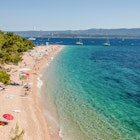
Feb 26, 2024 • 8 min read

Feb 19, 2024 • 7 min read
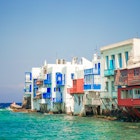
Feb 15, 2024 • 4 min read

Feb 3, 2024 • 6 min read

Feb 2, 2024 • 7 min read
Feb 1, 2024 • 7 min read

Jan 30, 2024 • 6 min read

Jan 30, 2024 • 19 min read
Weather & Climate
Athens International Airport Guide
Cities to Visit
Neighborhoods to Explore
Day Trips from Athens
48 Hours in Athens
Top Things to Do
Top Temple Sites
Best Beaches
Mount Olympus
Ancient Greek Theaters
Foods to Try
Top Restaurants in Athens
Best Bars in Athens
Best Time to Visit
The Best Time to Visit Greece
:max_bytes(150000):strip_icc():format(webp)/FerneArfin-5b6f00c446e0fb0050324e74.jpg)
Glenn van der Knijff
The best times to visit Greece are in the spring and fall. From April to the beginning of June, the heat of summer has not yet set in and the cruise ships have not arrived with their thousands of tourists. From late September through October it's usually still warm enough for the beach but much less crowded. Whenever you choose to go, you'll find a lot to see and do, wonderful Mediterranean cuisine and lively, friendly people.
Weather in Greece
Summer is hot and dry. Unshaded beaches can be unbearable and unsafe for more than short periods. July and August are the hottest months. Average temperatures are between 85 and 95 degrees Fahrenheit and can reach more than 100 F. A dry, strong seasonal wind, known as the Meltemi , blows from May to September and can bring relief from the heat. In recent years, it has also encouraged wildfires. The winter is relatively mild and seldom drops below freezing. December and January are rainy. There is little snow except in the mountains of Northern Greece and the Peloponnese.
Peak Season in Greece
From June through September, popular areas of Athens and Thessaloniki are crowded. Monastiraki Square in Athens and the adjoining market are chock-a-block, the buses and Metro are packed. Some islands have popular sunset-watching spots that become crowded at prime vantage points. Tuesdays and Wednesdays are when most cruise ships visit Santorini, and the crowds of day-trippers on the island's main road make ordinary bus and taxi travel almost impossible until after sunset.
Prices are highest from July to the end of August and during school holiday periods—when visitors compete for space and attractions with Greek families. Savvy travelers can score bargains April to May and mid-September to mid-October when vacation weather is still good.
Key Festivals and Events
The Greeks like to party and there's hardly a time of year when there isn't a festival, a celebration or an event going on somewhere. Some, however, are worth including in your trip planning.
- Greek Easter: This is a huge family holiday with events happening throughout Holy Week. Special foods are served in the restaurants and tavernas. Highlights are candlelit processions after Mass on Good Friday. In Athens, the procession goes up Lycabettus Hill and can be seen all over the city.
- Carnival: Also called Apokreas , this is the celebration before the beginning of Lent that culminates in wild celebrations, feasting, and Carnival processions in costumes (that have been known to be very rude). The Carnival in Patras is considered one of the world's top three.
- The Athens and Epidaurus Festival: This festival changed its name from the Hellenic Festival because most of its key events take place at two ancient theaters - the Odeon of Herodes Atticus on the slopes of the Acropolis, and the Ancient Theater of Epidaurus near Nafplio. It's a month-long festival of international performances, including drama, dance, and music with top artists from all over the world.
TripSavvy / Monica Farber
Tourist Attraction Availability
Most historic attractions are open year-round, though they may have limited hours or short weeks in the offseason. Some commercial attractions, beach bars, cafes and accommodations close from the end of October until the middle of March because business slows in cooler weather. On Santorini, for example, autumn and winter winds are unpleasant and most accommodations on the caldera close by mid-October.
January is one of the coldest, wettest months of the year. This is an excellent time to visit the cities of the mainland and the areas around them. You may find hotel rates at bottom-dollar prices, but those that cater to business people won't be a great deal cheaper.
Events to check out:
- Patras Carnival : Depending upon when Greek Easter falls, this could be the month for one of the world's top three Carnivals.
- Gynaikokratia Festival : If you know your classical language roots, you'll know this one is for women. Gynaikokratia means women rule. Each year on Jan. 8, in Kavala and the towns and villages of Thrace, women swap roles with men for the day.
The temperature rarely tops 59 degrees F in February. You won't find snow in most of Greece but there will be snow in the mountains and in the Greek ski areas (yes there are some). Try Mt. Parnassus Ski area or Kalavrita on Mt. Chelmos in the Peloponnese.
- Tsiknopempti: The name of this holiday, 11 days before the start of Lent, means, literally, goodbye to meat. And it's a long goodbye: restaurants, tavernas, and private family homes indulge in an orgy of meat-eating, and the smell of grilling meats is everywhere.
Days are perceptibly longer and the temperature might rise a few degrees, but don't count on it. It will be windy and miserable most of the time. But this is also the month when spectacularly diverse wildflowers begin to bloom.
- Carnivals continue until the start of Lent, so look for local events at the beginning of the month.
- Greek Independence Day: March 25 is celebrated with parades fireworks, and mock naval battles all over Greece to mark the start of the War of Independence from the Ottomans.
April weather is iffy. It can be pleasant and mild or windy and wet. The wildflowers are in full bloom, but if you are heading for the islands, you may find that ferry and hydrofoil services are still limited.
- Orthodox Easter: Holy Week is significant to the Greeks. On Good Friday, after mass, candlelight processions head out into the night from various churches.
- Rocket War : The island of Chios explodes on the Saturday night before Easter Sunday as two churches in the town of Vrontados aim fireworks directly at each other. The square between them fills with smoke, and thousands of tourists cheer.
This is the first reliably warm month with temperatures averaging in the high sixties and low seventies, rising to a high of nearly 80 degrees F once in a while. Flowers bloom, people fly kites and go out in boats, but beware: the water is probably still a little too cold for swimming in most places.
- May Day: The first of May is an optional legal holiday in Greece, but most businesses give workers the day off. May Day is also strongly connected to workers' rights, and it's a big day for slowdowns and wildcat strikes, that could impact your travel plans.
Hot weather and the start of the high season. Expect crowded resorts, higher prices, and temperatures. The average temperature is in the high 80s F and can rise much higher.
- Athens and Epidaurus Festival runs from June to August in the Ancient Theatre of Epidaurus and ancient venues all over Athens.
- Nafplion Festival : A classical music festival at the end of June or early July featuring international artists.
- Summer Nostos : is a week-long, free festival of music, dance, sports and theatre, all of it free, at the Stavros Niarchos Foundation Cultural Center in the Athens suburb of Kallithea
Temperatures average in the high 80s F and easily reach the 90s F in most places. It is also very dry so camping is forbidden in most national parks and even hiking in some area. Be aware that there's a risk of wildfires.
- Outdoor Cinema : Open-air cinema is a longstanding Athens tradition during the summer months. The city has eight, some with the Acropolis as the background, some in historic parks and settings.
- Kastoria River Party : Camping, music and cooling off in the river in northern Greece.
- Cretan Diet Festival: No, it's not a weird new way to lose weight; it's a celebration of Cretan cuisine in Rethymno, Crete.
The heatwave continues. So do the lines at the major attractions and the high, in-season prices. But on the plus side, the nights are balmy and pleasant for outdoor dining and nightlife.
Event to check out:
- XLSIOR : A giant LGBTQ, Pride, and music festival on Mykonos.
The average temperature is 75 degrees F rising into the 80s at the beginning of the month with cool nights averaging 66 degrees F. Days are sunny with almost no chance of rain.
- Reworks : Thessaloniki's massive international music festival, one of the top 10 for September worldwide, takes place over four days mid-month.
- Armata , on the island of Spetses, near Athens, celebrates a famous naval victory in the Greek War of Independence. The week-long festival ends with fireworks and the burning of an effigy of an Ottoman ship in the harbor.
Temperatures drop into the 60s with the average daily temperature of about 68 degrees F. With little chance of rain, it's still mild enough for sightseeing, hiking, and touring.
- Ochi Day : On Oct. 28, 1940, Mussolini demanded that the Axis powers be allowed to enter Greece. The ultimatum was delivered to the Greek Prime Minister at 3 a.m., and he said "Ochi" (no), bringing the country into World War II. This national holiday is celebrated with parades, concerts, and feasts.
Temperatures hover in the mid to low 60s. There are more cloudy days and a greater chance of rain.
- Thessaloniki International Film Festival : Southern Europe's biggest film festival event, held on the first 10 days of the month.
- Olive harvest: Throughout this month, ripening olives are gathered and pressed. Most farmers are too busy for olive festivals, but you may be able to witness or take part in a harvest in the smaller towns and villages.
Average temperatures are in the 50s F. It's usually cloudy and the rainy season is just beginning. The mountains of the Peloponnese, northern Greece, and Macedonian Greece have snow cover.
- Christmas : Unlike other holidays that follow the Julian calendar, the Greek Church adopted the Gregorian calendar dates for Christmas, so it falls on Dec. 25.
- Christmas in Athens gets going with the Feast of St Nicholas (the inspiration for Santa Claus, Dec. 6, and continues with festive events until Epiphany, Jan. 6. There are public displays of festive lights, fireworks, and special holiday baked treats in the shops.
With a famously busy summer season, spring and fall are the best times of year to visit Greece to avoid the hot weather and the largest crowds of tourists.
The high season in the extremely popular island Santorini lasts from June to September. May is the best month to visit because it is not too hot or cold and the peak season has not yet begun.
July and August are the hottest months with average temperatures hovering between 85 and 95 degrees Fahrenheit (29 and 35 degrees Celsius), sometimes reaching more than 100 degrees Fahrenheit (38 degrees Celsius).
Weather Spark. "Average Weather in Athens, Greece Year Round." Retrieved March 23, 2021
The Best Time to Visit the Dominican Republic
The Best Time to Visit Spain
The Best Time to Visit Dubai
The Best Time to Visit the Bahamas
The Best Time to Visit the U.S. Virgin Islands
The Best Time to Visit Naples, Italy
The Best Time to Visit Macao
The Best Time to Visit Cologne
The Best Time to Visit Boston
The Weather in Greece: Climate, Seasons, and Average Monthly Temperature
The Best Time to Visit Disney World
The Best Time to Visit Lisbon
6 Ancient Greek Theaters Where You Can See a Show
The Best Time to Visit Rio de Janeiro
September in Greece: Weather, What to Pack, and What to See
The Best Time to Visit Oman
These Are the Best Times to Visit Greece

Finally ready for that dream trip to Greece ? With a coastline longer than the United Kingdom's and thousands of islands, the country is a great place to visit any time of year. But absent a last-minute flight deal (and they do come up, though nonstop options from the US are still limited), planning ahead is the way to go in order to make the most of your time in Greece.
The urban attractions of Athens thrum at full tilt all year long, while most Greek islands are at their best once winter has left the picture. Whether it's sultry Mediterranean breezes you seek or the cheapest time to book that hotel room with a sea view in Mykonos, consider this your essential guide to planning a perfect trip to Greece.
The Best Weather in Greece
Generally, the best weather in Greece is what you'll experience in May, June and September. Plenty of sunny days that aren't too hot make May an ideal time for long, leisurely walks in Athens. By June, the beaches of the Aegean islands are warm enough for swimming and popular islands like Mykonos aren't crowded yet.
July is when things get toasty and sometimes uncomfortably humid in Athens, and the city is crowded with tourists then, too. August, naturally, means great beach weather, and if you like your big cities to yourself then it's also a fine time for Athens, as most Athenians ditch the capital.
September has lots of advantages (namely: fewer tourists), but the days are still long and warm and better yet, it's less humid than in July and August. In Crete, the southernmost Greek island, you can go swimming well into October.
The Best Times to Visit Cities in Greece
The two biggest cities in Greece are the capital, Athens , and Thessaloniki. Both are destinations in their own right and for culture vultures there is really no bad time to go. In the peak summer season, major attractions in Athens such as the Acropolis Museum are more crowded than in wintertime, when on many days you'll have even iconic places like the Acropolis largely to yourself. Winter in Athens is also a great time to check out lesser-known museums, tune up your Instagram or warm up in a luxe Turkish bath .
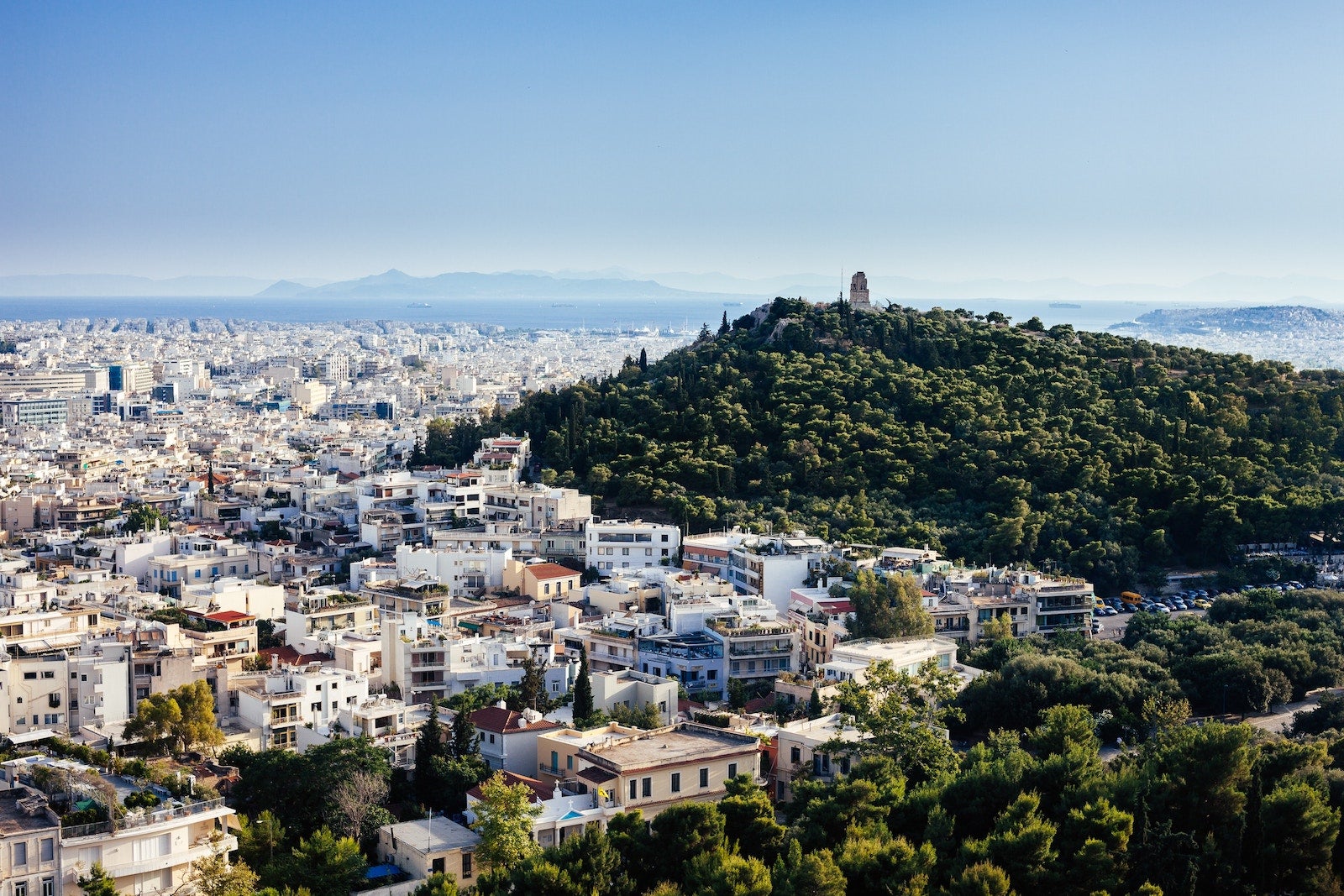
Generally speaking, think of April to June as the ideal times to explore Athens and other Greek cities including historic Nafplio. Thessaloniki is a vibrant city with a wealth of cultural attractions, but in the height of summer it gets so humid they actually have public fans in places to keep the air circulating.
Choose shoulder season months like October and May for an optimal experience there. Most island towns are empty of tourists from November until around the time of Greek Easter, but the main town in Corfu and the Cretan cities like Heraklion are up and running all year long.
When to Visit Greece for Events
From religious holidays to cultural festivals, there are plenty of events worth attending throughout the year.
Spring Events
Greek Orthodox Easter is the most important holiday in the Greek calendar by far. In 2019, Greek Easter falls on Sunday, April 28, but festivities actually begin the week prior on the Saturday of Lazarus. Easter is celebrated in different ways throughout the country, with many variations on the candlelit processions of Good Friday and Easter Sunday celebrations themselves — but you can count on plenty of lamb roasts and fireworks. Easter in Corfu is one of the most famous, but wherever you are in Greece during this time you can expect to experience at least some of the country's very rich and colorful Easter traditions.
Summer Events
Summer is when most music and arts festivals are in full swing. The Athens and Epidaurus Festival is the country's most prestigious annual summer arts festival, with events taking place at the ancient stone Odeon of Herodes Atticus theater (the Herodion) below the Acropolis as well as south of Athens at the amphitheater of Epidaurus, the best-preserved theater of the ancient world. Events include a mix of classic and contemporary (last summer, Bill Murray recited poetry in the Herodion) and are usually scheduled from late June to early August.

On the day of the August Full Moon Festival in Athens, museums and ancient sites are open in the evening free of charge until midnight.
Assumption is Aug. 15. It's a public holiday in Greece and considered the "Summer Easter." On this day, life in Athens pretty much grinds to a halt as Athenians dash off to the countryside or the islands. If you want to make sure you have a good place to stay anywhere outside of Athens on Aug. 15 or in the two weeks following, it's increasingly essential that you plan and reserve ahead of time.
Fall Events
The prestigious Thessaloniki International Film Festival is usually held during the first part of November. And while they're not exactly going to enrich anybody in cultural terms, Black Friday shopping events in November have recently taken Greeks by storm.
Winter Events
Christmas in Greece is nowhere near as big a deal as Greek Easter, but there are festive lights in the center of big cities like Athens. Also in Athens, New Year's Eve means festive fireworks over the Acropolis.

The Best Times to Explore the Greek Islands
The best times to visit mykonos and santorini.
What ultimately draws visitors to Santorini is the views over the volcanic caldera and not the beaches, and that appeal has fueled the island's rise as a year-round destination. May and June are the best times to dodge the crowds but also enjoy some sun. Otherwise, it's probably better to wait until after mid-September.
Mykonos is a bit trickier: in May and June (and again in September) you'll have more elbow room at the island's many beaches and posh beach bars, but to get a taste of the international razzle dazzle for which the place is most famous, July and August do rock to that inimitable Mediterranean island vibe. But it's also a very expensive vibe. Unlike in Santorini, by the end of September it's already very quiet again in Mykonos.

The Best Times to Visit Other Islands
Whether it's Corfu in the Ionian Islands, Rhodes and Patmos in the Dodecanese archipelago, Paros and the other islands that make up the Cyclades or Crete, the best time of year for an island visit is generally going to be in June, July or September. Prices are lower and hotel rooms are more readily available in June and September, and you can count on warm weather in those months, too.
Loads of Greeks and other Europeans on summer holiday can make island travel in August a real challenge — and sometimes a downright headache. And many islands have their off-season charms: For example, the Saronic Islands near Athens like Hydra and Aegina are easy and fun to visit any time of year (but beach time is mainly May through September).
When to Visit Greece to Avoid Crowds
The tourism season in Greece typically gets going after Greek Easter, with shoulder season ramping up in May and the peak season stretching from the latter part of June into July and all of August. Increasingly, in places like Athens and Crete, September is now considered a high season month.
If you want to avoid crowds in Athens, time your summer travel for June or August instead of July. In the Cycladic archipelago (which includes Mykonos and Santorini), avoid July and August unless you don't mind crowded ferries and higher prices.
In Crete, you can expect crowds at many beaches and in the cities of Heraklion and Chania from June right up until October, so consider June or early fall for Crete. By contrast, in Corfu where the beach season is not quite as long as in Crete, you'll have an easier time avoiding crowds in September.
Winter in Athens tends to be cold and damp, but there are still many sunny days and exploring museums and ancient ruins in the absence of crowds and big tour groups can be quite cool.
The Cheapest Times to Visit Greece
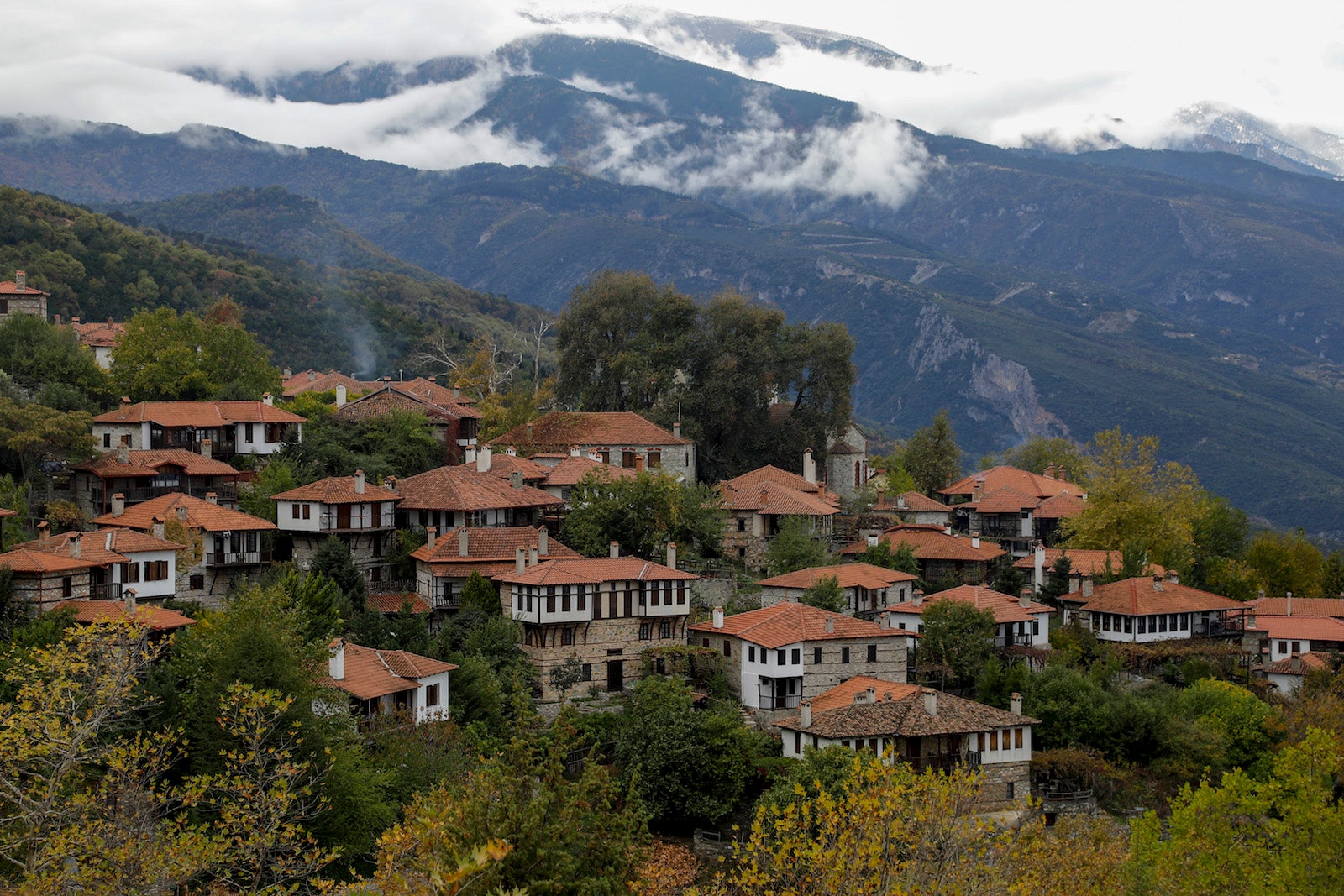
Traveling to Greece is usually priciest during peak season, so if you're looking to save, wait until the off-peak or shoulder seasons. The best hotel deals in Athens are going to be from early January through March, but weather is not at its best at that time. You can generally find good hotel deals in April, May, the first part of June and sometimes in September (but less so in Crete).
The shoulder seasons in Greece run from April through the first part of June, and then from about mid-September through mid-October.
Affordable Airfare
Unsurprisingly, airfare is at its most expensive during the summer. July, specifically, is the priciest month when, according to the farecasting app Hopper, long-haul flight prices are around $1,090 round-trip. In May, that dips to $930 round-trip. But during the shoulder seasons and in winter, prices plunge accordingly.
Currently, all American airlines offer only seasonal nonstop flights to Athens and they tend to be expensive, but there's often a workaround. Find a cheap ticket to either London Heathrow (LHR) or London Gatwick (LGW) and then find a flight that fits your schedule with Greek carrier Aegean : a Star Alliance member with several flights a day from London to Athens International Airport (ATH). Plus, you'll typically get better service than you would from the British low-cost carriers, plus meals are included.
Affordable Hotels
The most expensive time to book a hotel room in Athens is generally in the summer. The cheapest times are January (after the New Year holiday) and February. The most expensive time to book rooms in popular islands like Mykonos and Santorini is July and especially August.
According to Booking.com , based on bookings made between January 2018 and December 2018, hotels in Athens are 33% more affordable in February than compared to the most expensive month of the year, which (for Booking.com ) is June. Hotels in Santorini in January are 51% more affordable than they are in August, and for Mykonos, March is 73% more affordable than August.
If you're planning to visit Mykonos in the summer, you should plan ahead as much as possible and if you find a deal (paid or points), grab it. Expect hotels on many Greek islands — not just Mykonos and Santorini but also ones like Syros and Sifnos — to be completely sold out over the Aug. 15 Assumption holiday and do not assume you'll be able to find a deal, or anything really, on the spot during that extremely busy time.
In Crete's largest city of Heraklion as well as elsewhere on the island, the high season now effectively runs through the whole month of September, making it wise to book ahead in Crete even for early fall travel.
Greece in the Summer: The Ultimate Guide from Locals

Key Takeaways
- Greece experiences hot and sunny weather during the summer months, which becomes scorching hot during midday.
- Summer is the peak tourist season in Greece , so popular destinations can get crowded with both international and local tourists.
- Greece comes alive with festivals and events during the summer . The Athens & Epidaurus Festival is a renowned cultural event featuring theater, music, and dance performances.
- Greece's coastline is famous for its beautiful beaches . Whether you're seeking sandy stretches or hidden coves, there are options for every preference.
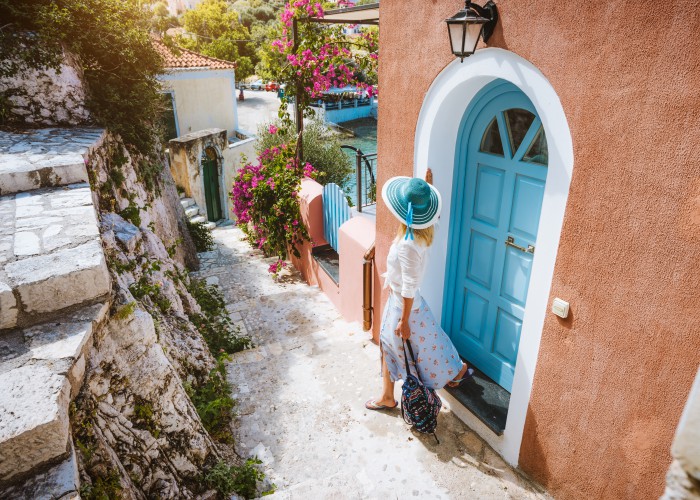
One of the most common questions among travelers is, ‘When is the best time to visit Greece ?’ Although Greece has its charms year-round (yes, there are plenty of reasons to visit Greece even in the winter), and locals have reasons for preferring one month or two over the others, almost everyone agrees that the summer months are when Greece truly shines and is on every traveler's bucket list.
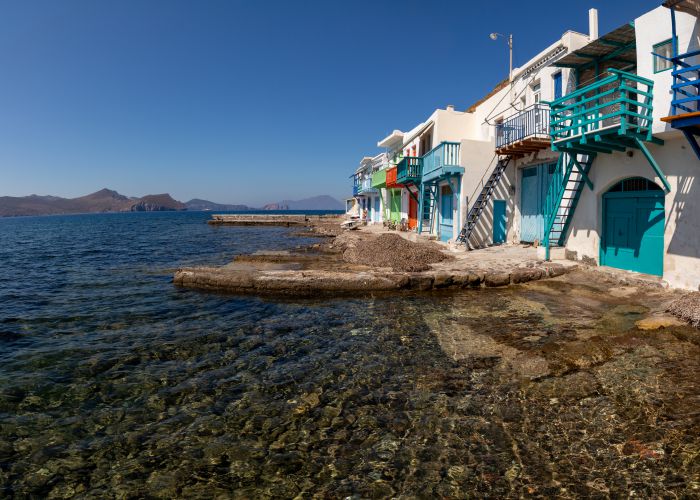
Since the summer is the most popular time to visit Greece , we have some valuable tips and advice from locals to ensure you have the best experience.
Their advice can help you get the most from the Greek summer endeavor so you return home with amazing memories, ready to book your next trip to this enchanting country.
Choosing the Best Time to Visit Greece
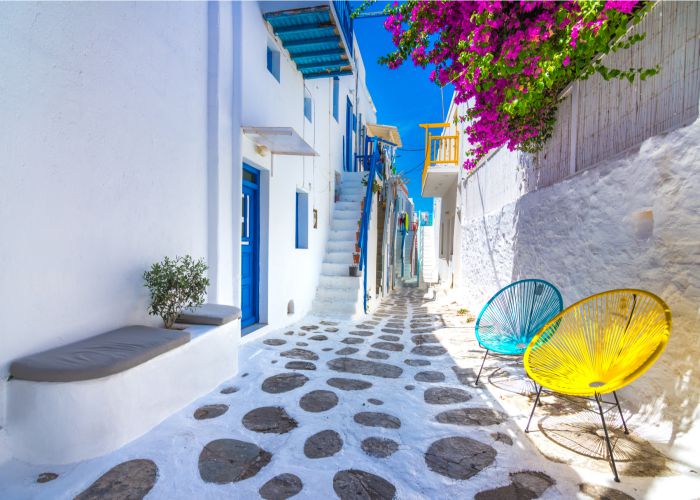
According to the calendar, summer is from late June to late September, but locals will tell you that summer in Greece starts much earlier. Greece has a very short spring season; the tourist season usually begins right after Easter, while the weather in Greece in June is perfect for summer vacations, even during the early days.
From then on, you can swim on the golden beaches of the Ionian and Aegean sea, sink your toes in the golden sand, and admire Santorini's famous sunset from a sailboat.
Visitors flock to Greece from May to September, but the best months to plan your trip are May, June, and September.
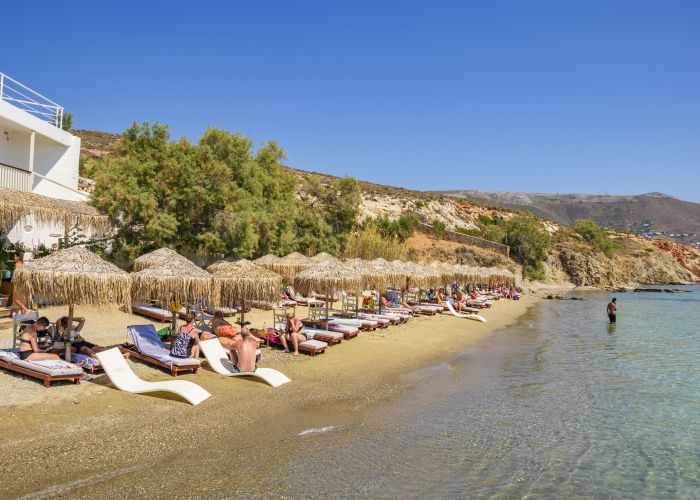
Visiting Greece at the beginning or end of summer offers several key advantages:
- Smaller crowds, especially in the most popular destinations and tourist sites. Fewer crowds mean a more comfortable, laid-back, and authentic experience!
- Less expensive flights and accommodations.
- Cooler, more pleasant weather to explore the best beaches in Greece , ancient Greek ruins , and tasty food.
- Easier to purchase tickets on ferries, make reservations at popular restaurants and visit major archaeological sites and museums, some of the best landmarks in Greece .
This isn't to say you can't have an incredible visit to Greece during July and August.
Just know that if you do travel to the Mediterranean in the mid-summer months, you'll contend with hot weather and larger crowds; something that the sea breeze, the fresh fish, and the turquoise waters will make it worth it nonetheless.
You can read about the weather in Greece in July and the rest of the summer months on our blog, and decide for yourselves.
The Best Places to Visit in Greece in the Summer
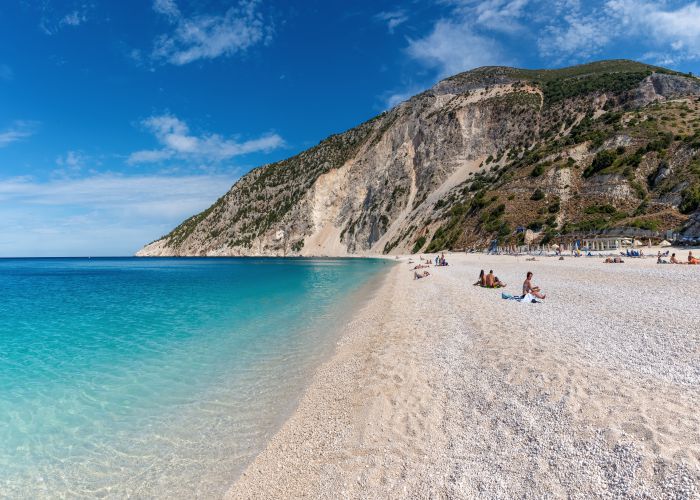
There isn't a bad place to visit during summer in Greece, and many travelers plan multi-destination trips to experience the country's best, from big cities to Greece's fishing villages or southernmost islands.
Depending on how you vacation, there's a Greek destination sure to delight, inspire you, and offer you unforgettable memories. Consider one of these five popular options.

Athens is an ideal place to visit during the height of the summer. Many locals take their vacations in August, and the high temperatures drive many tourists to the cooler coastal regions. This means the city is less busy and crowded than usual, so you won't face as many long lines to see the major attractions.
Many of Athens' museums are air-conditioned, so you can comfortably experience Greek art, history, and culture even when the outdoor temperatures soar. You can also explore Monastiraki's covered open-air markets and the quirky cafes and tavernas without the enormous crowds.
2. The Greek Islands
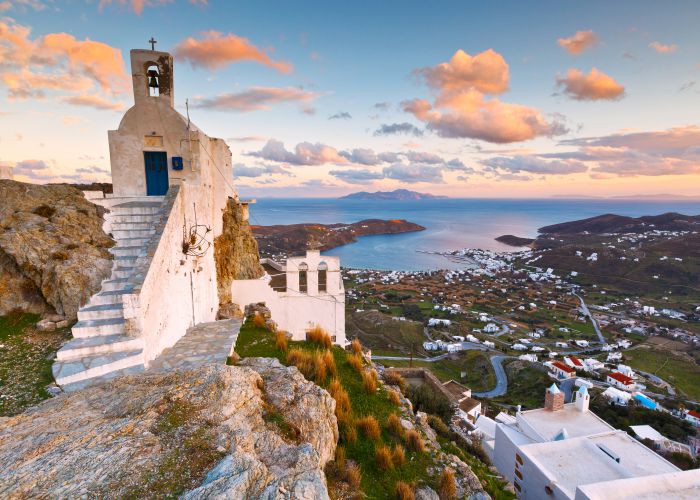
With their beautiful beaches, clear blue water, and stunning sunsets, it's no wonder that locals and visitors alike head to the Greek Islands in the summer months. Coastal breezes keep you cool while you soak up the sun, but prepare to enjoy them with thousands of other visitors. Some Greek islands, notably the Cyclades islands like Mykonos and Santorini , are incredibly popular and crowded in the summer.
That doesn't mean you can't enjoy a summer vacation to the Greek islands. Consider some of the less visited but still stunning destinations in the Dodecanese islands, home to the ancient city of Rhodes, or the lush Ionian islands .
3. Halkidiki
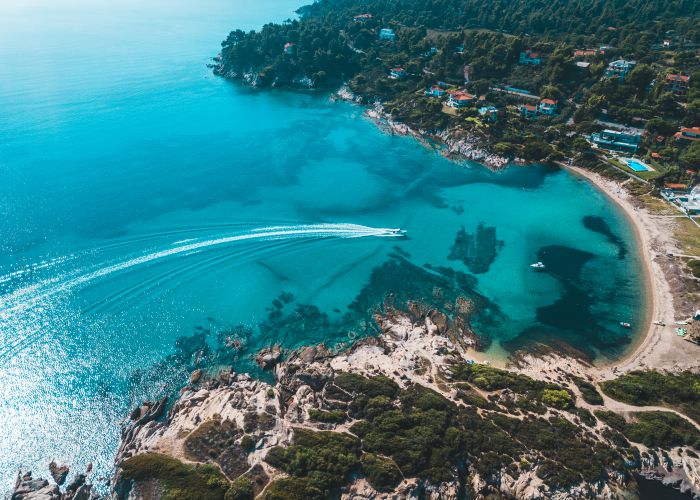
A favorite among Greeks, the Halkidiki region comprises three peninsulas packed with luxurious beach resorts, quaint historic villages, and ancient archaeological sites. Foodies, in particular, will enjoy a visit to the city of Thessaloniki, Greece's ‘second city.’ Considered Greece's food capital, Thessaloniki is the place to find highly-rated restaurants.
4. The Peloponnese
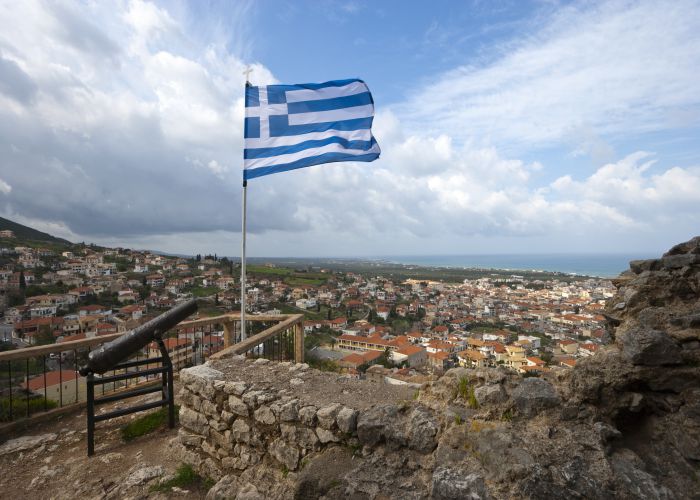
Scenic, rugged, and historical, the Peloponnese region is ideal for travelers who want to take a Greek road trip to explore ancient cities and quaint villages. The Peloponnese is also home to the area of Lakonia and its capital city, Sparta, as well as several settlements dating back to the Byzantine Empire.
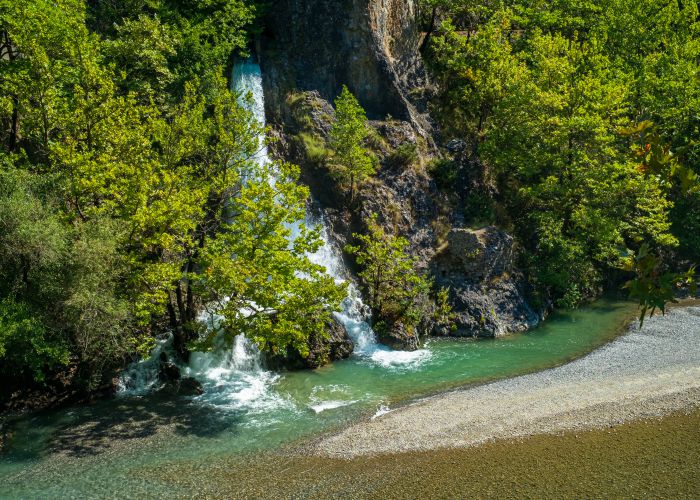
The western coastline of the Epirus region is another popular destination for domestic visitors; in fact, very few international tourists are familiar with this region affectionately known as the ‘Epirus Riviera.’
The seaside town of Pargas is especially beautiful, with a Venetian castle overlooking beautiful beaches and crystal-clear water. Epirus is also where you'll find Syvota, a fjord with sandy beaches, blue water, and lush forests that appear transported straight from the Caribbean.
Festivals in the Summer Months
One of the best ways to experience Greek culture is to attend one of the festivals that fill the calendar during summer in Greece. Include one of these events in your itinerary for a memorable experience.
Athens Epidaurus Festival
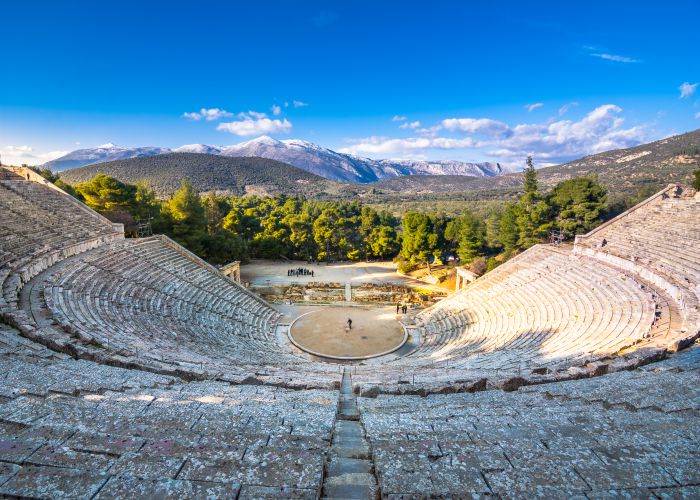
One of the oldest European arts festivals, this theatre, music, and dance celebration takes place between May and October in the ancient Epidaurus amphitheater in Athens. Known for its exceptional acoustics, the amphitheater alone is well worth a visit, but seeing a performance is a treat for visitors and locals alike.
Greek Folk Festivals
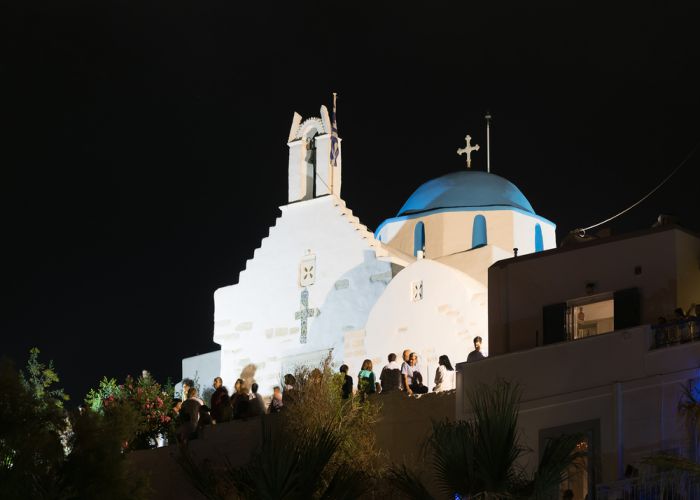
Throughout the year, the Greek people honor the patron saints and religious events of their regions with panigiria or festivals. Make plans to attend one of these fairs, which include delicious food, dancing, music, shopping, and unique rituals. A panigiria is the ideal way to enjoy authentic Greek culture while having a great time.
The Ascension of the Virgin Mary
August 15 is one of the most important days on the Greek Orthodox calendar , as it's the day the Virgin Mary ascended to heaven.
You're likely to find a fair or festival honoring this day in nearly every city and town. The most famous takes place on the island of Ikaria, where the dancing lasts all night.
Get the Most from Your Greek Summer Vacation
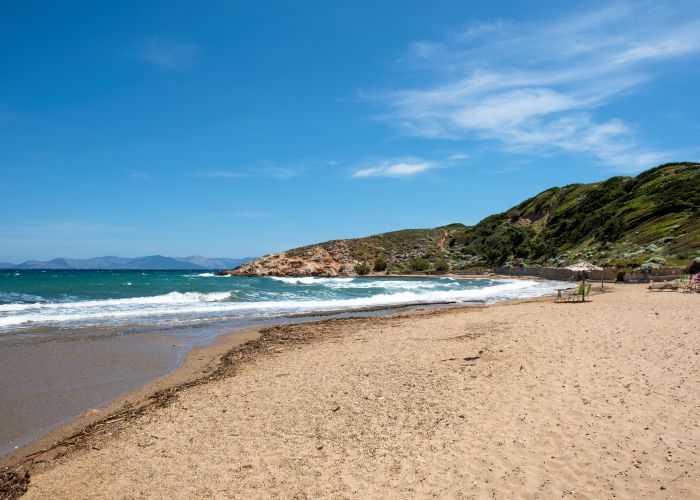
The sunshine, blue skies, and beautiful beaches of Greece enchant visitors, but they can also ruin your trip if you don't take precautions. The average temperature hovers above 80 degrees in most areas, and most days are sunny and bright.
You don't want to deal with heatstroke, sunburn, dehydration, or other health issues that keep you cooped up in your hotel room, so take the following precautions to ensure you fully enjoy your summer in Greece:
- Stay hydrated: Drink plenty of water throughout the day.
- Wear sun protection: In addition to using sunblock, wear sunglasses and a wide-brim hat when you go outdoors.
- Avoid the midday sun: The sun is strongest in the late morning and early afternoon, so plan outdoor activities like hiking or exploring archaeological sites for early morning or late afternoon.
- Wear light-colored clothing: Loose-fitting, lightweight clothing in light colors is most comfortable during a Greek summer and will prevent overheating.
- Take breaks: With so much to do and see in Greece, it's easy to overexert yourself. Take your time to soak in the atmosphere and take frequent breaks. Enjoy a cool drink in a shaded cafe, and let the beauty and culture of Greece surround you.
- Avoiding heat-related illness is just one part of making the most of your Greek summer trip. High-season crowds mean pre-planning is a must, especially when your itinerary includes popular destinations like Mykonos. Avoid disappointment and frustration during your visit to Greece with the following tips.
- Book your ferry trips and accommodations in advance. In many coastal areas, ferry tickets sell out, and hotels and inns fill up well in advance, so you might not have a place to stay if you don't make reservations. Pre-booking tours and excursions can eliminate the stress of arranging activities and ensure you can see and do everything you want during your vacation.
- Try different beaches. Greece is full of beautiful beaches, and each has its own vibe. While the beautiful beaches of Mykonos and Santorini attract visitors who want to soak up the sun, the windblown beaches of Rhodes are ideal for watersports like windsurfing. Explore different coastal areas to experience the diversity of Greek beaches.
- Pace yourself. You could spend years in Greece and not experience everything it offers, so you should not expect to do everything in a week. Plan to explore two or three destinations at most to get the most from the summer weather experience. If you're having trouble deciding where to visit this summer in Greece, consider a package tour that includes several destinations and guided excursions to take the stress out of planning.
- Experience the Greek lifestyle. Summer in Greece isn't about rushing from one destination to the next. Take time to soak up the atmosphere and relax with delicious Greek food , take a walking tour of local art, or experience a dance or cooking class to immerse yourself in Greek culture. Remember: you are on vacation, so take it easy and slow down.
Final Thoughts

Visiting the Mediterranean is impressive at any time of year, but Greece in the summer is especially magical.
If you need help planning your next vacation, get in touch with the expert travel planners at Greeking.me for insider advice and a selection of travel packages and tours to ensure you have the most stress-free vacation possible.
There is not much to think about; a perfect summer in Greece is next on your 'to-do' list!
Frequently Asked Questions
Is greece too hot in summer.
It is no secret that Greece in the summer boasts very hot weather and temperatures that go as high as 40 Celsius, or 104 Fahrenheit, at midday on particularly hot days.
The Greek islands and the mountainous regions of Greece are a bit cooler during the summer. Still, they are hotter than what most travelers are used to, so a hat, a bottle of water, and sunscreen should always be at hand.
Is July a good time to visit Greece?
While July is in the middle of the peak season and one of the hottest months of the year in Greece, it is an excellent time to visit the country if the scalding weather and large tourist crowds don't bother you
What's more, the month of July is perfect for exploring the impressive island network Greece boasts, as the Greek island, especially the smaller ones, are outstanding summer destinations that are not ideal in winter.
What is Greece like in the summer?
As already mentioned, summers in Greece are scorching hot. Specifically, in the summer, the temperature can reach a high of 35-40C daily.
Of course, at night, the temperature is much lower, and if you're on the Greek islands, it is possible that you'll need a light sweater.
Sea temperatures range from 22 – 25 C, or 74 to 98 Fahrenheit, while the Aegean Sea is warmer than the Ionian Sea.
Is Greece better in July or August?
Usually during summer, the weather in Athens gets tepid and sometimes uncomfortably humid, and the area is also filled with tourists. August signifies great beach time and is ideally the best time for Athens as all Athenians abandon the capital.
For the Greek islands, August is one of the busiest months until the middle of it, when most tourist start to leave, and it gets much more tranquil and nice.
Overall, both months are great, depending on what you're looking for. If you're looking for a cosmopolitan experience on the islands, July is for you.
If you're looking for a more relaxed and authentic experience, you can enjoy Athens throughout August and the Greek islands at the end of the month.

The Best Time to Visit Greece and the Greek Islands
Not sure what is the best time to visit Greece ? I used to live in Greece and visit frequently so I’ve put together a month by month guide to help you figure out the best time to go to Greece depending on your interests and weather preferences.
I have broken down the best time of the year to visit Greece by season and even further by month.
Finally, I have a summary of the best time to visit depending on your interests and my overall top pick for most people.

What is the Best Season to Visit Greece
Not sure what season to go to Greece ? Here are some pros and cons about visiting Greece and the Greek islands in each of the four seasons. Once you have a general idea of what season you would like to visit, make sure to check out my month by month guide for more detailed information. Even in the same season, your experience in Greece will vary depending on the month you visit.
Visiting Greece in the Spring
Spring is generally a great time to explore Greece as temperatures start to warm up making it very pleasant to walk around and sightsee. Tourism starts to increase every month especially around Easter week when locals head to the Greek islands. In May, weather is warm enough to sunbathe but the sea might still feel too cool to swim.
Easter is a big holiday in Greece. The date changes every year – this year Orthodox Easter is May 5, 2024 which is fairly late in spring.
Visiting Greece in the Summer

Summer is the busiest and the most popular time to visit Greece. The summer months bring the iconic Greek summer experience, attracting sun-seekers from around the world. The Greek Islands become bustling with life, offering a perfect setting for beach lovers and party enthusiasts.
June offers warm to hot temperatures making it a great time to visit for those that want to enjoy beach time as well as sightsee. July and August are the hottest summer months (temperatures can reach ) so they are not the ideal months for hiking or sightseeing.
Keep in mind that popular destinations (such as Athens, Santorini and Mykonos) are very crowded during the summer, so book hotels and flights in advance.
If you would like to visit the Greek islands in the summer but avoid crowds, choose less well known Greek islands.
Visiting Greece in Autumn
Autumn is an excellent time to explore both the mainland and islands without the intense summer crowds.
Early Autumn is usually the best time to visit in terms of good weather – the weather is usually more pleasant (still relatively warm and less likely to rain).
During early autumn (September and early October), you can still enjoy the Greek summer experience (go to the beach and swim in the sea) with fewer crowds.
Late autumn (late October and November) is a bit more unpredictable-temperatures will start to cool and rainy season begins. The weather might still be warm outside but it might be too cold to go swimming. If you want to visit the Greek islands in late autumn, head to warmer southern Greek islands (including Crete and Rhodes).
Athens and the mainland will be pleasant for walking around, hiking and sightseeing.
Visiting Greece in the Winter (November to February)
While winter may not be the most popular time to visit Greece, it is not a bad time to visit Greece especially if you just want to sightsee. November offers a quieter experience, and you can still enjoy mild temperatures. December brings festive vibes, with Christmas markets and celebrations throughout the country.
The winter months are perfect for exploring historical sites without the crowds, although some islands and coastal areas may experience cooler and rainy weather.
While it can get cold and snowy in the mountains and northern Greece, the temperatures in most of Greece (including Athens) are usually not very cold so it is a good time to sightsee.
Winter is not the best time to visit the Greek islands and it is usually too cold for sunbathing and swimming. If you can only visit the Greek islands in the winter, choose warmer Greek islands in the South like Crete and Rhodes.
Winter is rainy season in Greece, so pack a travel umbrella .
Pros: Winter is low season in Greece so winter offers the fewest crowds and lowest prices.
Cons: Winter is too cold for swimming. It is more likely to rain that the rest of the year. Snow in Athens in rare but can happen. Many restaurants, hotels and shops in the Greek islands are closed for the season. Some attractions might have reduced hours.
What is the Best Month to Visit Greece
Hopefully you now have a general idea of the season you want to visit Greece. If you want to narrow it down further, here is a month by month guide.
Visiting Greece in January
January is the middle of winter and one the coldest and rainiest months in winter.
There are fewer tourists and lower prices on accommodations.
Visiting Greece in February
February is one of coldest months in Greece. There are not a lot off tourists and you can expect lower prices.
Since most of Greece has mild weather in the winter, it is not a bad time to explore historical attractions.
Visiting Greece in March
March is a transitional month. Spring blooms begin and temperatures are more moderate than January and February. It is still more likely to rain in March than later in the spring. It is a good month for walking around and exploring ancient ruins and historical sites
Visiting Greece in April
April is particularly delightful, with comfortable temperatures and fewer crowds, making it an ideal time to explore historic sites.
April is considered shoulder season. Tourism starts to increase but there are still lower tourist numbers compared to summer.
The weather starts to get warmer making it a good month for those that enjoy hiking and other outdoor activities. A Most places are still too cold for swimming, but some
April is is good time to visit Santorini and Mykonos before it gets crowded but it will still be too cold for swimming for most people. If you are hoping to spend time at the beach, head to southern islands south such as Crete and Rhodes which are typically a bit warmer.
Visiting Greece in May
May tends to be one of the best months for good weather as temparatures are warm. It is a great time to visit Greece before schools go on summer break and the busy summer season starts.
May is a good month for island hopping and beach activities but some people might find the water a bit cold for swimming especially in the first half of the month.
Around mid to late May, tourism start to increase substantially as schools let out for summer.
Visiting Greece in June

June is the start of summer with rising temperatures. It can start to feel very hot especially later in the month.
This is a good time to visit the Greek islands. There is bustling nightlife on the islands and some crowds but less busy than later in the summer.
June is definitely hot enough to visit the beach although some people might still find the water a bit cold for swimming in early June. By late June, the sea has warmed up making it an ideal time for beachgoers and water sports enthusiasts.
Visiting Greece in July
July is usually the hottest month in Greece and many places (including Athens) might feel too hot for sightseeing.
Greece is very crowded with tourists at this time as all students are on summer break. Advance bookings are recommended for popular destinations.
The Cyclades (including Mykonos and Santorini) will be hot but the breeze makes it feel less hot than Athens and the mainland. If you want to visit the Greek islands in July but want to avoid crowds, head to less popular islands.
Visiting Greece in August
August is the peak of summer tourism with crowded beaches and nightclubs. It is perfect for those seeking a lively atmosphere.
August is one of the two hottest months in Greece in terms of temperature. This is a great time for swimming as the sea will be the warmest.-
Many Europeans take their vacation in August, so Greece is very crowded especially the first half of the month. August 15 is a big national holiday in Greece.
Visiting Greece in September
As the summer rush subsides, September sees a gradual decrease in temperature and tourist numbers. The weather remains warm, and the sea is still inviting for a swim. This is an excellent time to explore both the mainland and islands without the large summer crowds.
I consider September to be the BEST time to visit Greece for warm weather with fewer crowds. The temperature in early September is still hot and the water is warm enough to swim. Late September is usually still warm, but it starts to get a bit cooler especially at night.
Visiting Greece in October
October is the start of shoulder season. Attractions become less crowded and you can find lower accommodation prices.
October brings cooler but still pleasant temperatures. It is still a good time to visit, especially if you enjoy hiking and outdoor activities.
Early October is typically warm enough for swimming. Temperatures start to cool mid to late October with autumn temperatures but you might still be able to go swimming in some parts of Greece such as Crete. Rainy season starts around mid to late October so it is more likely to rain than earlier in the month.
Visiting Greece in November
If you enjoy moderate temperatures, November is a great time to visit in Greece. Weather can be a bit unpredictable, and it does occasionally rain in November. Attractions are much less crowded, so this is a good time to visit Greece if you want to sightsee with fewer crowds.
Visiting Greece in December
December usually has mild winter temperatures so this is a good time to visit Greece if you want to sightsee with few crowds. Attractions are not crowded at this time. Flights will probably not be that cheap, as many Greeks that live abroad will be traveling back to visit family for the holidays. You can enjoy festive Christmas markets and celebrations at this time, but Christmas is not as much of a big deal as it is in western Europe and the US.
Worst Time to Visit Greece
If I had to pick the worst time to visit Greece, it would be August when it is the most crowded and also very hot. Many Europeans (including Greeks) take their annual vacation in August, so beach destinations will be very busy. Athens will not be as crowded as early in the summer (as many Athenians will be on beach vacations) but there are still many foreign tourists in the city.
Should you visit Greece if you can only go in August? Yes! I used to visit Greece every August when I was still a student and still enjoyed it.
If you want to visit the popular islands in August, book early and expect high prices.
If you want to avoid crowds in the Greek islands, skip the most popular islands like Mykonos and Santorini and head to less well known islands. The end of the August will be less crowded as the first half as some students are already back in school.
What is the Best Time of the Year to Visit Greece For…
Good Weather – The months with the most comfortable weather in Greece are typically May through June and September and October. During this time the weather is warm but usually not as painfully hot as the peak summer (July and August).
In April and November, temperatures are still very pleasant enough to sightsee comfortably but might not be warm enough for a beach vacation.
March and December are cooler but still mild but it is more likely to rain than summer season.
The months that typically have the worst weather (colder, rainier and occasional snow) are January and February.
Swimming – The water in the sea is warmest and pleasant for swimming from mid-June through mid-September. May and October are usually warm enough to swim but some people might find the water too cold. Most people will find late autumn, winter and early spring, too cold for sunbathing and swimming.
Keep in mind that the sea warms up as the weather gets hotter but there is a lag of a few weeks. In late spring and early summer the weather can be hot outside, but the sea a bit cool for swimming. In autumn, it can start to feel cooler outside, but the water can still be warm for swimming. You can find current and historical sea temperature data here .
Most locals and tourists start heading to the beach sometime in May and June but for some people the water in Greece gets comfortably warm for swimming around late June. When I lived in Greece (in the Peloponnese), I would usually start swimming the second week of May.
Avoiding Crowds – The busiest time in terms of tourism is the summer (and Easter week). If you want to avoid fellow tourists at popular tourist attractions, visit in the low season (January through March). Shoulder season (April through mid-May and mid-September through October) is a good balance of fewer crowds but pleasant and warm weather .
Party Animals – If partying in the Greek islands is the reason for your trip, then you will want to visit in the summer. Lots of bars and clubs in the Greek islands (such as Ios) do not open until around Easter and close down around September.
Low Prices – You are most likely to find the biggest hotel and flight bargains in January and February because there are fewer tourists visiting Greece at this time. There will be slightly more visitors in March and November, but prices are still low at this time.
Best Time to Visit Greece – My Overall Recommendation
Most people would enjoy visiting Greece (including the Greek islands) in early autumn (September and early October) . In early fall, the weather is still warm and you can enjoy beach time and outdoor activities with fewer crowds because kids and students are back in school. If you enjoy hot weather, September is the best month to visit. If you prefer more mild and pleasant temperatures, October is a great month to visit and might still be warm enough to swim in the ocean. The reason I chose autumn over spring is that even if the outside temperature is the same, the ocean in autumn will be warmer for swimming versus in the spring when the water temperatures are still cold.
My second choice of the best time to visit Greece depends on your interests. If you are visiting Greece for a beach vacation or nightlife, my second choice for the best time to visit Greece is June (as there are fewer crowds than July and August). If you are visiting Greece for sightseeing, my second choice for the best time to visit Greece is late spring (especially April and May) for warm and pleasant temperatures and pretty spring flowers.
If you enjoy hot weather, beach time and a party atmosphere, then summer is a good time to visit but it will be crowded and more expensive. If you want to visit Greece on a budget and want to avoid crowds, then consider visiting in the winter but it might be rainy and somewhat cold.
Ultimately when to visit Greece depends on you so hopefully this guide has helped you make a decision on the best time to visit Greece . If you are still not sure, feel free to ask me any questions in the comments below.
Related Posts

savvyglobetrotter
Leave a reply cancel reply.
Your email address will not be published. Required fields are marked *

Currently you have JavaScript disabled. In order to post comments, please make sure JavaScript and Cookies are enabled, and reload the page. Click here for instructions on how to enable JavaScript in your browser.
This site uses Akismet to reduce spam. Learn how your comment data is processed .
Change location
- UK / International
- Call toll-free tomorrow from 9am EDT 617-223-4521 617-223-4777 or
- REQUEST A QUOTE
When is the best time to visit Greece?
- Month-by-month
The best time to visit Greece is outside the busy summer peaks, during spring (April to June) and early fall (September and October). Temperatures are warm but not stifling, and you’ll find that destinations are open but still relatively quiet.
The period from November to February tends to be colder, but city attractions remain open and are pleasantly quiet. Summer brings steamy, hot weather and hordes of visitors at the main sights and on the islands.
- Make an inquiry
- Request a brochure
Month-by-month guide for traveling in Greece
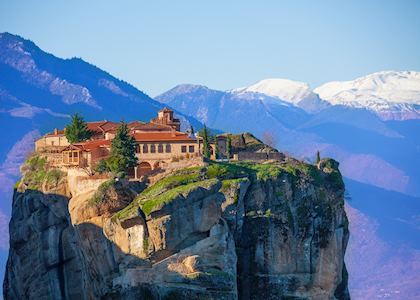
Visiting Greece in January - February
The year in Greece begins with cool temperatures and damp weather in some areas. Meteora and the Delphi area can even see snow. For the most part, seasonal destinations such as the Greek islands are closed down for the winter. But, cities like Athens remain open for business, and major sights are pleasantly uncrowded.
Events & Festivals
- Epiphany on January 6 is celebrated by local priests blessing major bodies of water, and a chill-inducing tradition in which adventurous Greeks leap in to retrieve a cross thrown in by the priest in the hope of good fortune for the coming year.
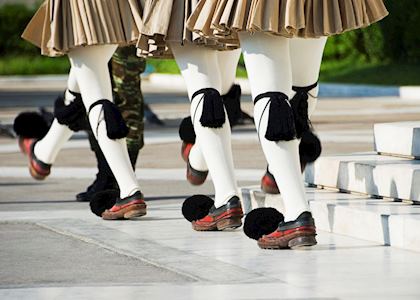
Visiting Greece in March
March marks the beginning of spring across the country. Although it’s still low season in most places, and many island destinations are yet to open, attractions across the mainland are open and much quieter than they will be in a few weeks’ time.
- Greek Independence Day is celebrated on March 25 throughout the country with military parades and traditional folk dress and music.
- March usually falls almost entirely within Lent and, starting with Clean Monday at the end of February or beginning of March, Orthodox Greeks traditionally observe this time by abstaining from meat, fish, dairy and eggs.

Visiting Greece in April
Most years, the highlight of April is Greek Orthodox Easter, which occurs near the end of the month or in the first few days of May. The weather at this time is excellent for sightseeing or hiking, with plenty of sun and mild temperatures averaging around 68°F.
- The celebrations of Holy Week and Easter, culminating on Easter Sunday, are usually the highlight of the month and mark the most important holiday of the year.

Visiting Greece in May
One of the best times to visit Greece, May is a good month to travel if you’re looking to experience both the cities and the islands. While sea temperatures can still be chilly, the weather is usually warm enough for swimming, and it’s not too hot for touring the cities. May marks the month when all the island destinations open fully for the summer season.
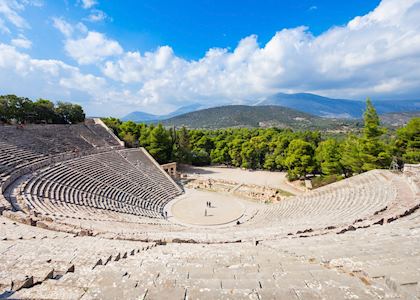
Visiting Greece in June
June sees temperatures rising and crowds increasing but, overall, it’s a very pleasant time to be in Greece. Everywhere is open, the sun is warm, and plenty of festivals are taking place across the country.
- Beginning in June and lasting throughout the summer, the Athens and Epidavros Festival showcases performances, including Greek plays, in ancient and modern venues across both cities, including the Theatre of Epidavros.
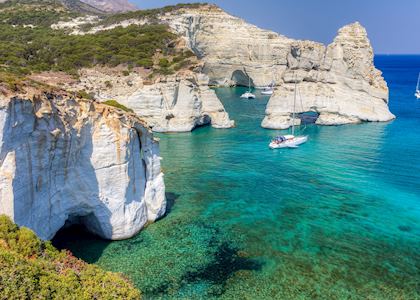
Visiting Greece in July - August
The heat of summer in July and August brings temperatures that can run north of 100°F and plenty of sunshine with very little rain. At this time of year, the cities can feel oppressive under the unrelenting sun and sights get extremely crowded, but it’s a good time for water activities, if you don’t mind the coastal towns and islands being busier.
- The Feast of the Assumption on August 15 is a national public holiday, when people return to their hometown to enjoy the festivities.
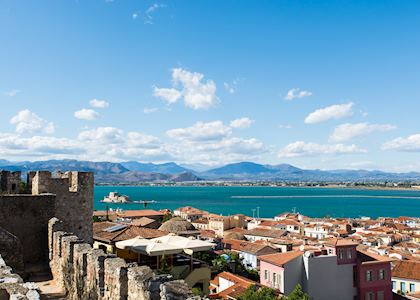
Visiting Greece in September
September is a great time to visit Greece. The weather remains hot throughout the month, sea temperatures stay warm, and visitors start to thin out as children go back to school. While the main sights are still busy, September is usually better for touring compared with hotter and more crowded July and August.

Visiting Greece in October
Visiting in October represents a good-value time to go, when you can enjoy cooler weather and fewer crowds. The islands start to wind down ahead of winter, but usually stay open until the end of the month. In central and northern areas, leaves turn to their autumnal hues.
- Ochi (or Ohi) Day on October 28 commemorates the date in 1940 when the Greek Prime Minister Ioannis Metaxas said ohi (no) to Mussolini’s demand for the Axis forces to occupy parts of Greece.
Visiting Greece in November - December
The final two months of the year bring cooler temperatures to Greece. Island destinations close down for the winter, while historical sites across the mainland remain quietly open.
- Christmas, while not as important as Easter, is celebrated on December 25 as a joyful holiday shared with family.
Greece Climate Guide
Why travel with audley.
- 100% tailor-made tours
- Fully protected travel
- Established for over 25 years
- 98% of our clients would recommend us

Travel advice
Practical tips for traveling to Greece, from social protocols to guidance on money matters, with a link to the latest US State Department travel advice.

Request our brochure
Covering all seven continents, The World Your Way shows you how you can see the world with us. It features trip ideas from our specialists alongside hand-picked stays and experiences, and introduces our approach to creating meaningful travel experiences.
Trip ideas and travel guides for exploring Greece

Athens & the Peloponnese
9 days from $5,930pp
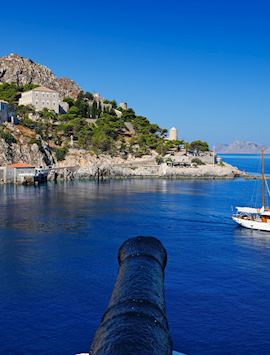
Athens & the Greek Islands tour
12 days from $9,895pp
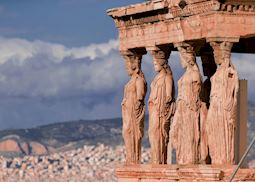
Exploring classical Greece: Five essential destinations

Santorini to Nafplio: The best Greek islands, beaches, and coastal towns
- Best time to visit Greece
Book your individual trip , stress-free with local travel experts
- roughguides.com
- Travel guide
- Itineraries
- Local Experts
- Travel Advice
- Accommodation
Generally, the best time to visit Greece is outside the mid-July to end of August peak season, when soaring temperatures, plus crowds of foreigners and locals alike, can be overpowering. Top of the list of most people’s must haves is sunshine and warmth, which you’ll get in abundance from mid-April, and even during the autumn months.
Weather in Greece
When to go to greece in spring, when to go to greece in summer, when to go to greece in autumn, when to go to greece in winter, when to go sailing and windsurfing in greece, when to go to greece for festivals, cultural festivals in summer, festival calendar by month, tailor-made travel itineraries for greece, created by local experts.

10 days / from 2657 USD
The Historical and Mythological Cyclades islands
The Cyclades islands include two of the most famous Greek Islands: Mykonos and Santorini. Visit these and some of the smaller, quieter, islands. With white washed houses, narrow cobbled streets, blue domed roofs and stunning beaches, they are what Greece is all about.

9 days / from 2246 USD
A secluded villa stay on Mainland Greece
Stay in a secluded private villa with magnificent views to the sea and explore this beautiful corner of Mainland Greece with your own rental car. Under the impressive Mt Taygetos in Southern Peloponnese, the region of Mani will give you a snapshot of authentic Greece.

10 days / from 2030 USD
Along the Coast of Crete: from Heraklion to Platanias
As Greece's largest island, Crete's culture and atmosphere is distinctly different from mainland Greece. Thousands of years of unique culture and rich history complement the island's untamed natural beauty. Explore Crete at your own pace with this unique self-drive trip!
Tailor-made trips for Greece
If anything is God-given to the Greeks, it is their Mediterranean climate. Pick any day on a weather chart, from spring to autumn, and it seems most of Greece is blessed with endless sunshine and clear skies. Even winter has many fine days, although it can be cold and rather wet, with snow in the mountains. The mildest winter climate is found on Rhodes , or in the southeastern parts of Crete .
Visiting Greece in March – May
Spring slowly warms up from March and, although April is still uncertain, it’s superb for wild flowers and green landscapes. By May the weather is more settled and predictable, and Crete, the Peloponnese , the Ionian islands , such as Cephalonia (Kefaloniá) and the Cyclades are perhaps at their best, even if the sea is still a little cool for swimming.
Comfortable temperatures make this the best time to go to Greece for sightseeing, such as in Athens , before the high heat of summer can make wandering archeological sites more of an ordeal. Delphi , too, 175km northwest of Athens, should be on your itinerary. Flanked by the towering peaks of Mount Parnassós it’s a stunning spectacle, especially with the wildflowers carpeting the valley. You’ll also meet fewer tourists on your hike around the ancient ruins at this time of year.
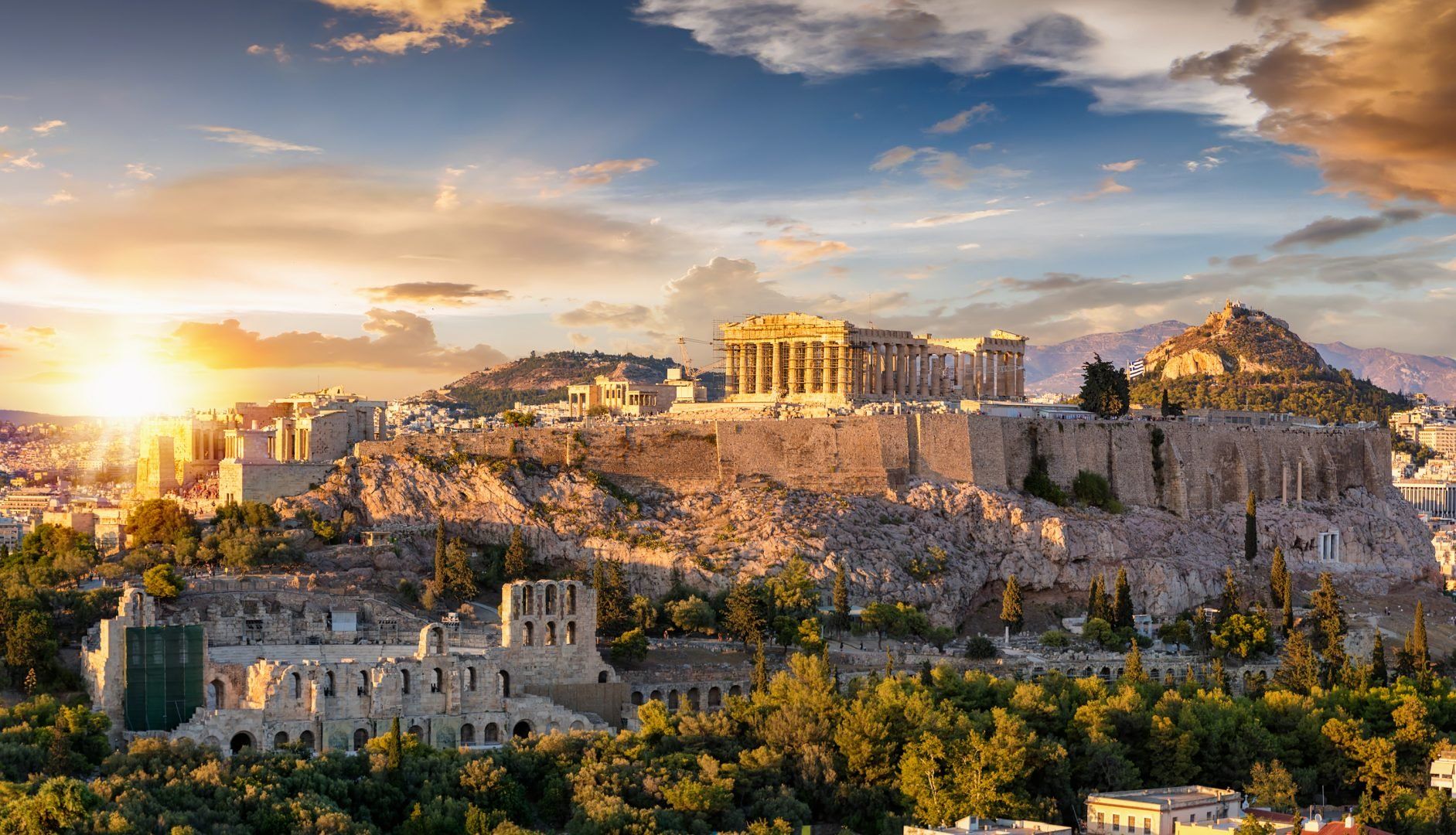
The Acropolis, Athens © Shutterrstock
Springtime (along with autumn) is the best time to visit Greece for hiking. There are no shortage of fantastic trails, for example, the Menalon trail, on the Peloponnese peninsula. If you’re northwest on the mainland, head for the Zagorohoria and the Viko Gorge in the Píndhos Mountains . The Meteora region, with its monasteries preposterously perched atop sheer rocky pinnacles, is a popular choice, as are the lovely wooded trails on the mountainous slopes of the Pelion Peninsula . Of the Greek Islands , Crete, in particular the Samaria Gorge , is probably the best known for hiking opportunities. It’s also great for bird watching in spring, along with the Eastern Aegean island of Lesvos and Tílos of the Dodecanese.
Easter is big news in Greece. It is an excellent time to be there, both for the beautiful and moving religious ceremonies and for the days of feasting and celebration which follow. If you make for a smallish village, you may well find yourself an honorary member for the period of the festival. Bear in mind that the Orthodox Easter can fall three weeks either side of the Western festival. Also, this is a busy time for Greek tourists as well as international ones, which means a hike in prices – and you’ll certainly need to book ahead.
If you’re in Greece on the May Day holiday (May 1st) do as the Greeks – pack up a picnic and head for the countryside. Families get together to fly kites and gather the pretty wildflowers, which they make into wreaths for their front doors. These mark the end of spring and welcome the first hints of summer.
By the end of May you’ll find most of the ferry companies gearing up for the summer and opening up their routes to the islands , after the reduced winter and spring services. So if you’re wondering when is the best time to go to Greece for that ideal combination of warm weather, relatively few visitors and the option to island hop, this ticks the boxes.
Visiting Greece in June – September
With temperatures soaring to an uncomfortable 30°C, you may want to give mid-summer a miss if you can, unless you’re always within plunging distance of the sea for regular cooling off sessions. Athens is difficult to take on in high heat and many restaurants shut up shop in August. That said, there is a trade off: with most people heading for the coast, there’s less traffic in the city and fewer people taking in the sites.
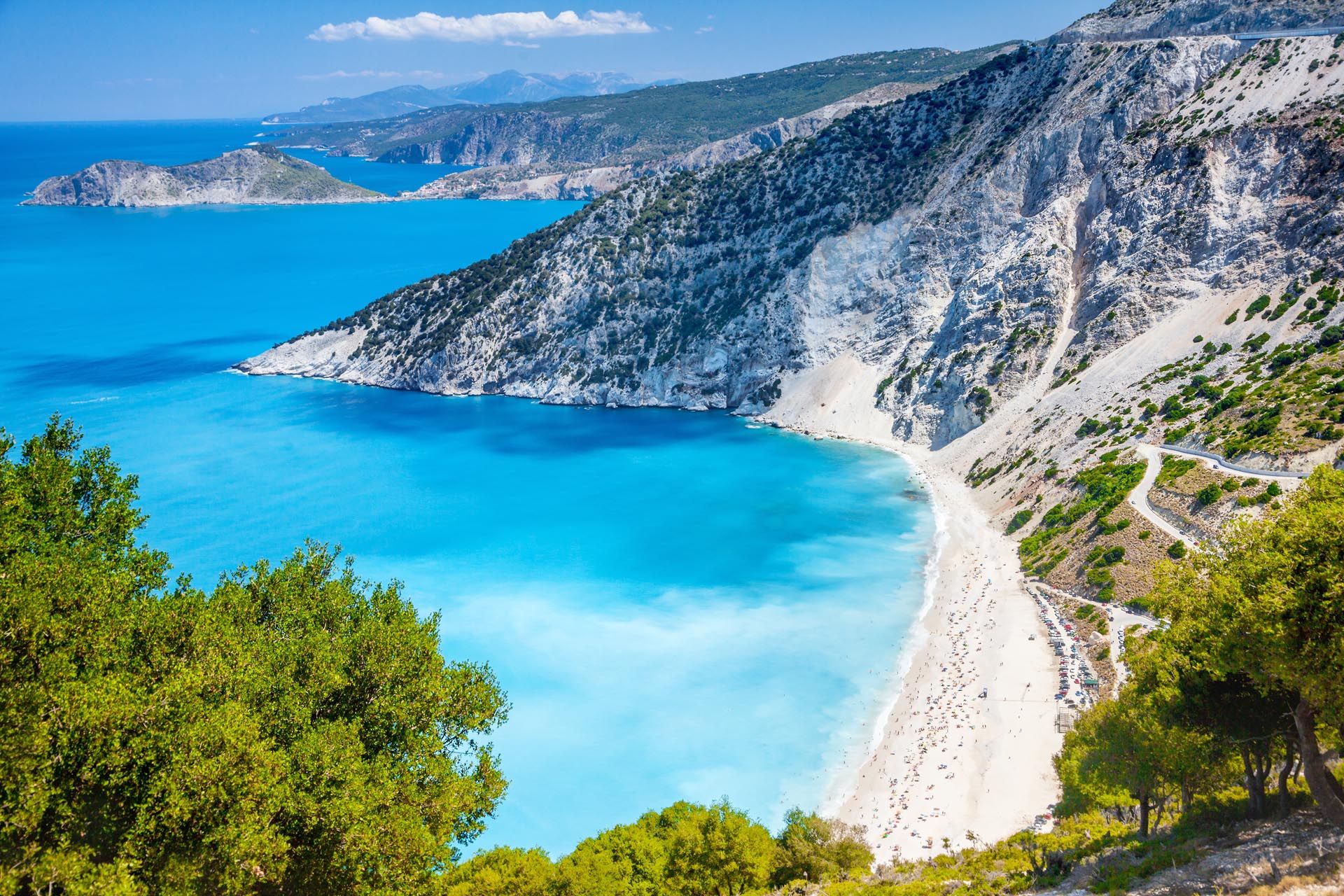
Myrtos beach, Cephalonia © Shutterstock
Also, if you’re in Athens during August, you can take advantage of the free Full Moon Festival events hosted at numerous archaeological sites and museums across the city. These include dance and theatrical performances, film screenings and concerts, with many cultural sites staying open until late. Seeing the Acropolis lit up from within, with the full moon as a backdrop, is particularly stunning. In fact, there are numerous festivals of music, theatre and dance happening in the summer months, across Greece. Read our festivals section for details.
The islands are busy during the summer months. For warm weather everywhere without the hordes, the best time to visit Greece is outside of July and August. The Meltemi winds can also affect your holiday. Being blasted by these seasonal winds that hit the Aegean during the summer can certainly take the shine off a day’s sunbathing. Islands of the Cyclades, such as Mykonos , Naxos and Santorini are affected, and Andhros and Tínos really bear the brunt of the gusts. However, the winds can take the edge off the scorching heat.
It’s worth mentioning too that service standards occasionally slip under peak season pressure and room prices on the islands can rocket. If you can only visit during midsummer, it is wise to reserve a package well in advance, buy any ferry tickets beforehand or plan your itinerary off the beaten track. You might choose, for instance, to explore the less obvious parts of the Peloponnese and the northern mainland, or island-hop with an eye for the more remote, or less popular places, such as Serifos and Sikinos in the Cyclades, Karpathos and Astypalea in the Dodecanese.

Karpathos island © Shutterstock
If you’re looking to party, though, the nightlife on some of the islands, such as Skiathos ( the Sporades ) and Mykanos (The Cyclades), really kicks off in July and August. Clubs are buzzing, with top notch DJs taking to the decks.
Visiting Greece in September – November
Autumn in general is beautiful. The light is softer, the sea often balmier than the air and the colours subtler. It's also when towns and villages go back to their workaday states – a refreshing change from the gloss of summer tourism.
Come September it's already less busy and the sea is at its warmest, having had the whole summer to warm up. This is maybe the best month to visit Greece if you want a bit of everything from your trip. You can kick back on the beach (certainly no shortage of these), take a dip in the sea, go hiking – and pack in some sightseeing without breaking too much of a sweat. September is also ideal for climbing ‘home of the gods’, Mount Olympus . Pack your walking boots and set aside a few days for the trek, staying at one of the mountain refuges overnight. If that sounds too strenuous, you can take gentler rambles on the forested lower slopes.

Sunset on the island of Santorini © Shutterstock
In October you will almost certainly hit a stormy spell, especially in western Greece or in the mountains. But for most of that month the “little summer of Áyios Dhimítrios” (the Greek equivalent of Indian summer) prevails, and the southerly Dodecanese and Crete are extremely pleasant.
Fewer visitors in October makes this a good opportunity to explore cultural hotspots too, such as Athens and Thessaloniki . And November sees Thessaloniki hosting its outstanding annual film festival. So this is perhaps the best month to travel to Greece to catch some of the most innovative films from around the world.
Visiting Greece in December – February
December to March are the coldest and least reliably sunny months, though even then there are many crystal-clear, fine days. The more northern regions and areas at higher altitudes endure far colder and wetter conditions, with the mountains themselves often under snow from November to May. You’ll find the mildest temperatures in winter on the island of Rhodes and southeastern Crete. In fact, Crete , with its gorgeous beaches, archaeological sites and opportunities for hiking, makes a great winter getaway.

Hiking in the White Mountains, or Lefka Ori, Crete © Shutterstock
Weather aside, out of season you will have to contend with reduced ferry and plane services to many of the islands, plus fairly skeletal facilities when you arrive. In fact, many of them go into hibernation during the winter. You will, however, find reasonable service on main routes and at least one hotel and taverna open in the port or main town of all but the tiniest isles. And larger islands, such as Crete, Corfu and Rhodes, are lively enough throughout the year. On the mainland, winter travel poses no special difficulties except, of course, in mountain villages either cut off by snow or (at weekends especially) monopolized by avid Greek skiers.
You might not expect to see the words ‘Greece’ and ‘skiing’ in the same sentence. Let’s face it, It isn’t exactly known as a premiere skiing destination. That said, Greece is a land with some mighty mountains, which, come winter, see plenty of snow and ample opportunities to ski. For example, Mt Parnassós (at Kelária and Fterólakka) draws in skiers from nearby Athens and around, while the Peloponnese offers downhill action and alpine-like beauty at Kalavryta on Mt Helmós. So, if you travel to Greece in the winter you could wander the ruins of the Acropolis in the morning, tuck into a bowl of Fasolatha at lunchtime, and be on the red runs by the afternoon.
If you’re keeping a close eye on cost, travelling off season (basically, outside the summer months) will save you money – on accommodation, eating out, even some entrance fees to museums and cultural sites. So, as long as you avoid the big national holidays, such as Christmas and Easter, this is the best time to travel to Greece for those on a budget.
Nothing brightens winter gloom like carnival ( apokries ). Kicking off before the first day of Lent, preceding Easter, celebrations in Patra on the Peloponnese are the most exuberant. The boúles, or masked dances, at Náoussa in Macedonia, and the outlandish goat dance on the island of Skýros are also worth seeing. The Ionian islands also do carnival well, and Athenians celebrate by going around hitting each other on the head with plastic hammers.
Whether you’re a newbie or a fully-fledged skipper, sailing the waters around Greece and its islands is a dream – and a great way to explore the myriad tucked away coves and beaches.
Unsurprisingly, if you avoid high summer, beaches and ports will be less busy, with fewer cruise ships to spoil your idyll. Seas tend to be calm around the Ionian Islands, Sporades and Halkidiki (Halkidhiki ), which is definitely an advantage if you’re new to sailing, or if you’re likely to get seasick. With the wild meltemi winds hitting the southern Aegean and the Cyclades during the summer months, sailing these waters is not for the novice sailor or the faint hearted.
So, if you want to sail and are wondering when is the best time to go to Greece, springtime showcases the islands at their greenest. But if you want to swim as well as sail, wait until September when the sea is warmer.

Windsurfing the waters of Crete © Shuttterstock
Most of the big Greek popular festivals have a religious basis, so they’re observed in line with the Orthodox calendar. This means that Easter, for example, the most important festival of the year, can fall as much as three weeks to either side of the Western festival. With its lavish feasts, celebrations and religious ceremonies, it's a fantastic time to be in Greece. It is busy, however, so book ahead.
On top of the main religious festivals, there are scores of local festivities, or paniyíria, celebrating the patron saint of the village church. With some 330-odd possible saints’ days you’re unlikely to travel round for long without stumbling on one of them.
More important than your actual birthday, is the “Name Day” of the saint who bears your name. The big name day celebrations (Iannis/Ianna on January 7 or Yioryios on April 23 for example) can involve thousands of people. If your name isn’t covered, no problem – your party is on All Saints’ Day, eight weeks after Easter.
Please note that the current coronavirus situation means some events may be postponed or cancelled. Check individual events before booking your trip.
Throughout the summer you’ll find festivals of music, dance and theatre at venues across Greece, with many of the events taking place at atmospheric outdoor venues. Some, in the resorts and islands, are unashamedly aimed at drawing tourists, others more seriously artistic. The granddaddy of them all is the Athens and Epiduarus Festival , which has been running every summer for over fifty years, incorporating everything from open-air performances of Classical drama in ancient theatres to jazz and contemporary art. Others include:
Iráklion Festival : July–Aug
Kalamáta Dance Festival : July
Olympus Festival : Dhíon, Mt Olympus; July–Aug
Pátra International Festival : July–Sept
Philippi Festival : Thássos; July–Aug
January – March
Jan 1: New Year’s Day (Protokhroniá) In Greece this is the feast day of Áyios Vassílios (St Basil).
Jan 6: Epiphany (Theofánia/Tón Fóton) Marks the baptism of Jesus as well as the end of the twelve days of Christmas.
Carnival (Apokriátika) Festivities span three weeks, climaxing during the seventh weekend before Easter. Pátra Carnival, with a chariot parade and costume parties, is one of the largest and most outrageous in the Mediterranean. Interesting, too, are the boúles or masked revels which take place around Macedonia (particularly at Náoussa), Thrace (Xánthi), and the outrageous Goat Dance on Skýros in the Sporades. The Ionian islands, especially Kefaloniá, are also good for carnival, as is Ayiássos on Lésvos.
Clean Monday (Kathará Dheftéra) The day after Carnival ends and the first day of Lent, 48 days before Easter, marks the start of fasting and is traditionally spent picnicking and flying kites.
March 25: Independence Day and the feast of the Annunciation (Evangelismós) Both a religious and a national holiday. Military parades and dancing celebrate the beginning of the revolt against Ottoman rule in 1821, and church services honour the news given to Mary that she was to become the Mother of Christ. There are major festivities on Tínos, Ýdhra and any locality with a monastery or church named Evangelístria or Evangelismós.

April – June
Easter (Páskha):The most important festival of the Greek year. The island of Ýdhra, with its alleged 360 churches and monasteries, is the prime Easter resort; other famous Easter celebrations are held at Corfu, Pyrgí on Híos, Ólymbos on Kárpathos and St John’s monastery on Pátmos. Good Friday and Easter Monday are also public holidays.
April 23: The feast of St George (Áyios Yeóryios) St George, the patron of shepherds, is honoured with a big rural celebration, with feasting and dancing at shrines and towns. If it falls during Lent, festivities are postponed until the Monday after Easter.
May 1: May Day (Protomayiá) The great urban holiday when townspeople traditionally make for the countryside to picnic and fly kites, returning with bunches of wild flowers. Wreaths are hung on their doorways or balconies. There are also large demonstrations by the Left for Labour Day.
Whit Monday (Áyio Pnévm a ) Fifty days after Easter, sees services to commemorate the descent of the Holy Spirit to the assembled disciples. Many young Greeks take advantage of the long weekend, marking the start of summer, to head for the islands.
June 29 & 30: SS Peter and Paul (Áyios Pétros and Áyios Pávlos) The joint feast of two of the more widely celebrated name days
July – August
July: Ippokrateia Festival ; Kos
July: Réthymnon Wine Festival
July 17: Feast of St Margaret (Ayía Marína) A big event in rural areas, as she’s an important protector of crops.
July 20: Feast of the Prophet Elijah (Profítis Ilías) Widely celebrated at the countless hilltop shrines of Profítis Ilías. The most famous is on Mount Taïyetos, near Spárti, with an overnight vigil.
July–Aug: Sáni Jazz Festival ; Halkidhikí
Aug: Lefkádha Arts and Folklore festivals
Aug 6: Transfiguration of the Saviour (Metamórfosis toú Sotíros) Another excuse for celebrations, particularly at Khristós Ráhon village on Ikaría, and at Plátanos on Léros. On Hálki the date is marked by messy food fights with flour, eggs and squid ink.
Aug 15: Assumption of the Blessed Virgin Mary (Apokímisis tís Panayías) This is the day when people traditionally return to their home village, and the heart of the holiday season, so in many places there will be no accommodation available on any terms. Even some Greeks will resort to sleeping in the streets at the great pilgrimage to Tínos; also major festivities at Páros, at Ayiássos on Lésvos, and at Ólymbos on Kárpathos.
Aug 29: Beheading of John the Baptist (Apokefálisis toú Prodhrómou) Popular pilgrimages and celebrations at Vrykoúnda on Kárpathos.
September – December
Sept 14: Exaltation of the Cross (Ípsosis toú Stavroú) A last major summer festival, keenly observed on Hálki.
Sept 24: Feast of St John the Divine (Áyios Ioánnis Theológos) Observed on Níssyros and Pátmos, where at the saint’s monastery there are solemn, beautiful liturgies the night before and early in the morning.
Oct 28: Óhi Day A national holiday with parades, folk dancing and speeches to commemorate prime minister Metaxas’ one-word reply to Mussolini’s 1940 ultimatum: Ohi! (“No!”).
Dec 6: Feast of St Nicholas (Áyios Nikólaos)
Dec 25 & 26: Christmas (Khristoúyenna) If less all-encompassing than Greek Easter, Christmas is still an important religious feast, one that increasingly comes with all the usual commercial trappings: decorations, gifts and alarming outbreaks of plastic Santas on rooftops.
Dec 31: New Year’s Eve (Paramoní Protohroniá)
The Rough Guides to Greece and related travel guides
In-depth, easy-to-use travel guides filled with expert advice.
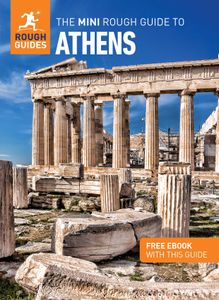
Travel advice for Greece
From travel safety to visa requirements, discover the best tips for traveling to Greece
- Culture and Etiquette in Greece
- Eating and drinking in Greece
- Getting around Greece: Transportation Tips
- How to get to Greece
- Travel Tips Greece for planning and on the go
- Crete Itinerary - how to spend 5, 7, 10 or 14 days in Crete
- How to get from Athens to Crete
Find even more inspiration here

- Travel Tips
written by Rough Guides Editors
updated 2.02.2024
Ready to travel and discover Greece?
Get support from our local experts for stress-free planning & worry-free travels.
- Where to stay
- Travel advice

The best time to visit Greece: a season-by-season guide to planning your perfect trip
A Greek escape is always a good idea, but deciding on the best time of the year to visit Greece comes down to two things: what kind of weather you like and what you want to do when you get there. If you’re eager for Greece tours that focus on Athens and its museums and archaeological sites, then any time is the best time to visit Greece. If you’d rather spend your trip to Greece exploring picture-perfect islands, then schedule your adventure for summer. The best places in Greece only get better when you visit at the right time.
No matter when you want to take your Mediterranean holiday, our Greece tours are designed for travelers to maximize their visit through unforgettable experiences that highlight the best of the destination. Read on for our season-by-season guide to planning your perfect Greek getaway.
Weather in Greece by month
When is the best time to visit Greece? Any time—even winter! Given its location in the eastern half of the Mediterranean Sea, weather in Greece varies by season and region. The mountainous north gets snow in the winter—enough that there are, in fact, ski resorts in this part of the country. (It gets very cold in the Pindus Mountains near the border of Albania, for example.) Athens, however, enjoys mild winters with an average temperature of 50°F for most of the season. On the other end of the calendar, Greece’s capital city experiences very hot summers.
If you’re looking to get a tan while exploring the islands, the summer months are the best time to visit Greece. Yes, it may be very sunny and hot, but their coastal perch means cooling breezes come in from off the sea.
Want to travel in the spring or summer? The off-season is also a great time to plan a Greece tour . Weather in Greece, especially in Athens, will be more temperate and not as oppressively hot. Some of the islands will already be warm enough for midday swims. Plus, there will be fewer crowds during the shoulder season, which makes it the best time to visit Greece.
Winter in Greece
Go for seasonal cuisine and holiday celebrations.
Planning a trip to Greece for the winter will show you exactly why we love off-season travel. Our Greece tours that set off during the winter months are timed around the New Year holiday, which will add a celebratory flourish to your European adventure. Our New Year’s Eve in Rome: Italy & Greece tour features four glorious days in Greece. This is your chance to combine seasonal thrills with classic cultural experiences (like touring the Acropolis in Athens and the UNESCO-listed archaeological site of Mycenae in Nafplio).
Many of the Greek islands turn into sleepy villages when winter comes. Hotels shut down, restaurants and shops close earlier, and ferry and flight frequency drops. However, Athens and other mainland Greek destinations are ready to welcome you. Ring in the New Year with a trip to Greece , sample winter-only delicacies, and check out local Christmas markets like the brightly lit wonderland in Syntagma Square. Your itinerary will include plenty of free time to track down traditional Greek dishes, such as stuffed lahanodolmades (cabbage rolls), horta (wild greens), and fasolada (bean soup). For dessert, try kourabiedes (biscuits), diples (fried dough), and melomakarona (a type of honey biscuit typically served at Christmastime). Winter is the best time to visit Greece if you’re a foodie!
And let’s not forget: You’ll have more of this enthralling destination to yourself because there will be fewer visitors.
Weather in Greece in December, January, and February:
Average temperatures range between 15°F and 59°F
Spring in Greece
Go for blooming flowers, cultural events, and fantastic weather.
Whether you’re eyeing our brand-new Grand Tour of Greece: Athens, Corfu & Santorini or our A Week in Greece: Athens, Mykonos & Santorini tour , consider booking your Greece trip for the spring. While the best time to visit Greece is any time of the year, we might pick spring as the season with the best weather—especially if you set off on your Greece tour in May, when nearly every region of the country is glowing with bright sunshine and warm temperatures. Most importantly, the country isn’t too busy with visitors in the spring, making it a great time to experience all the bucket list things to do in Greece .
Nature lovers planning a trip to Greece will enjoy seeing destinations like Athens, Mykonos, and Santorini at their most fertile. With its wineries, olive groves, citrus orchards, and fields of wildflowers, Greece takes on an Eden-like quality during the spring months. If you prefer to time your trip around lively cultural events, the best time to go to Greece is spring. In May, use your free time to check out the Athens and Epidaurus Festival, a celebration of ancient Greek arts and culture. Greek Orthodox Easter is also a special time of the year when the country highlights age-old traditions you won’t see anywhere else, from midnight firework displays to candlelit processions.
Weather in Greece in March, April, and May:
Average temperatures range between 28°F and 77°F
Check out our Greece tours
Summer in greece, go for beaches, festivals, and hot weather.
If sunny days and swimming weather call to you, the best time of year to go to Greece is during the summer, when island life is even more appealing. You’ll definitely want to book The Greek Islands: Mykonos, Santorini & Crete tour , which brings you the classic Greek Island experience. If you’re looking for more under-the-radar locales, our brand-new Greece’s Ionian Islands: Athens, Kefalonia & Corfu tour is just the ticket. Whichever you pick, you’ll get to experience the best Greek islands that make for unforgettable summer escapes.
Love island hopping? Our Greece tours offer up plenty of seaside excursions. During a free day in Kefalonia, you can even sign up for an optional visit to Shipwreck Beach in Zakynthos. There’s plenty of sightseeing, too, including visits to historic taverns and charming fishing villages from Athens to Crete. In your free time, maybe you’d want to partake in a local festival? Summer in Greece is busy with both modern and traditional happenings, from weekend dance parties in Athens to the August Moon Festival, an ancient celebration hosted all over the country. Embrace the summer buzz of it all, and then step away from the crowds to discover all the stunning Greek neighborhoods you can’t miss .
Weather in Greece in June, July, and August:
Average temperatures range between 68°F and 97°F
Fall in Greece
Go for archeological sites and outdoor adventure.
What makes an autumn trip to Greece so special is that it’s the perfect time to be outside. The weather in Greece is fantastic from September to November—just like it is in the spring. The most spectacular ancient Greek temples you can imagine are all outside and exploring them in the cooler fall temps is a lot more pleasant than under the intense heat of summer. You can actually linger and enjoy the ruins of the Temple of Zeus, as well as the site of the first Olympic Games.
If you take our A Week in Ancient Greece: Athens, Delphi & Olympia tour during the fall, your stay in Athens will be even more magical. You’ll have more space in the city’s museums, shops, and restaurants. Our Footsteps of Saint Paul in Greece: Thessaloniki to Athens tour offers an opportunity to hike in the rugged Meteora region, which is fabulous in autumn when the surroundings are lush and the climate is mild.
If you go for our A Week in Greece: Athens, Mykonos & Santorini tour , especially during the earlier half of fall, you can still enjoy bright, warm weather on the beaches of Mykonos and Santorini. Plus, if you decide to visit the volcanic vineyards of Santorini, you’re in luck: You’ll get to witness a busy harvest. Because it’s less busy in the fall, we also love recommending our autumn Greece tours to solo travelers. There’s something truly magical about traveling to Greece solo when you have more time and space to explore.
Weather in Greece in September, October, and November:
Average temperatures range between 54°F and 82°F
The best time of year to visit Greece is any time! Browse our Greece tours and you’ll be on your way.

Explore more Greece tours

4.7 out of 5 stars

4.6 out of 5 stars

4.5 out of 5 stars

More travel inspiration


- Living In Croatia
- Croatian Recipes
- Balkan Recipes

Home > Best Time To Visit Greece – Greek Seasons & When To Go
Best Time To Visit Greece – Greek Seasons & When To Go

Written by our local expert Nick
Nick is is digital nomad originally from Athens, Greece. You will now find him exploring the Greek islands, Bulgaria and beyond.
When’s the best time to visit Greece? Well, there’s no such thing as a bad time, but your perfect moment depends on your preferences.
For me, the best season in Greece means embracing the shoulder seasons to avoid the large crowds. However, my friends can’t resist the allure of Greece’s sunny weather in summer despite the bustling masses.
In my guide, I dive into the Greek seasons, helping you find your ideal time to explore my captivating country!

When you think of Greece, what’s the first thing that pops into your head? Probably a postcard-perfect beach with crystal-clear waters, right? Well, you’re not alone in that! Greece is famous for its stunning beaches, and the mental image of sun, sea, and sand is practically ingrained in our minds.
But here’s the inside scoop: Greece isn’t all about sweltering summers and sandy shores. In fact, if you want to avoid the scorching heat and overwhelming crowds, you might want to consider a trip during the late spring or autumn months.
Trust me; it’s a game-changer.
And while we’re at it, let’s clear up another misconception. Yes, we all know about the big shots like Crete, Santorini, and Mykonos – they’re like the rock stars of Greek islands. But hold on to your souvlaki because Greece has so much more to offer. Beyond those famous beachy hotspots, there’s a whole mainland waiting to be explored.
Charming cities, quaint villages, and landscapes that are more mountainous than a ski resort brochure. Yup, you heard me right – Greece is a hidden gem for winter enthusiasts. If you’re into skiing or snowboarding, this place has you covered.
So, here’s the deal: I have whipped up a handy season-by-season guide to Greece. It’s not just for beach bums – it’s for anyone who’s up for an adventure in this incredible country. Whether you’re chasing waves or carving down slopes, I have you covered.
Stick around, and I’ll show you how to make the most of Greece, no matter if it is the low season or high season.
Skip Ahead To My Advice Here!
Weather & Seasons In Greece

Located in the south of Europe, most of Greece faces the mild waters of the Mediterranean Sea . This allows the country to enjoy long, pleasant summer months, often dry and very high temperatures in July and August, and mild winters with some rain.
The Mediterranean climate is not the same all over the area, and certainly not in every part of the country. Although the Mediterranean Sea features higher temperatures than other seas in the region, other elements, such as the elevation of the terrain, play a crucial role when talking about the weather in Greece.
Weather In Greece With Average Temperatures
Of course the average daily temperature change, but this table gives you a good idea as to what to pack and when to go to Greece, depending on your preferences.
Best Time To Travel To Greece
Figuring out when is the best month to visit Greece is a personal choice. It very much depends on the type of weather you like. So let’s break them down so you can decide when is the best time of the year to visit Greece.
Greece Seasons – Summer In Greece
When is summer in Greece? The end of May is when early summer begins in the country, starting much earlier in some of Greece’s southern islands.
From June to August, Greece sees the hottest temperatures almost in every corner of the country. The weather is generally stable in this period, and there are virtually no rainy days – hello, dry summers. However, when showers do appear in the peak season, they tend to last for just a few hours.
Summers in Greece are scorching, with long periods of drought. However, the climate remains pleasant thanks to the several winds blowing in the Aegean Sea . The most famous is the Meltemi, a northern wind that brings relief to the sweltering summer days .
If you’re looking to spend time during the hottest days , then definitely book your trip for the last week of July and the first week of August. These have always been the warmest weeks of the year in Greece.
Summer is a great month to visit the Cycladic Islands as well as the islands in the Ionian. If rain is something that you do not enjoy, choose places such as Corfu or Zakynthos . These islands see a lot of rainy days in the wet winter months but can be dry yet lush and green during the summer.
In summary, Summer is 100 percent the best time to visit the Greek islands!
Greece Seasons – Spring In Greece

Spring is a fantastic season to visit any area of Greece; with longer and warmer days, the landscape naturally blossoms with colorful flowers and fragrant herbs.
The mountains in northern Greece are a perfect destination since the weather is mild and pleasant, allowing visitors to enjoy long hikes in nature.
Another excellent spring destination is Crete , Greece’s biggest island, the country’s southern territory, quite close to the coasts of Africa.
Summers here are arid and hot, mainly on the southern coast, so visiting during spring makes the trip more enjoyable while still allowing visitors to swim in the sea, which is sometimes much cooler on other islands.
Greece Seasons -Winter In Greece
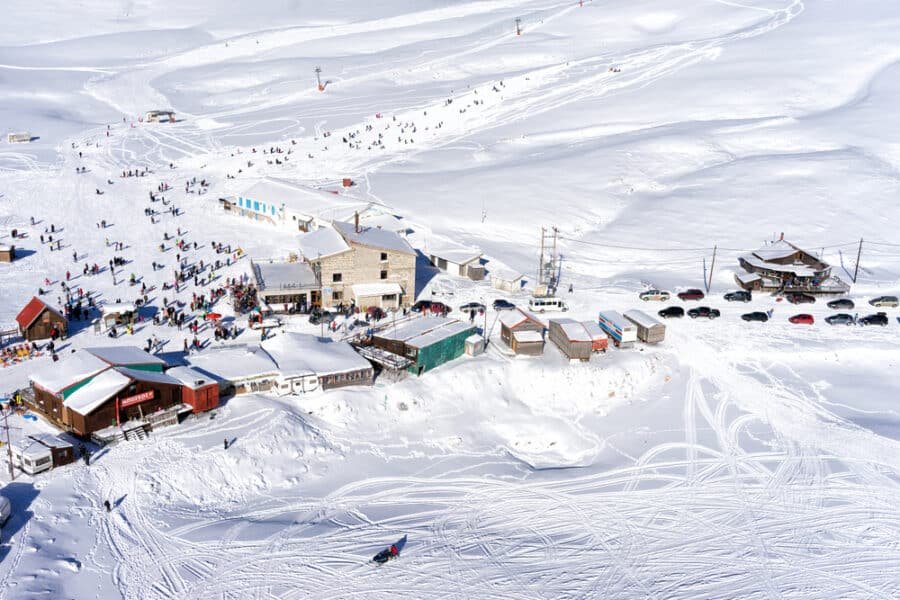
Winter begins between late October and November. In northern Greece, the landscape changes slowly, and high peaks can see snow quite early during the season.
Southern Greece, instead, sees the first days of cold at the beginning of December. Although many coastal settlements and islands do not have freezing temperatures, the weather is grey and rainy, which helps maintain warmer temperatures.
Greece sees its coldest days during January and February; if you plan to ski, head to Olympos, Veria, or Parnassos. If you prefer milder weather, reach the Aegean Islands, the Ionian, the Dodecanese , and Crete, where winters are much warmer.
Greece Seasons – Autumn In Greece
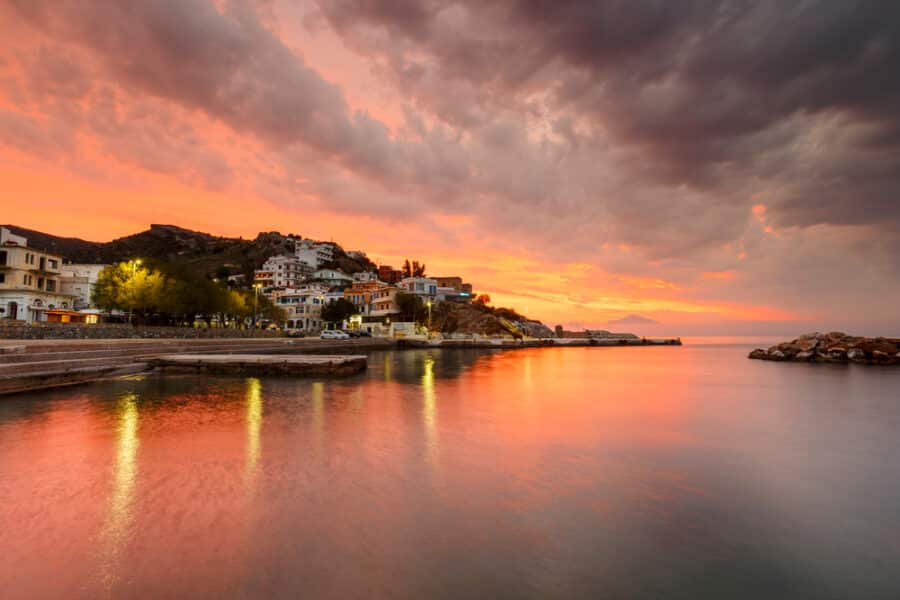
Autumn In Greece is probably the most beautiful season. It is sometimes even warmer than in spring (2 to 4 degrees Celcius higher – 50 to 68 degrees Fahrenheit).
The early weeks of the fall season are the best months to visit the islands . The seawater temperatures can be even higher than they were in the middle of summer after months of sun exposure.
Fall can be very hot in the country’s south, on some islands, even until the end of November. Typical characteristics are the clear skies and calm days, with little to no wind on some islands, including Karpathos or Crete.
A holiday at the end of September benefits visitors with fantastic weather, still little rain, warm sea, and other perks such as emptier cities and beaches and cheaper accommodation!
Brands We Use And Trust
Best time of the year to visit greece.

This might be one of the tourists’ top questions before visiting the country. It all depends, of course, on the kind of traveler you are and the type of holidays you and your family enjoy the most, but in general, it is fair to say that traveling to Greece in autumn can be the best bet to find good weather and little to no rainy days.
On the other hand, those keen on skiing and several different winter sports will find winter a magnificent moment to travel around the country. Perfect for exploring those areas of Greece that are lesser-known to mass tourism. And, even if winters are cold and snowy in some regions, “cold winters” in Greece are not as rigid as in the north of Europe.
This makes the country much more pleasant for those who do not count wet winters among their favorite moments of the year!
The Warmer Months: Spring, Summer, And Fall
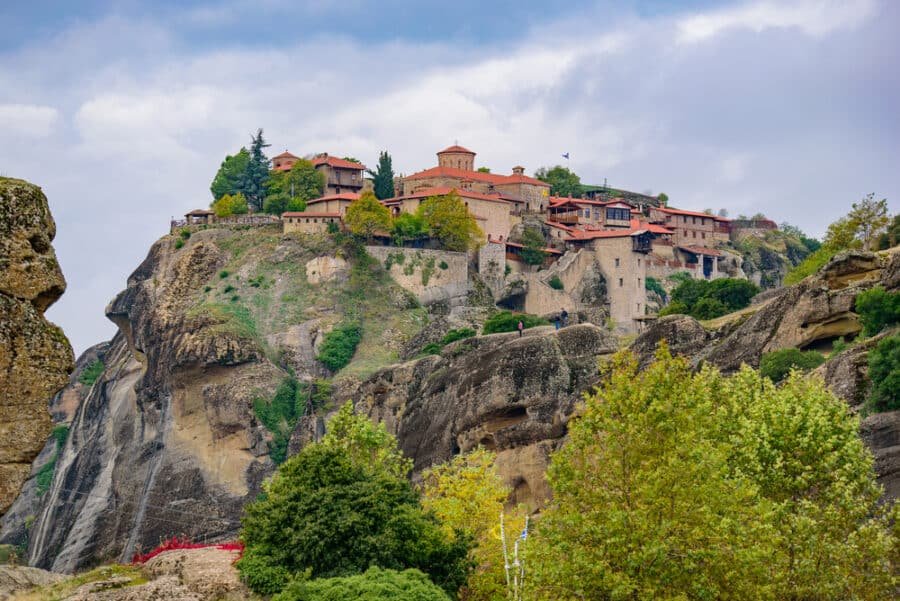
Best Things To Do In Greece And Places To Visit
Right after Easter is the moment when Greece officially begins its extended summer season. Greek Easter takes place at a different date every year, but usually around the end of April and the end of May.
On most islands, the end of Easter weekend marks the official start of tourist activities. This is when most seasonal hotels, restaurants, souvenir shops , resorts, and even entire villages open up again to the public.
Prices are still very affordable, even on luxurious and exclusive islands. For instance, accommodation on Santorini or Mykonos , traditionally very expensive for 5-star hotels, can be much more affordable and easier to book during the months of April and May.
Schools usually close during the second week of June in Greece; this enhances the hot summer atmosphere with families and kids visiting local beaches even during weekdays.
This is the time of the year when regular and charter flights start arriving on the islands with a higher frequency, and many festivals and artistic activities are going on all over the country.
The weather is certainly warmer, and it is easy to find foreign tourists all over Greece.
Athens also receives more travelers who spend a few days visiting the capital to reach some of the Cycladic Islands then. At the same time, every Greek port starts increasing the ferry routes to almost every Greek destination.
July and August are often the craziest and busiest months on every island. Prices go up, sometimes even doubled, and finding last-minute accommodation, car rental , and even a spot in a restaurant without a reservation can be mission impossible!
Cities are full of tourists and traffic. Every tourist attraction is crowded, and there are queues everywhere: museums, archaeological sites, open cinemas, and even the shower at the beach !
Traveling during the Greek sunny summers requires a calm philosophy and unique doses of patience that not every tourist has.
As a general piece of advice, avoid the Greek summer months of July and August if:
- You are on a budget
- You do not love crowds
- You can’t stand scorching weather
- You are not patient
The Cold Season In Greece: Winter
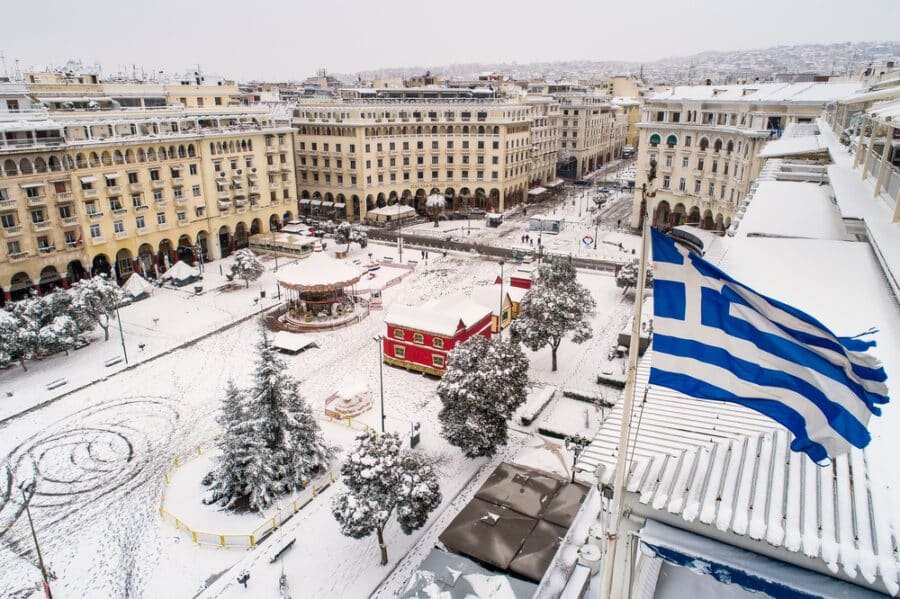
The period between December and March is the coldest moment to visit Greece. Several structures are closed or working with reduced hours; everything is quieter and even cheaper!
Suppose you do not suffer from cold temperatures. In that case, this is the right time to enjoy long walks in nature, visit museums and archaeological sites , explore exhibitions and art galleries, mingle with the locals, and spend extended periods in the country.
Some islands see very clear days, sometimes with warm temperatures that allow you to wear short sleeves and enjoy long walks by the sea, Rhodes is one of them, but as a general rule, winter is not the best moment to enjoy beach time in Greece.
There are tons of other things to do instead everywhere in the country. The Northern regions of the country are the ones that see the coldest days, with abundant snow on the mountains and ski runs open to the public, sometimes starting as early as in November and always until at least mid-February.
At lower altitudes, it’s common to experience rain, fog, and humidity, making you feel cold temperatures more intensely. If you’re traveling to Greece in winter , do some research and pack wisely. Choose layers and warm materials, and pack a jacket , along with winter basics such as hats, gloves, and scarves; you will need them!
If you prefer warmer temperatures, choose regions such as the Peloponnese or islands like Rhodes or Crete , enjoying several sunny days during the winter season with temperatures ranging from 10 to 20 degrees Celsius (35.6 to 39.2 degrees Fahrenheit).
Avid skiers and winter enthusiasts will find a wide choice of destinations to explore and discover. Some of them are loved by locals who can be more passionate about winter landscapes and cold weather than you might think.
The country is home to many fantastic ski resorts that often get crowded during Christmas and winter .
Places to practice winter sports include the Velouxi Ski Resort in Karpenisi , a town in Evrytania. The resort is about five hours from Athens and is a magnificent destination for snowboarding, with its one-of-a-kind snowboard park. Greeks also love to ski in Mount Parnassos, Volos, and Kalavryta, to mention a few.
Another popular place that often receives the nickname of winter Mykonos is Kaimaktsalan Ski Center, on Mount Voras, about 40 kilometers from Thessaloniki , a great city to visit in winter too.
Thessaloniki is the second most important city in Greece. It’s a young and pretty much alive destination, where thousands of students all over Greece come to study at the most important university in the country. For this reason, the city is a vibrant destination all year round, and it does not close its doors during winter.
When deciding which destinations to visit in Greece during winter, do not forget to keep the following details in mind:
- Prices are more convenient for hotels and accommodation in general, but the offer tends to be reduced, especially on the island
- The routes for ferries to the islands are very reduced; some small islands count with only one or two ferries per week
- Some islands heavily depend on the mainland to get provisions during winter; when the winds are so strong that the ferry services are suspended, it can be difficult to find basic supplies even in the biggest supermarkets; the same goes for fuel.
- Mountain roads can be snowy, slippery, and even closed on some days; always keep chains for the snow in your car when venturing into the mountains during winter. Some villages can be cut off by heavy snow; always check the weather forecast before getting on the road!
As you can see, the country is truly a year-round destination, with experiences and unique things to do all year round, beaches, mountains, villages… you name it, Greece will probably have it ready for you.
Move This Adventure To Your Inbox & Get An Instant Freebie

No spam. Unsubscribe at any time.
When To Go To Greece FAQs
When is the best time to visit greece to explore ancient sites.
Ancient sites in Greece are best explored during the mild weather of late spring (late May) or early fall (late September) when the temperatures are pleasant and there are fewer crowds.
What’s the perfect time to enjoy outdoor activities in Greece?
For outdoor enthusiasts, early November offers cooler days that are perfect for hiking, biking, and other outdoor adventures, especially in the mountainous areas.
When can I experience the Greek Orthodox Easter celebrations?
The Greek Orthodox Easter, known for its unique traditions, falls in the spring. Holy Week culminates in a grand celebration, making late April a wonderful time to witness this cultural event.
When is the Carnival season in Greece?
Carnival season in Greece typically occurs in February, leading up to Lent. It’s a lively and colorful time, with various festivities and parades.
What’s the shoulder season in Greece, and why is it a good time to visit?
The shoulder season months in Greece, which include early May and early September, offer mild weather, fewer tourists, and lower hotel prices, making them a great time to visit for those who prefer smaller crowds and lower costs.
What’s the hottest capital city in Greece, and when should I visit it?
Athens, the capital city of Greece, experiences hot weather during the summer months, particularly in July and August. If you enjoy warm weather, this is the time to go.
Which months have the warmest water for beachgoers?
The Ionian Sea , with its warm and inviting waters, is perfect for beach lovers from late June through August when the sea temperature is at its highest.
When is the cheapest time to visit Greece for budget-conscious travelers?
To save on expenses, consider visiting Greece in the coldest months of January and February, when prices for hotels and flights tend to be lower.
What are the best months to explore the mainland of Greece?
The mainland of Greece, rich in historical sites and cultural attractions, can be best explored during the cooler days of early fall or late spring, ensuring a more comfortable experience.
What’s the weather like on the smaller Greek islands during late September?
Smaller islands in Greece enjoy mild and pleasant weather in late September. It’s an excellent time for a quieter island getaway with beautiful beaches and smaller crowds.
So, have you made up your mind already? What season will you be visiting Greece? And where are you planning to go?
- How To Tip In Greece
- Car Rental And Driving Tips In Greece
- Where To Stay In Greece To Avoid the Crowds
- What To Expect & Do In September In Greece
- Things To Do In Greece During The Winter
- Packing Tips For Greece
- How To Order Coffee In Greece
- How To Get From Santorini To Crete
- Best Beach Resorts In Greece
- Most Beautiful Cities In Greece
- A Guide To Kos Island
- Fascinating Facts About Greece
- Greek Wines In Greece – What To Drink & Where
Comments (3)
I would like to thank you for the efforts you had made for writing this awesome article.
Thanks for sharing.
I was looking for an article like this for a long time! Great to read. I’m adding the blog to my favorites.
Leave a Reply Cancel reply
Your email address will not be published. Required fields are marked *
Save my name, email, and website in this browser for the next time I comment.
This site uses Akismet to reduce spam. Learn how your comment data is processed .
Subscribe To Unlock Your FREE Customizable Travel Packing List & All Our Best Tips!
Unlock Your FREE Customizable Travel Packing List!
Subscribe Now For Instant Access To Stress-Free Packing
Two Tickets Anywhere
Digital Nomad Tips, Guides & Resources
Best Time To Visit Greece In 2024 (And When To Avoid It)
Category Greece , Athens , Thessaloniki , Travel Updated on January 23, 2024
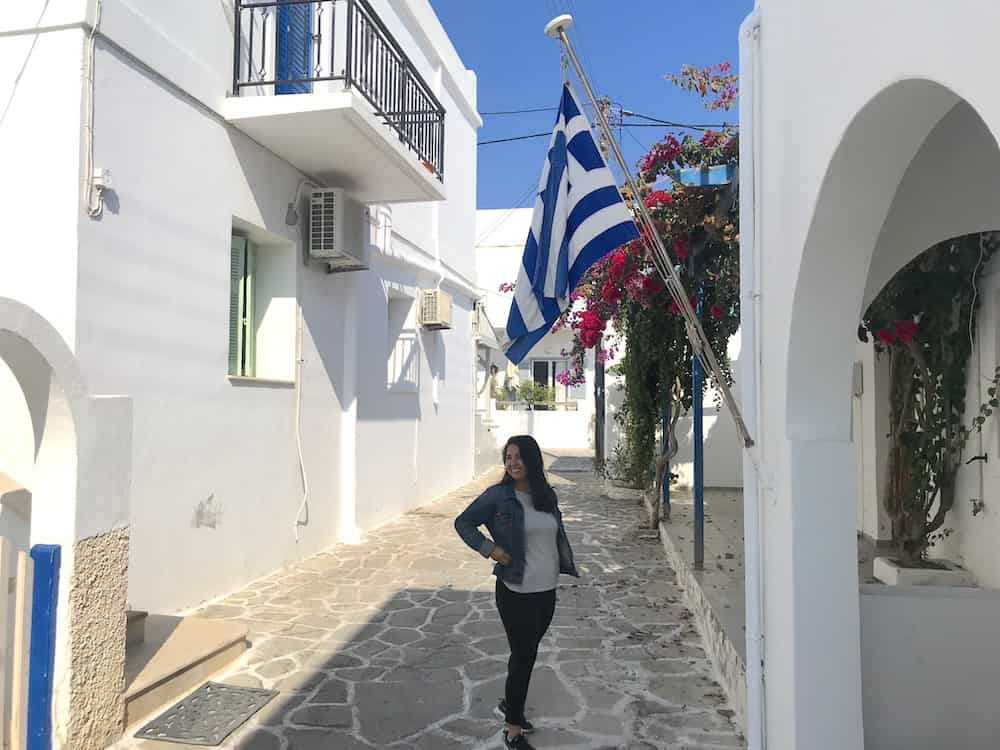
Are you trying to figure out the best time to visit Greece?
You must be smart to research this before heading there! Why?
Greece is a stunning travel destination for all kinds of travelers – history lovers, foodies, beachgoers, island lovers and so much more. Even a beautiful country like Greece has its moments of the absolute best times to visit and…
…times you should avoid visiting it.
Even as one of our favorite countries we’ve visited (after visiting 30+ countries), we will avoid touring Greece during certain months. And it may not be the months you’re thinking!
In this guide, we are going to share the best and worst times to visit Greece, the cheapest months, the crowded months and everything in between.
Quick Answer: When’s The Best Time to Visit Greece?
✅ The best time to visit Greece is May, June, September and October.
These months are considered the shoulder season where the average temperatures are around 73.4 ° F (23°C). These months have warm weather and much fewer crowds so you can enjoy exploring the stunning country. The attractions, restaurants and tours are still open but it will be much quieter than if you visit in the peak months (July, August).
❌ The worst time to visit Greece is December, January, July and August.
These are the coldest and hottest months of the year. When it’s cold in Greece, a lot of the islands’ restaurants, tours, and cafes are basically closed. When it’s the peak months (July, August), you will have to hot weather, pay more for accommodation and battle the crowds, especially on the islands.
Quick Stats On Greek Weather & Seasons
A lot of these stats vary based on where you are in Greece but we just want to give you a quick snapshot of what the weather in Greece can be like on average.
- Hottest month in Greece: August (89°F/31°C)
- Coldest month in Greece: January (50°F/10°C)
- Rainiest month in Greece: December
- Driest month in Greece: August
- Most crowded months in Greece: July, August
- Least crowded months in Greece: December, January
The summer months are from late June till the end of September which are considered the peak tourist months… The winter months are from November till the end of March which means the entire country slows down.
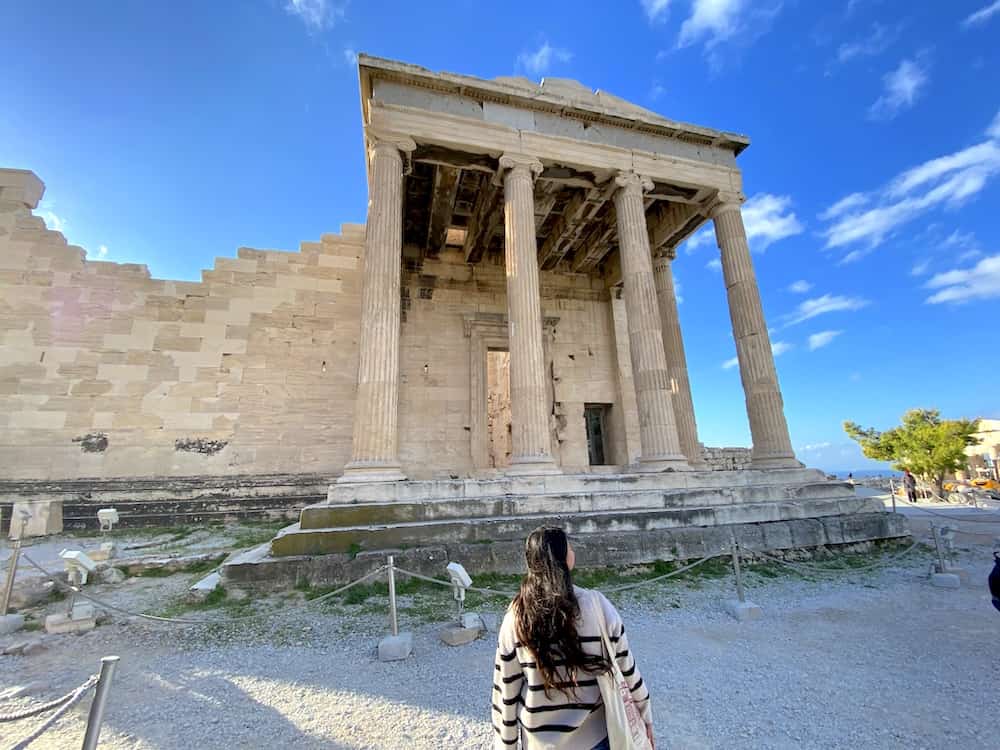
Everything in between is the spring and fall seasons which is the best time to visit Greece for fewer crowds, the weather is warm (but not too hot) and activities are still being offered to travelers.
Best Time To Visit Greece
“When is the best time to visit Greece?”
It’s a question we’ve asked ourselves when we planned on spending our honeymoon and a few months living in Greece over the years.
After our personal experience of visiting the mainland and the islands over different months in the year, we concluded:
There is a RIGHT and a WRONG time to visit Greece.
Here’s a few things to consider before visiting Greece and a general overview of what you can expect.
5x Things To Consider First Before Choosing
The weather can affect your experience in a place, especially as a traveler. In addition to that, there are so many other factors to consider when deciding the best time to visit a certain country.
The sunshine shouldn’t be the only thing on your mind, here are 5 things to think about:
- Price Fluctuations
- Activities/Tours
- On vs Off Season
Okay, that’s 6 things but they are all equally important when it comes to choosing a time to visit Greece. Ultimately, it’s up to you and the way you like to travel. Some things will bother other people but they might not affect you.
Matthew and I love visiting digital nomad destinations during the shoulder seasons, for example. When we did our 8-month stint across Europe, we avoided Paris, Amsterdam and Barcelona during the peak months. Instead, we went to lesser-known cities like Zagreb and Belgrade for July and August. That’s our personal preference because there are fewer crowds, it’s a calm vibe and that’s how WE like to travel!
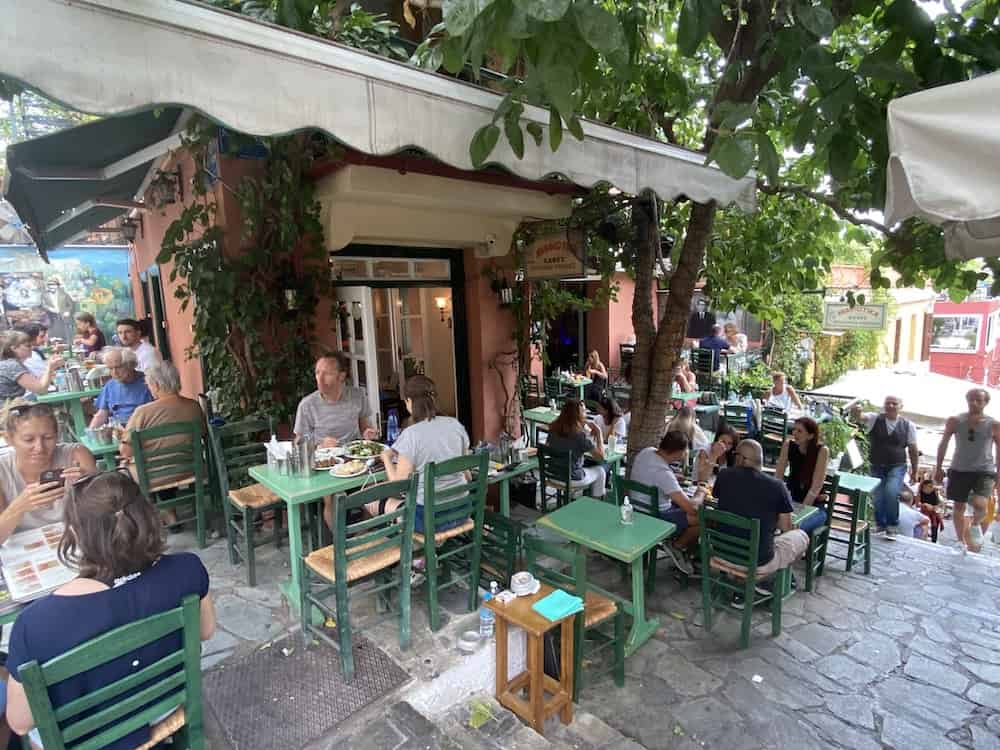
After our honeymoon in Greece, we knew we wanted to be digital nomads in Athens for a few months but we needed to pick our timing. We arrived in mid-September till early November! The weather was just fantastic and there were much fewer people around (up until it hit November then we got cold lol).
Maybe you aren’t like us and you don’t mind the crowds if it means you catch all the sunshine! The best time to visit Greece might be in the peak season because you just want the peace of mind that all activities and dining options will be open.
Struggling to know which is the best time? Ask yourself these questions to help decide:
- Which parts of the country do I want to visit (mainland vs islands)?
- How many activities do I want to do?
- Do crowds of tourists truly bother me?
- What kind of activities do I want to do?
- Does the humidity affect me?
- Are there any events I can’t miss?
The answer to these questions can help share when the best time to visit Greece is for you. Make sure you think of the kinds of activities you want to do and how you want to spend your time in Greece.
The Best Time To Visit Greece
If you want good weather, fewer crowds and affordable prices – the best time to visit Greece is May, June, September and October. The temperature during these months can range from 73°F (23°C) to 82°F (28°C). “It’s not too hot and not too cold. All you need is a light jacket!” as Ms. Rhode Island from Miss Congeniality puts it.
Visiting in the early fall (September, October), you could still jump in the ocean for a swim! Matthew and I visited the Greek islands in mid-October and we went for a couple of dips ourselves.
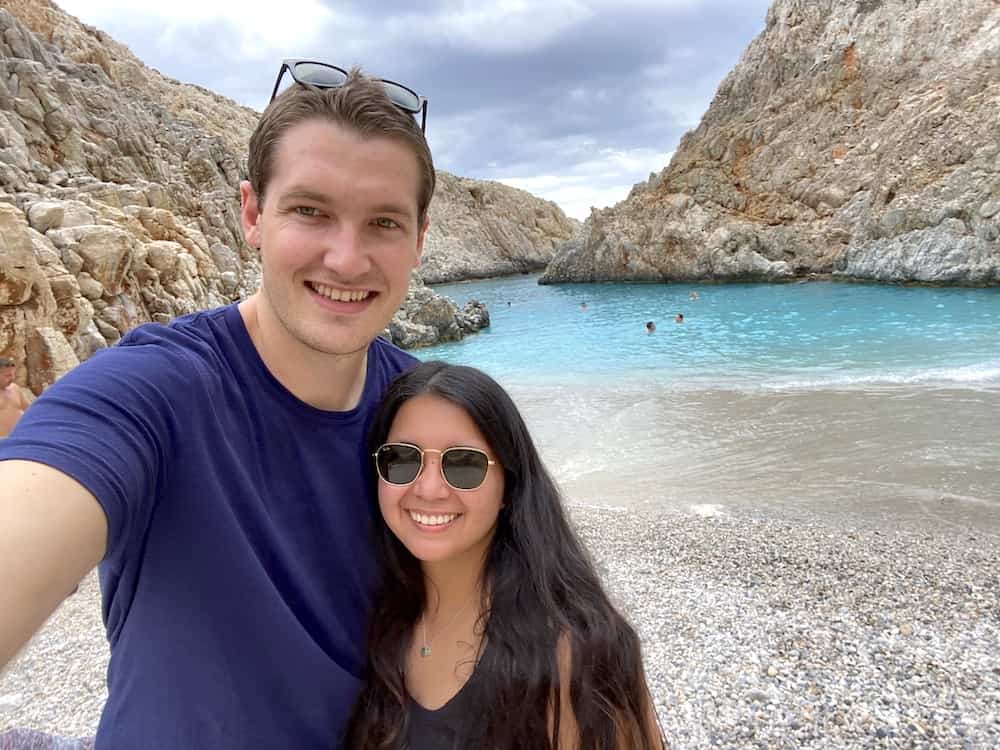
More than that, visiting Greece in the shoulder months also means you get better deals on accommodation and lower prices for activities. Most tourists visit Greece during July and August which is one of the most expensive times to visit! If you want to get good deals and value for money – this is going to be the best time for you too!
The downside to visiting Greece during the shoulder months is that a lot of the islands actually close during the low season.
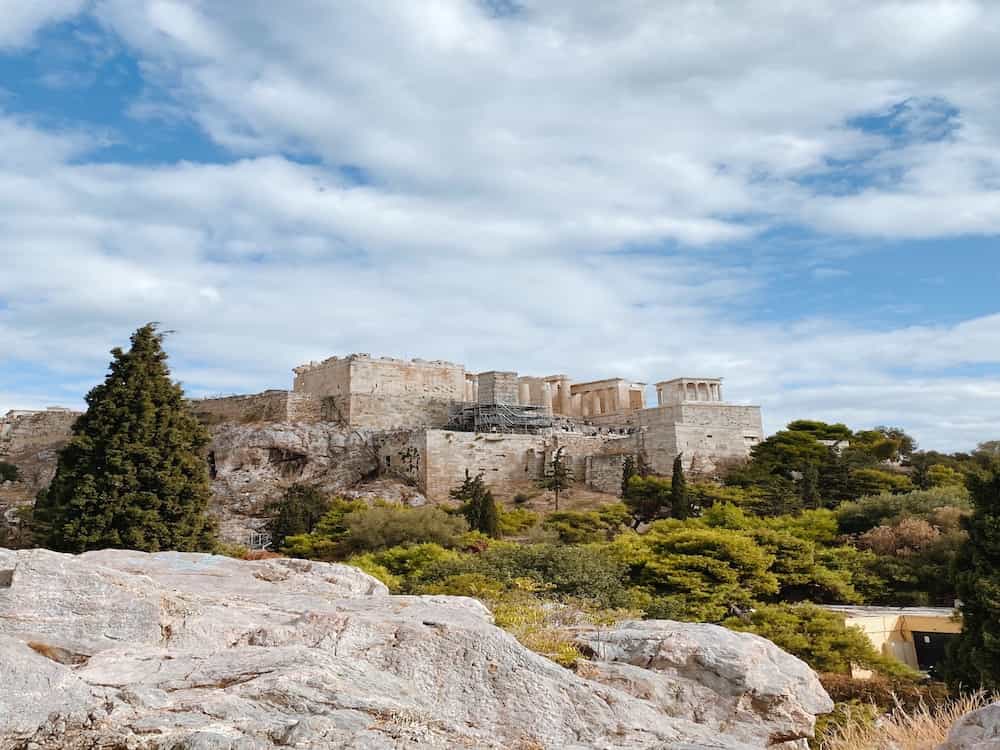
If you want to do all the activities and ensure all the bars, restaurants are open when you visit, the safest bet is to visit during peak season (July, August). However, the crowds can get very VERY overwhelming!
We visited Santorini in mid-October and the crowds were still pretty big at that time. If you visit during high season, you will be shoulder to shoulder with crowds of people, constantly fighting to reserve spots at bars and restaurants.
The Worst Time To Visit Greece
You could say, there’s never a bad time to visit Greece…
…but we aren’t so sure about that.
The worst time to visit Greece is July, August, December and January. During the peak summer months (July, August), you’ll have to constantly battle the crowds, line up for every restaurant and pay more for things. During the coldest winter months (December, January), there aren’t many tours or activities available during the lowest season in Greece. The temperatures also drop to 50°F (10°C). Most islands also tend to close during the winter!
Matthew and I visited Santorini near the end of October, we were lucky enough to book the very last Catamaran sunset tour of the season! We missed out on a couple of restaurants in Paros because they closed a tad earlier than low season. That’s going to happen if you visit but the tradeoff is that you don’t have to deal with huge crowds.
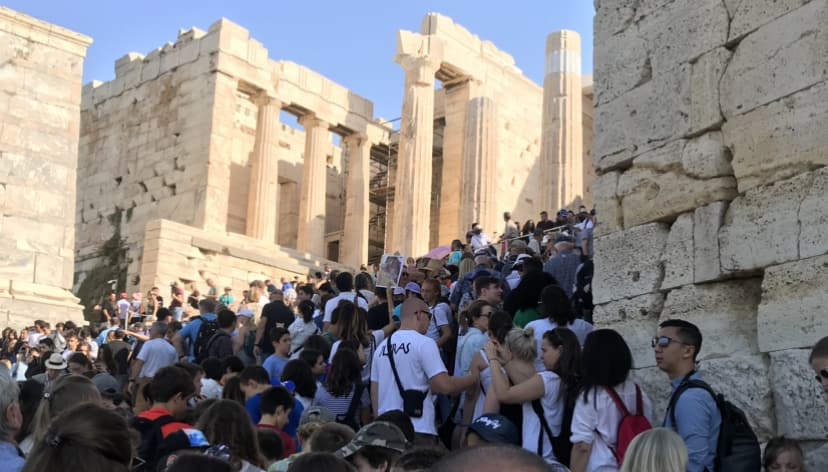
Greece attracts tourists from all over the world and it’s such an iconic travel destination – you have to expect big crowds. But we didn’t truly understand ‘big crowds’ till we saw it first-hand and it quickly becomes not-so-fun anymore.
However, it might just be worth it because you get great weather during your whole trip. Summers in Greece are pretty beautiful as everything comes to life that is until you continuously bump into people navigating the narrow streets of Athens, Santorini or other islands.
Temperature Year-Round In Greece
What’s the temperature like in Greece on average? The chart below shows the average temperature for each month of the year. The annual average temperature in Greece is around 68°F to 73°F (20°C to 23°C).
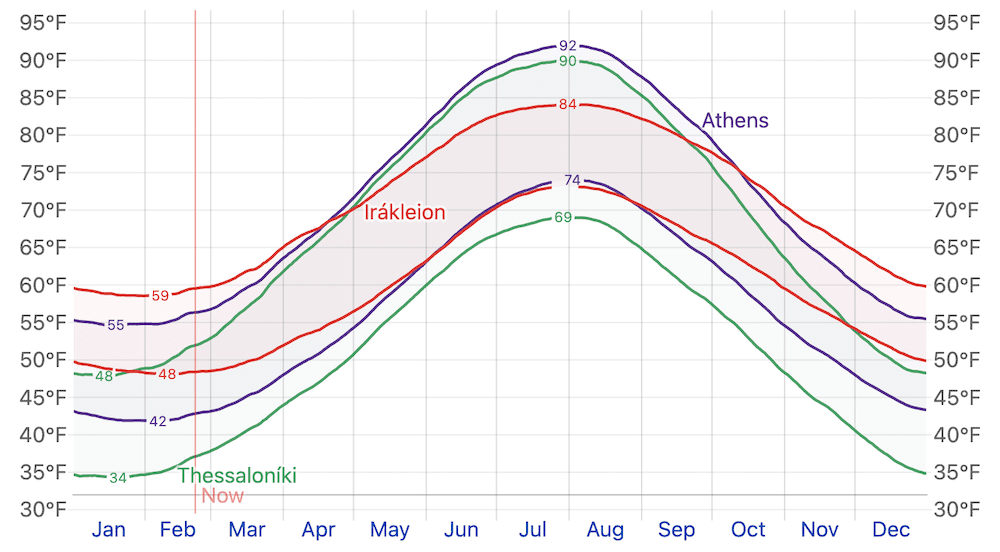
The reason Greece is such a popular destination (other than the food, history and stunning islands) is that the weather year-round is pretty great compared to other European countries like the Netherlands or France.
Precipitation Year-Round In Greece
The rainiest months in Greece are November and December. As the weather changes from fall to winter, it can start to get pretty wet having about 2-2.5 inches of rainfall.
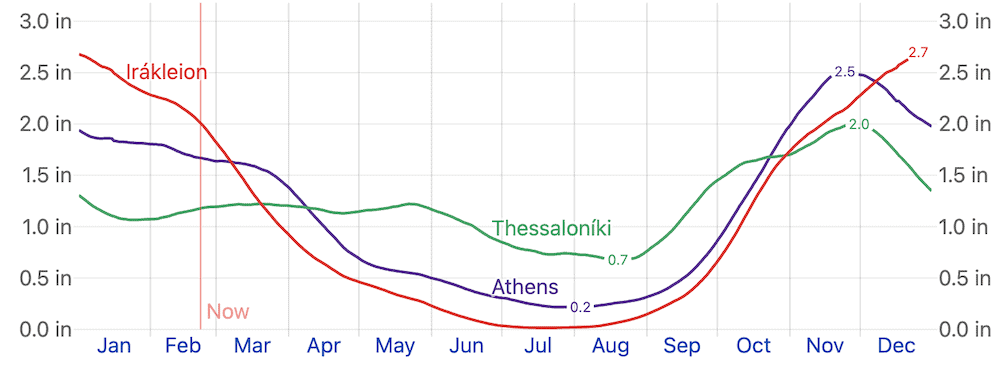
We were in Athens in early November and there wasn’t much rainfall for us. It obviously depends but the rain seems to start around late November. The months with the least rainfall are the peak summer months, July and August!
Weather Seasons In Greece
Greece is an amazing country with diverse landscapes, delicious Mediterranean food and so many cool things to do. There’s a reason why nearly 30 million visitors to Greece every year (pre-pandemic). That’s a whole lot of people!
Greece has the full 4 seasons – spring, summer, autumn and winter. Every season in Greece is beautiful in its own way. Here’s what Greek weather is like throughout the year and the best things to do for each season!
Spring in Greece (April – June)
The flowers are booming, the cities are emptier than usual and the days are getting longer. Spring is one of the best times to visit Greece to enjoy the outdoors, go on picnics and wander the city admiring the pink bougainvillea flowers all around.
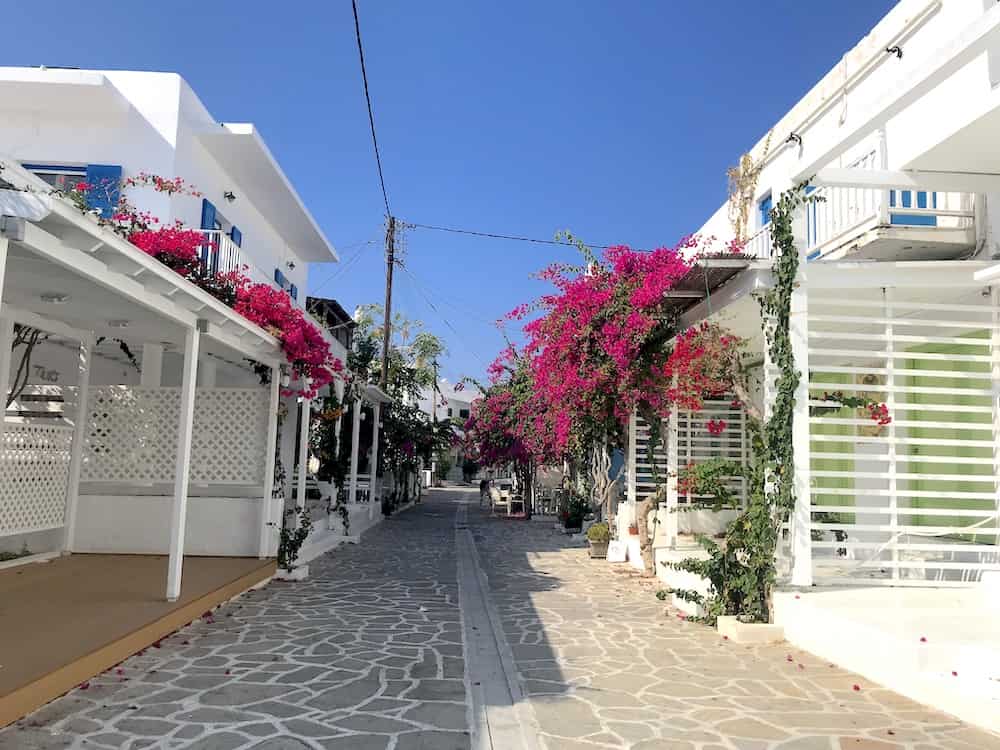
We suggest trying to visit later in the spring season for higher chance of things opening up. The islands tend to close in the low season so if you visit you might not get to do all the things on your bucket list!
Springtime in Greece also means that accommodation prices are going to cost less and more tourist activities are available at this time. If you want to save some money and have fewer crowds, the best time to visit Greece is going to be spring for you.
Summer in Greece (July – mid-September)
The sun is shining every day, there’s a buzz in the atmosphere and it’s the best time to jump in the blue waters of the Mediterranean Sea. Summer in Greece attracts the most amount of visitors (nearly 10 million total people) during July and August alone!
With huge crowds of tourists wanting to visit the same landmarks, it can get pretty overwhelming standing in line for the Acropolis for 30+ minutes. Prices also increase during the summer months for things like accommodation, tours and activities.

Summer in Greece can get very hot and steamy with temperatures rising to as high as 104°F (40°C). During these months, you’ll barely get any rain which means you can definitely plan all your activities without worrying about the rain ruining your day/
Autumn in Greece (mid-September – November)
Fall is one of my favorite seasons because the leaves begin to change, the huge crowds start to leave and still some of the best weather. Greece is no exception to having a great fall season!
The autumn season in Greece is part of the shoulder months that we suggest visiting. The skies are clear, there are fewer crowds, accommodation prices begin to drop and it feels like you can breathe again.
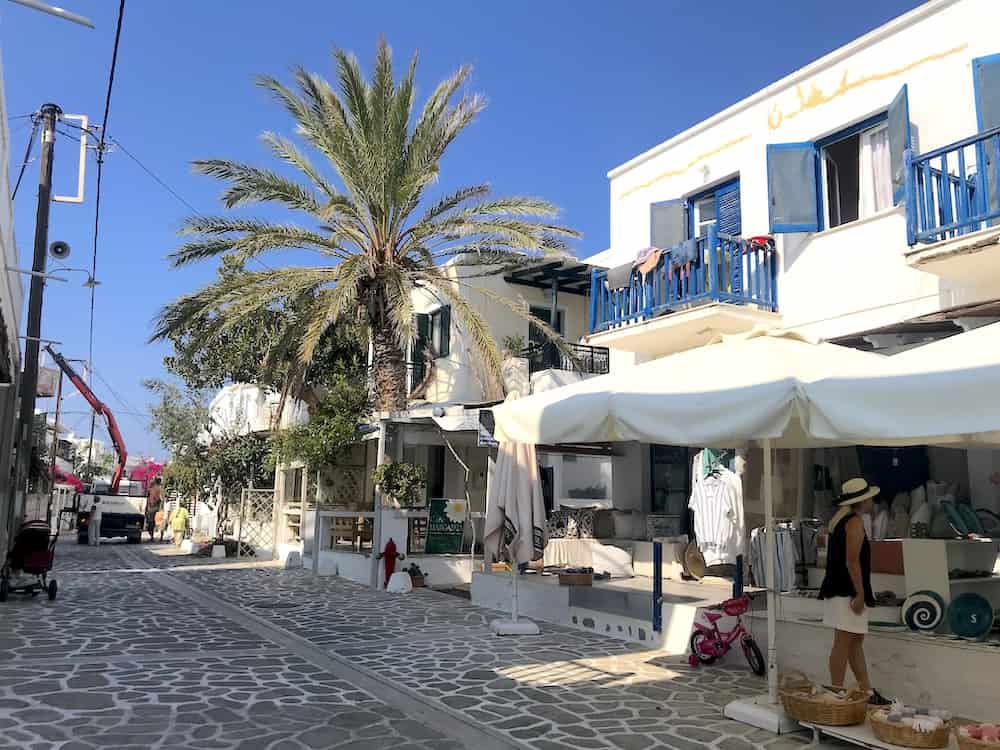
The weather in Greece during fall is around 77°F (25°C), isn’t that just perfect?! The only downside of visiting Greece in autumn is that things are starting to close down for the low season. You might not get all the opportunity to do the things you want but there are fewer crowds of people you’ll have to stand in line with for the Acropolis.
Winter in Greece (December – March)
Oh, winter…
…Some love it and some hate it! The cold is freezing, the sun is barely shining and it’s just a season to get through. Matthew and I literally chase the sun as digital nomads fleeing countries that get just a bit too cold.

Temperatures reach as low as 50°F (10°C) which isn’t actually too bad for a European winter. However, if you’re thinking you are going to jump in the blue waters – you might have to think again!
December is also the rainiest month in Greece. If you don’t like the cold or the rain can negatively affect your time, don’t visit Greece during the winter. On the other hand, it’s also the least crowded period season which means you won’t have to battle the crowds for any of the landmarks or activities.
FAQs – The Best Time To Visit Greece
Got some more questions about the best time to visit Greece? I would too 😉!
Here’s some quick frequently asked questions to help guide your decision on when is the best time for you to visit.
When Is The Best Time To Visit Mainland Greece?
The best time to visit mainland Greece is any time of the year. Lots of the major attractions don’t close as they do on the islands. Restaurants, cafes and bars will stay open throughout the year, too! It’s up to you whether you want warm weather or cold weather.

The top destinations on the mainland are Athens, Thessaloniki and Meteora. If you’re trying to decide between the 2 cities, we’ve written a guide on choosing between Athens vs. Thessaloniki !
These cities have similar weather throughout the year. We visited Thessaloniki in mid-October and it was already pretty cold compared to when we were in Athens in mid-October, the year before! In our experience, Thessaloniki got colder much earlier in the year.
Best Time to Visit the Greek Islands?
One of the best ways to figure out the best time to visit the Greek islands is actually to figure out the kind of activities you want to do. A popular reason to visit the picturesque islands is to swim in the clear, blue glimmering waters.
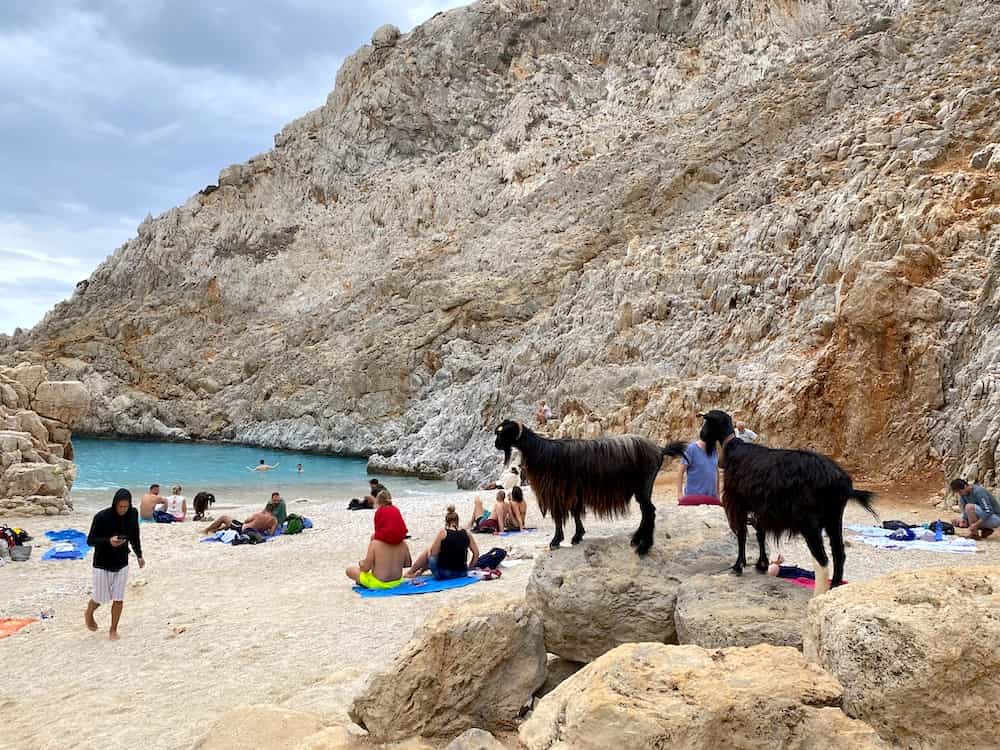
The best time to visit the Greek islands is the summer season. You can’t beat getting into the refreshing water when it’s super hot and steamy out!
If it’s 50°F (10°C), the chances are pretty low you are going to be laying down your beach towel and jumping in the water. If you want to visit the Greek islands, don’t go in the early spring, winter and late fall seasons.
Most Popular Time to Visit Greece?
The most popular time to visit Greece is during the summer season, specifically the month of August. Lots of Europeans have vacation days in August, making it one of the top destinations for a week or weekend getaway. We would avoid Greece in August due to the massive crowds but it’s also the hottest month of the year!
Least Crowded Time to Visit Greece?
Hate crowds? Us too! The least crowded time to visit Greece is the low season (December, January, February). You won’t be shoulder to shoulder with other tourists and the lines for major attractions will be much less in the winter. But that means it’s cold so there’s that too.
Cheapest Time to Visit Greece?
Looking to visit Greece on a budget? We have seen some insane price cuts if you visit during the low season in Athens, Thessaloniki and even the islands. The cheapest time to travel to Greece is the winter season (December, January, February).
Best Time to Visit Greece For A Honeymoon?
You’re honeymooning in Greece? What a dream!
Matthew and I also spent our honeymoon across Greece in Athens, Paros and Santorini! We went during the shoulder month of October which we loved for several reasons – fewer crowds and more value for money. But we did miss out on some restaurants that closed early for low season. So if we had to choose again?

The best time to visit Greece on your honeymoon is September. The huge summer crowds have left and it’s a lot quieter in the city/islands. The sunny weather is still going strong in September and a lot of the tourist activities (restaurants, bars and tours) are still available to book.
Bottom Line: When Is The Best Time To Visit Greece?
The best time to visit Greece is during the shoulder season months of May, June, September and October. You still get to enjoy beautiful weather, have fewer tourist crowds around and it’s going to be much more affordable!
We love visiting Greece – I mean we have been 3 times in the last 4 years! But…we will avoid Greece in the peak season months of July and August because we do not want to deal with such huge crowds of people.
Greece is a stunning travel destination for any kind of travel experience you could be looking for. The most important thing is that you just visit Greece whenever you have the opportunity!
Sunday Suitcase Newsletter
A newsletter for digital nomads! Each Sunday you'll receive an email with the latest nomad news, digital nomad lifestyle tips, new destination guides and work online tips to ease you into your week.
You’ll Also Love

International Health Insurance vs Travel Insurance: What’s The Difference?
Say hi on instagram.
Follow The Journey In Real-Time @ TwoTicketsAnywhere_

- DIGITAL NOMAD
- WORK ONLINE
- DESTINATIONS
A newsletter for digital nomads! Each Sunday you'll receive an email with the latest nomad news, digital nomad lifestyle updates, new destination guides and work online tips to ease you into your week.
- PRIVACY POLICY
Copyright © 2024 Two Tickets Anywhere

The Best Time to Visit Greece for Good Weather, Fewer Crowds, and Affordable Prices
Greece, a land where ancient history seamlessly intertwines with modern life, offers a unique vacation experience that caters to various interests. Its epic intellectual history and stunning natural beauty make it a compelling destination.
Key attractions include the Acropolis of Athens, with its iconic Parthenon and other ancient monuments, and the mythologically significant sites of Crete, Olympia, Samos, and Naxos.
Greece’s landscape is diverse, ranging from the magnificent rock formations of Meteora to the chestnut forests of Nafpaktos. For outdoor enthusiasts, Greece’s varied landscapes offer ample opportunities for activities like kayaking, sailing, windsurfing, hiking, and cycling.
As for the climate, Greece enjoys a Mediterranean climate along its coasts and islands, characterized by hot, dry summers and mild, wet winters. The southern regions and islands tend to have milder winters compared to the colder ones in Northern Greece.
A vacation in Greece is not just a journey through its scenic landscapes and beautiful beaches but also an exploration of its rich history and culture.
Best Times to Visit Greece for Good Weather
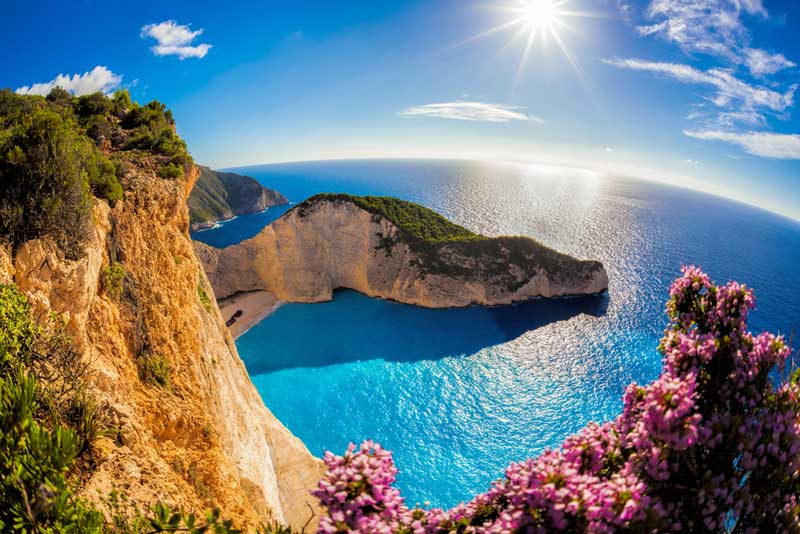
The best time to visit Greece for good weather spans from late spring to early autumn. Specifically, the end of April through June, and September to early October, offer the most ideal weather conditions. During these months, you can enjoy warm, sunny days with temperatures around 24°C (75°F), perfect for outdoor activities and exploring the scenic beauty of Greece.
The weather in May and June is particularly delightful, with clear blue skies and sunshine-filled days, making it a great time for sightseeing and enjoying the outdoors. Temperatures average around 70°F in May and 75°F in June. September also offers beautiful weather, with temperatures averaging around 82°F, ideal for beach activities and outdoor exploration.
Late May to mid-June and late September to mid-October are also recommended for Greek island hopping, as you can enjoy warm days suitable for swimming and fewer crowds compared to the peak summer months. During these shoulder seasons, you can expect fewer tourists, more pleasant temperatures, and potentially lower costs for accommodation and activities.
Best Times to Visit Greece for Smaller Crowds

The best times to visit Greece to avoid large crowds are during the late spring (May) and fall (September to October). These periods offer pleasant weather, minimal rain, and fewer tourists, making them ideal for a more peaceful experience.
During these periods, visitors can enjoy Greece’s iconic destinations like Athens, Santorini, and Mykonos with less congestion. This allows for a more leisurely exploration of historical sites such as the Acropolis, the Parthenon, and other ancient ruins without the crowds typical of the summer months.
Late spring, especially May, is a time when the country begins to warm up, offering a comfortable climate for outdoor activities and sightseeing. The natural beauty of Greece, from its idyllic islands to its scenic mainland, is in full display during this time, making it ideal for photography, hiking, and beach visits.
Similarly, the fall months, particularly September and October, provide a respite from the summer heat while still maintaining a warm and inviting climate.
However, travelers should be aware of national holidays and local festivals during these times, as they can temporarily increase local crowd sizes. Planning around these events can ensure a more serene travel experience.
Best Times to Visit Greece for Lower Prices

The best times to visit Greece for lower prices are during the spring, autumn, and winter months. During these seasons, you’ll find that accommodation costs are generally more affordable.
For instance, in popular destinations like Santorini, prices for accommodation can be significantly lower in March, April, or October.
Winter, despite being the off-season, can also offer unique experiences in places like Santorini, albeit with some limitations like fewer sailing tours and shorter daylight hours.
Best Time to Visit the Greek Islands
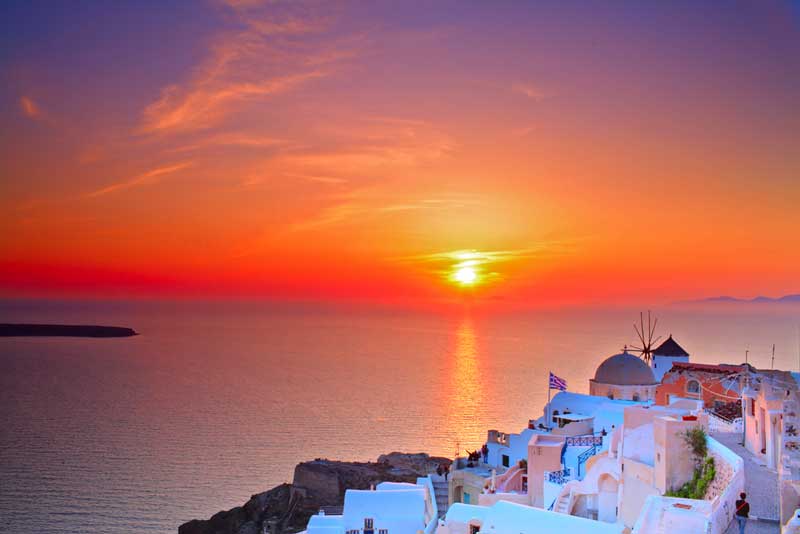
The best time to visit the Greek Islands depends largely on what you’re looking for in your vacation. For pleasant weather and fewer crowds, late April, May, June, September, and early October are ideal.
These months offer sunny days and long daylight hours, with most businesses open, especially from early June onwards. While accommodation prices are slightly higher than in the shoulder months, it’s still possible to find good deals.
The peak tourist season on the Greek Islands is in July and August. During this time, temperatures often exceed 30°C (86°F), making it perfect for beachgoers. However, be aware of the Meltemi winds, particularly in the Aegean Islands, which can make beach activities challenging. These months also see the islands at their busiest, with a lively atmosphere and many cultural events.
For many repeat visitors, September is considered the best month to visit. The sea temperature is still warm, and the tourist crowds have significantly thinned, offering a more relaxed experience.
If you’re considering a trip in the off-season, winter offers a very different experience. While it’s much quieter and the landscapes can be beautiful, many businesses on the islands close down, and ferry connections are limited. Larger islands like Crete, Rhodes, Corfu, or Kos might offer more activities during this time.
Worst Times to Visit Greece

The worst times to visit Greece generally include the peak summer months of July and August, and the coldest winter months of December and January.
During July and August, Greece experiences extremely high temperatures and humidity, making it uncomfortable, especially in crowded cities like Athens. These months also see the highest number of tourists, leading to overcrowded popular destinations, long queues, and higher prices for accommodation and activities.
In contrast, the winter months, particularly December and January, are the least favorable for those seeking a warm, beach-centric holiday. Additionally, many islands and tourist attractions either shut down or operate with reduced hours, limiting the availability of tours and activities.
However, it’s important to note that preferences vary, and what might be the worst time for one traveler could be suitable for another. If you prefer cooler weather and fewer crowds, the winter months might be appealing.
On the other hand, if you don’t mind the heat and crowds and want to experience Greece at its most vibrant, the summer months could be ideal.
Final Thoughts
The best time to visit Greece largely depends on personal preferences and the type of experience you’re seeking.
Whether you’re looking to bask on sun-kissed beaches or explore ancient ruins in peace, timing your visit to Greece can significantly impact your experience. Consider what you want from your trip to decide when is best for you.
Best Time to Visit Greece and Greek Islands
Greece › Best Time To Visit Updated: February 28, 2024 By Santorini Dave
• Where to Stay in Athens • Where to Stay in Santorini • Where to Stay in Mykonos • Where to Stay in Naxos • Where to Stay in Paros • Where to Stay in Crete • Where to Go in Greece
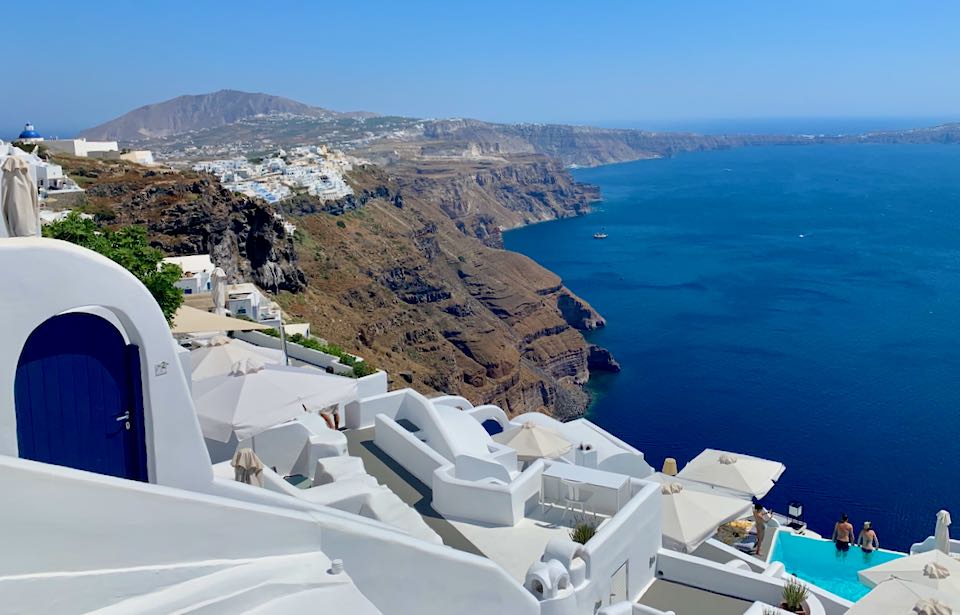
My favorite time to visit Greece is in June and September when the Greek islands are at their best. May and October are great if you’re less interested in beaches and more focused on sightseeing and historic attractions.
When’s the Best Time To Visit Greece and the Greek Islands? I recommend visiting Greece from late April to early November when there is lots of sunshine and little rain. The best months for swimming and sunbathing on the Greek Islands is from late May to early October . July and August are the busiest and most expensive months but are also the best for nightlife and beach parties. March to November is great for sightseeing (though July and August can be very hot when touring exposed historical sites, especially in Athens). My son and one of his friends during a summer visit to the Greek islands. May and June : During May and June, Greece experiences spring, with mild to warm temperatures, blooming flowers, and lush landscapes. The weather is typically sunny, with occasional rain showers. I love visiting in May and June for sightseeing, exploring archaeological sites, and outdoor activities like hiking and cycling. The islands and beaches are less crowded compared to the peak summer months, making it an ideal time for a more relaxed vacation. Accommodation prices are also more moderate. July and August : July and August (along with late June and early September) are the peak tourist season in Greece, with hot temperatures, sunny days, and large crowds at popular destinations. The islands, beaches, and coastal areas are bustling during this time, and accommodation prices are higher. While I love the summer months for beach and swimming, it can be overwhelming for those interested in sightseeing or looking for a more tranquil experience. September and October : September and October have warm temperatures, fewer crowds, and more affordable accommodations. The sea remains warm for swimming, and the weather is generally sunny and dry. I recommend this period for exploring the islands, visiting historical sites, and taking in the outdoors.
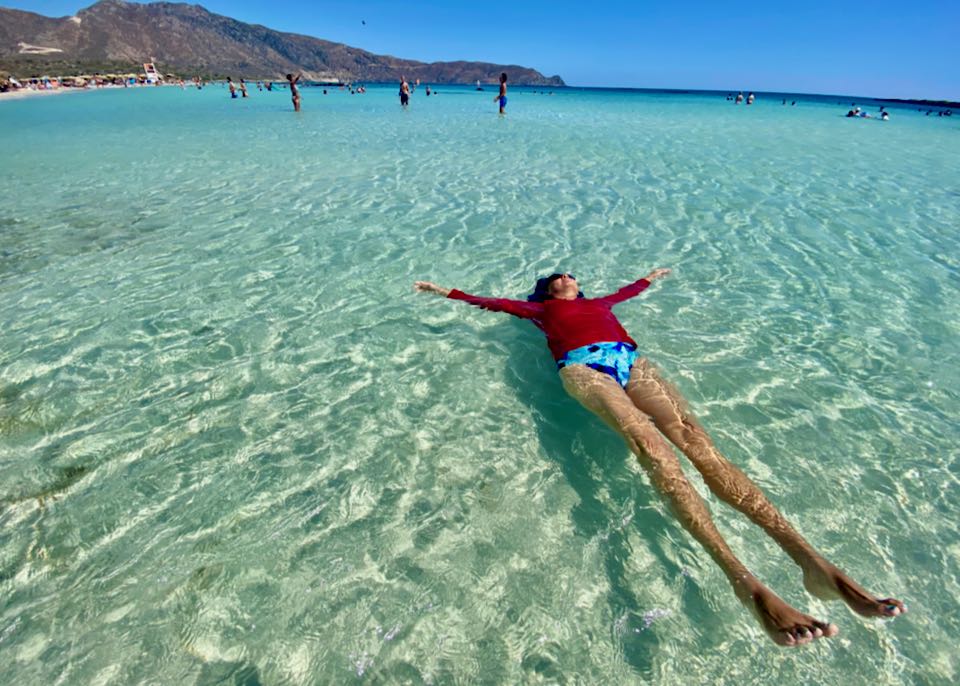
The best time to visit the Greek Islands for beaches, swimming, and water sports is from late May to early October.
When I Like to Visit Greece Best Time to Visit Mykonos : June to September Best Time to Visit Santorini : April, May, June, September, October, early November Best Time to Visit Crete : June and September Best Time to Visit Rhodes : June and September Best Time to Visit Naxos : June to September Best Time to Visit Paros : June to September Best Time to Visit Ios : July and August Best Time to Visit Athens : April, May, October, and November Best Time to Visit Corfu : June, July and September Best Time to Visit Nafplio & Peloponnese : June and September Best Months for Greece and the Greek Islands?

The best beaches and beach clubs in Mykonos are at their best from June to September.
Best Time to Visit the Greek Islands : The Greek islands are at their best from late May to early October for swimming, suntanning, and beach weather; and from April to early November for sightseeing, hiking, and exploring. A good travel itinerary for Greece should consider the weather patterns of the Greek islands. Best Time to Visit Athens : Athens is a good year round destination. Moderate weather and fewer tourists makes winter a great time for seeing the real Athens. Summer is hot but the skies are always blue, there’s almost no rain, and bars and restaurants fill the sidewalks with tables and chairs. Spring and Fall are the best of both worlds: good weather, smaller crowds, and a fun active atmosphere. Best Time to Visit Greece for Good Weather : For first-time visitors, good weather is usually the most important factor and the warmest weather in Greece and the Greek islands is between late May and early October when it’s sunny, warm, and the water is good for swimming. Water temperature increases throughout the summer months. The sea will be cool for swimming in May (even though the weather can be beautiful). The water is warmest in August and early September. Swimming in early May and late October is often possible but can’t be guaranteed. Best Time for Greek Beaches : If you hope to enjoy hanging out on the best beaches in Greece and swimming in the sea, the best time to go to Greece is June, July, August, and September. Best Time for Sightseeing : The best time for sightseeing in Greece is generally April through about mid-May, or October and into early November, when there will be fewer tourists to interrupt the views and the weather is frequently quite mild; perfect for walking, but usually a bit too cool for swimming at the beach (with the exception of early October). Best Time For Mountain Hiking : April and May are wonderful months for hiking in the mountains, with the green landscape blanketed with colorful wildflowers and the weather often ideal for the trek. October is another good time, when summer’s sizzling temperatures begin to cool and the autumn foliage is at its peak, transforming the mountains with the vibrant hues of fall. Best Time for Saving Money : Hotels are much cheaper in the low season (December to March) and shoulder season (April, May, October and November) than in the summer months. Transportation, food, and drink prices tend to stay the same all year long so there’s little savings in that regard. If you want good weather but cheap hotels, then late May, early June, late September, and early October are the great times. There are no guarantees, but the first three weeks of October can often surprise visitors with great weather. Best Time for Nightlife and Parties : Mykonos, Paros, Ios, and Santorini have the best nightlife, and if you’re looking to party, dance, and listen to live DJs then July and August are the main months. On Mykonos, late June and early September are also good. On Santorini, there’s good nightlife from late May until early October. Best Time for a Honeymoon in Greece : If you want a beach holiday then June to September is best. If you’re more interested in quiet, solitude, sightseeing, and romance, then anytime from April to early November would be great. Is August a Good Time to go to Greece? : One of the most common questions I get relates to traveling in Greece in August. If you want nightlife, packed bars, and live DJs then this is the best time to visit Mykonos (and Ios, Santorini, and Rhodes to a lesser extent). Yes, August is busy but even at the peak of the tourist season on the busiest islands, if you want to escape the crowds it’s usually a short walk or bus ride to some very quiet and tourist-free spots. Greek Travel Guides Athens Travel Guide Crete Travel Guide Mykonos Travel Guide Naxos Travel Guide Paros Travel Guide Santorini Travel Guide Greece Travel Guide Greece Weather by Month
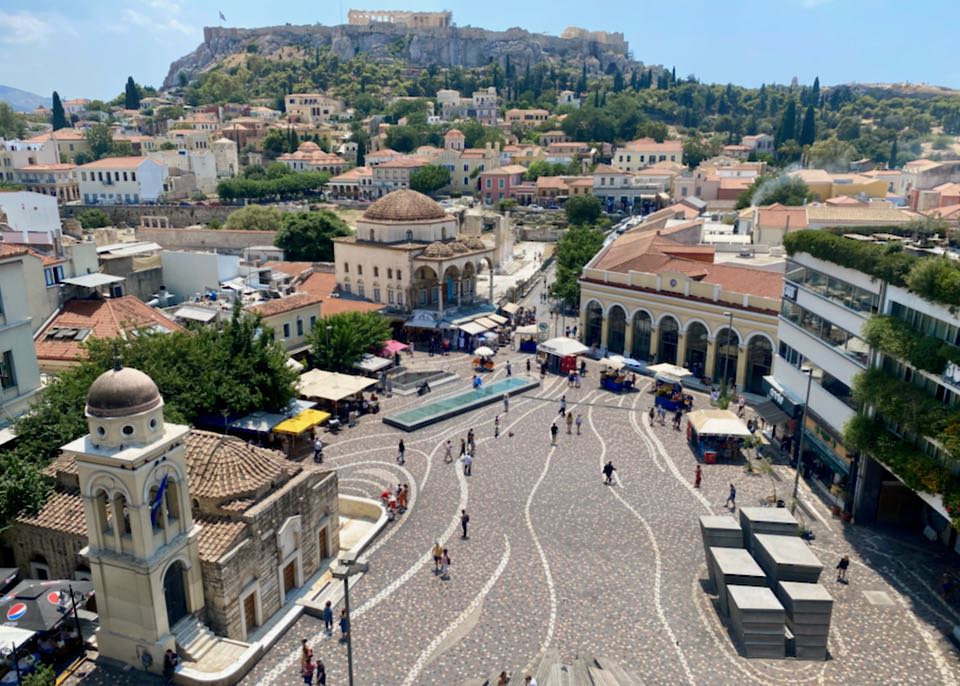
Athens is filled with iconic historical sights that are easily enjoyed anytime of year. (Especially the indoor Acropolis Museum.)
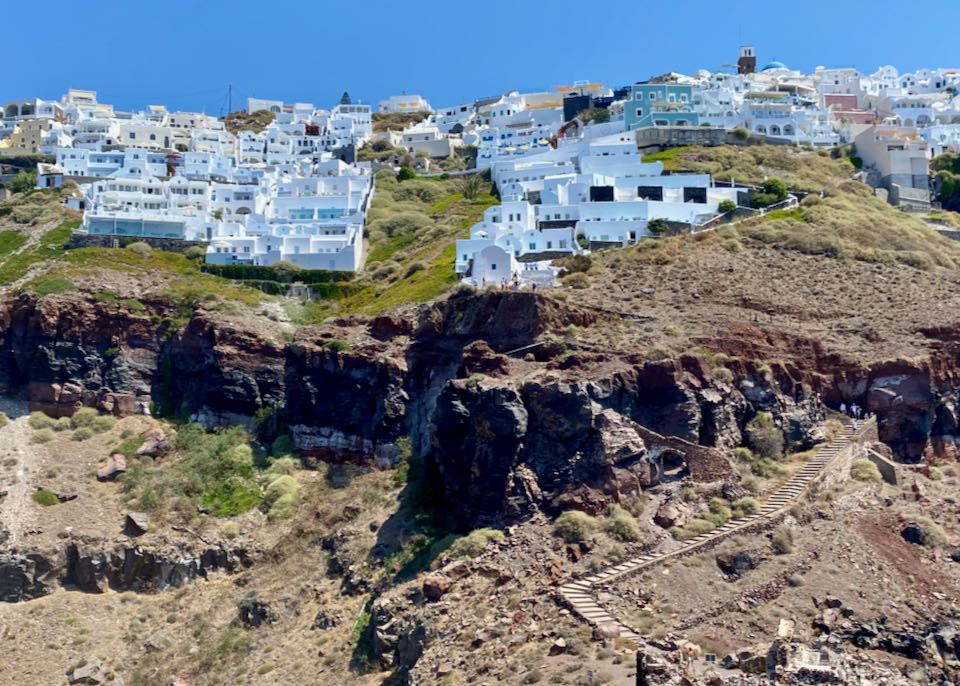
Santorini is loaded with great tours and sightseeing so has a longer tourist season than other Greek islands. If you’re interested in non-beach activities then Santorini is great from April to early November. And if you can tolerate some rain and cloud then Santorini should be considered a year-round destination.
Greece Events and Festivals
Greece in january.
- New Year’s Day/Saint Basil’s Day – January 1 is a national holiday, celebrating both New Year’s Day and Saint Basil’s Day in Greece. Saint Basil is the Greek equivalent of Santa Claus, therefore the day is similar to Christmas Day in North America, with gift giving. A special cake is often made with a coin in it as well, known as vasilopita, and whomever gets the piece with the coin is said to have good luck. The day in general is considered a lucky time, and there are often card games that go on for hours, mostly at home, but also in coffee shops and clubs.
- Ephiphany – Epiphany is celebrated on January 6th in many places throughout Europe, including Greece, a time when the Blessing of the Waters takes place. A cross is tossed into a lake, river or the sea, and retrieved by swimmers who get good luck in return. There is usually a ceremony, and it’s particularly elaborate in the port of Piraeus.
- Patras Carnival – The Patras Carnival is the biggest festival of the year in Greece, and one of the largest in Europe too. Purely of Italian origin, it includes elaborate festivities with parades, street music, dancing, balls, treasure hunts, and more. It begins in mid-January and runs through mid-February every year.
Greece in February
- Carnival – In addition to the Patras Carnival, other Carnivals are hosted through Greece, mostly in February, typically three weeks before the beginning of Lent. Some of the best festivities can be enjoyed in Athens, Skyros, Chios, Lamia, Crete, Heraklio, Zante, and Naousa. Except to find lots of drinking and feasting, costumes, parades, dancing, marching bands, and more.
- Clean Monday – One of the most important feasts throughout Greece, Clean Monday takes places on the first day of the seventh week before Easter Sunday, also marking the end of the Carnival celebrations. A public holiday, it includes outdoor excursions, consuming shellfish, and often building and flying kites.
Greece in March
- Independence Day and the Feast of the Annunciation – These two holidays are celebrated simultaneously on March 25. The streets fill with all sorts of festivities and parades. Due to the holiday, some sites may be closed and streets are sometimes blocked as well.
Greece in April
- Holy Week and Easter – Holy Week is celebrated from Palm Sunday to Easter Sunday, sometimes falling in late March, but most often it’s in April. In 2022, April 24 is Easter Sunday, and Holy Week is April 17 through April 23. For Greeks, Easter is the biggest religious holiday of the year. During Holy Week, many shops have special hours and there are church services every evening. Just before midnight on Saturday, many Greeks gather at church with Easter candles, and just before midnight the lights are switched off, representing Jesus’ death, just before the priest announces that “Christ Has Risen.” That’s followed by kisses, cheering and fireworks. On Easter, friends and family gather for a big feast.
- Athens International Film and Video Festival – This festival in Athens brings some 250 films and video and includes experimental, narrative, short-form, feature length, and documentary films from around the world.
- The Feast of Saint George – The Feast of Saint George (Agios Georgios Day) is an important rural celebration on April 23rd each year that includes feasting and dancing, with the festivities taking place where Saint George, the patron of the shepherds, is considered the patron saint. Some of the best are held in Skyros, Skiathos, and Arachova.
Greece in May
- May Day/International Workers’ Day – May 1 is May Day and International Workers’ Day in Greece. Major strikes and/or protests as well as parades may be scheduled on this day, popularized by the Soviet Union as a holiday for workers. For May Day, flower festivals are common as it falls during the peak of flower season. Most monuments, museums, attractions, and some shops will be closed, though most restaurants will be open.
- Salsa Spring Festival – One of Europe’s top dance events, the Salsa Spring Festival features some of the best dance instructors and performers from around the world along with top local artists in late May in Loutraki, Korinthia.
- Athens Jazz Festival, Athens, Greece – The city of Athens hosts the annual Athens Jazz Festival, considered one of the best festivals of its kind in Europe. It takes place over five days in late May and showcases European as well as international artists; entrance is free.
Greece in June
- Athens and Epidaurus Festival – The biggest summer festival of the year, this festival showcases dance, theater, music and opera at the Odeon of Herodes Atticus beneath the Acropolis, as well as music and drama at the Theater of Epidaurus. It runs from mid-June through early September.
- European Music Day – European Music Day is a national event celebrated in some 50 cities across Greece for five days starting on summer solstice, June 21st. It includes 350 events that are hosted at over 200 venues, including parks, gardens, squares and archaeological sites, by music ensembles, philharmonic and symphony orchestras, choirs, and dance groups.
- Miaoulia Festival, Hydra – This festival on Hydra commemorates the life of Admiral Miaoulis who played a key role in the Greek War of Independence. It features parades, art shows, circus acts, dance performances, and more.
- Navy Week – Navy Week honors the country’s long relationship with the sea in late June. Ports and fishing villages throughout Greece host parties and historical re-enactments. Crete offers a big celebration with sailing, swimming, music and dancing.
Greece in July
- Puppet Festival, Hydra – This annual puppet festival is hosted in Hydra in early July and draws puppeteers from around the world.
- Sani Festival, Kassandra, Halkidiki – This festival based at Sani Resort begins in mid-July and runs through mid-August. It features film screenings, classical music concerts, and avant-garde theater acts.
- Philippi Festival, Kavala – This event is hosted at the ancient theater of Philippi in Kavala, a northern Greece city, starting in mid-July and running through late August. It showcases music and theater presented by talented young artists.
- Hippocratia Festival, Kos – Hippocratia is actually a number of cultural events that take place to honor the traditions and customs of the island of Kos starting in July and running through October. There are classical and traditional music concerts, theatrical performances, art exhibitions, and more.
Greece in August
- International Music Festival of Aegina – This annual event features music complemented by the sounds of the waves on Avra Beach, and other spots around the island of Aegina throughout most of the month of August.
- Olympus Festival, Mount Olympus – The Olympus Festival includes plays that are performed at the restored ancient theater throughout August.
- Chania Rock Festival – This festival, hosted in the old city of Chania on the island of Crete during the first half of August, showcases a variety of Greek and international performers, up-and-coming artists, and rock bands.
- Houdetsi Music Festival – Held annually for four days in August in the village of Houdetsi on Crete, this festival features a mix of music from across the globe.
- Feast of the Assumption of the Virgin – August 15th is an important day of religious pilgrimage, a feast that celebrates Mary’s ascent to heaven. As many Greeks return home to visit, travelers may have a difficult time finding a room. It’s especially elaborate in Tinos, when thousands arrive to participate in the all-night vigil at the cathedral of Panagia Evangelistria.
Greece in September
- International Music Festival, Santorini – The International Music Festival of Santorini is held over the first three weeks of September in the heart of Fira village. It features top artists from around the world, including classical and tango music, solo recitals, orchestras, operatic music, and piano duets.
- Pistachio Festival, Aegina – Hosted annually over four days in mid-September, the Pistachio Festival features all things pistachio, with a variety of pistachio products for sale as well as concerts, plays, exhibitions, and gastronomy nights.
- Festival of Tastes and Traditions, Rhodes – Taking place annually over two days in mid-September in the village of Pefkos, this festival includes wine tasting, live cooking demonstrations, exhibitions of traditional products, traditional music and dancing, a parade, and more.
Greece in October
- Chestnut Festival Elos, Crete – The Chestnut Festival is celebrated annually, typically over the last weekend of October in the village of Elos. It includes roasted chestnuts and other foods, traditional folk music, dancing, and drinking.
- Dimitria Festival, Thessaloniki – Held on October 26th each year, this festival showcases music, ballet, and opera.
- Oxi Day – This is a feast day party and a national holiday that includes military parades, folk dancing, folk music and parades on October 28th each year to celebrate the nation’s refusal to yield to the powers of the Axis in 1940.
Greece in November
- Feast of the Archangels Gabriel and Michael – Churches throughout Greece named for these archangels will host ceremonies on November 8th.
- Anniversary of the Polytechnic Uprising, Athens – This November 17th holiday commemorates the anniversary of the student uprising in 1973 at Polytechnic University in Athens, which killed many students when tanks crashed into the university gates. There is a march and stoning of the American Embassy, making it best to avoid that area on that day.
- Saint Andreas Name Day, Patras – As Saint Andreas is the patron saint of Patras, this city hosts a big celebration honoring the saint annually on November 25th. It begins the evening before with mass which continues into the morning, followed by a parade.
Greece in December
- Feast of St. Nikolaos/St. Nicholas – This annual December 6th feast honors the patron saint of sailors through multiple processions which head to the sea, and to chapels that are dedicated to him.
- Kladaries, Kozani – Annually on December 23, the Kladaries commemorates the shepherds who lit bonfires to announced the birth of Christ. In the village of Siatista, residents gather together to light fires and dance around them while enjoying the local wines.
- Christmas Day – December 25th is a public holiday, and although it’s not considered as important as Easter in the Greek Orthodox religion, it’s celebrated with feasts and religious services, as well as gift giving, Christmas caroling, trees, and decorations.
- New Year’s Eve – December 31st, New Year’s Eve, in Greece is traditionally celebrated by children singing carols outside while elders talk, play cards, eat, drink, and smoke. Today, most people celebrate the way the night is celebrated throughout the world, going to bars, attending parties, and watching fireworks displays that are hosted in the central squares of many cities throughout Greece.
- Best Hotels on Santorini
- Best Hotels on Mykonos
- Best Hotels on Crete
- Best Hotels on Rhodes
- Best Hotels on Naxos
- Best Hotels on Paros
- Best Hotels on Ios
- Best Hotels on Milos
- Best Hotels on Sifnos
- Best Hotels on Folegandros
- Best Hotels in Athens
- Best Tours & Things To Do in Santorini
About Santorini Dave

Hi Dave! Besides Crete, which other islands would you recommend visiting in May on a 10 day trip?
With just 10 days I would not do more than one other island. Santorini is the closest island to Crete and has the most ferry connections with Crete. It’s also a great island – so that would be my first choice. Naxos and Paros would also be good reasonable choices.
Holy Week in Greece
I am going to be in Greece (Athens & Santorini) during part of Holy Week (18 Apr to 24 Apr) and trying to sort out the best timing for my locations.
It will be a short trip and I need to fit in as much as I possibly can. Due to traffic and other holiday considerations (limited hours for museums, shops), do you recommend doing my relaxing in Santorini over Easter weekend and then my busy sightseeing in Athens afterward? Or vice versa? I would prefer to avoid big crowds wherever possible, but if there are things worth seeing in Athens that particular weekend, then I would definitely consider it.
Love your site! Thanks!
Greek Easter is usually a different date than western Easter. This year it’s April 28 for the Greek Orthodox, so you won’t be there during Easter at all.
We are thinking of going to Crete in late November (in the next few weeks). We have never been to Greece and would like to experience some authentic island life. I understand that Crete is likely the warmest of all the islands at this time of year. We are in our late 50’s and fit. We love food, wine, music, scuba diving (thinking it would be too cold to dive now… yes?), history. Can you suggest some activities that we could do/ experience in Crete at this time of year? Thank you in advance. Cheers, Wendy
Yes, it will be too cool for swimming and diving but Crete is a great off-season destination. There are 3 medium sized cities (Heraklion, Chania, and Rethymnon) that have large local populations and lively cultures. November is usually perfect for sightseeing, hiking, food, wine, and local music. Knossos and the Archaeological museum in Heraklion are must-sees and much quieter and enjoyable outside of high season.
Hey Dave! Me and my wife are booking our trip and we have two more nights we still need to book. We are leaving Santorini and then deciding between Mykonos, Naxos, Ios, Paros. Should we do two islands (one night each) or two nights on one island? And which islands? Thanks so much!
We love food and adventure and we don’t do any night drinking. Our first time in Greece! The trip is in late September.
Considering your interests, definitely Naxos. Great beaches, wonderful food, enchanting interior villages. And yes, spend two nights on the same island.
Hi Dave! We are scheduled for April 2-11 in Greece, but am a little confused with Greek Easter. I am seeing it as April 8 this year, so am I correct to assume that the week leading up to the 8th is the Holy Week? I want to be sure I can get the most out of our trip, and am worried some places will be closed. (On websites it shows being closed on “Easter Sunday” so I imagine that means the 8th not the 1st.) Thanks!!
Yes, Orthodox (Greek) Easter Sunday falls on April 8 while regular (western) Easter Sunday falls a week earlier on April 1. Easter in Greece is a big thing and travel and accommodation in Greece can be a small challenge during this time (so do book in advance). The week preceding Easter is indeed Holy Week (it translates as ‘Big Week’ in Greek) and it is marked by a series of church events each evening prior to the midnight Resurrection on the Eve of Easter Sunday. Easter Sunday is a day of celebration and eating when the culinary austerity followed by the more pious Orthodox Greeks during the 40 days of Lent previously comes to an end. Lambs are roasted on spits and much food and drink is consumed in a family-oriented celebration.
This means a few things for the traveller. Food in general is commonly limited to ‘vegetarian food’ particularly during Holy Week. This means that restaurants will be limiting their food choices to ‘fasting foods’ (nistísima) though meat eaters may find some relief at places catering to the non-orthodox (which includes most restaurants on the islands). Because the tourist season has not yet officially kicked off, many summer tavernas and restaurants may not yet be open in touristy places. The tourist season usually gets into gear after Easter. Therefore, your days from 2-8 April may be marked by a level of paucity in food choices (think Ramadan in Muslim countries).
Travel and accommodation is in high demand as many Greeks go to their native villages and islands to spend Easter and you may have difficulty in securing flights on popular routes or even on ferries and catamarans (full sailings are rare but possible). The follow-on is that accommodation can be in high demand so you will need to book both travel and a place to stay well beforehand. Because the Easter Sunday celebration is a family affair on the whole, unless you have an invitation from a family to participate, you may find yourself on the outside on Easter Sunday with only a handful of places open for your Easter lunch (once again, in the most touristy spots this won’t be a problem).
You didn’t say where you are going, but Athens is probably a good bet to sit out the key days of Easter as many people will have left and things will be quiet AND you will have more choices for places to eat. If you want the ultimate Greek Easter experience and would like to participate in at least two of the church celebrations, then Corfu is popular with Greek Easter pilgrims where the Epitafios and the Anastasi are worth witnessing at the large church of Spyridon in Corfu’s Old Town. The village of Pyrgos on Santorini is also an Easter highlight.
In short, Greek Easter is generally for Greeks, though foreigners are more than welcome. Just don’t expect the normal touristy Greece that you might expect until at least some time after Easter.
Hey Dave, This site is amazing! Greece has been on my bucket list for years and hoping to cross it off. Per your site, looks like late September/early October may be the best time for weather and reduced cost. I’m looking to plan a 7-10 day trip no kids, do you have a suggestion for itineraries? Such as where to stop, how long to stay, hotels? Any suggestions would be helpful… it’s a bit overwhelming to start planning with a little framework. Thanks!
Hopefully my page on Where To Go in Greece and Itineraries should help.
Hi Dave, Loving your work and happy to be a Patron to support this great website. For my holiday, my partner and I are planning the following however I am having a few issues/queries.
Wed 20th June – fly into Chania from Dublin, arrive late. Stay at Casa Delfino.
Monday 25th – Drive to more eastern Crete and stay in Agios Nikolaos. I looked at Elounda but the hotels seem to all get mixed reviews. I would like to be able to walk into a village or town in the evening for a meal or drinks. Hence, I am looking at Agios Nikolaos, what do you think? I like the look of Sensimar Minos Palace. Would you recommend the Beach Art hotel over this hotel and why? I also thought of the Grecotel Caramel hotel which looks amazing but is it very isolated? Is there anything near it walkable in the evening? It gets fantastic reviews!
Friday 29th Ferry to Mykonos- Do you know if a ferry does indeed connect the two islands? Looking to stay 3 nights in Mykonos Bay Resort & Villas as this is within budget (1000€ max for 3 nights). Tharroe of Mykonos Boutique Hotel would be my choice but it’s a little outside the budget! Any other hotels you would recommend?
Then I am thinking 4 nights somewhere, I was looking at these apartments in Anemomilos Apartments on the island of Folegandros. What do you think, do you know this hotel?
Can I get from Mykonos to here easily in the summer? Conscious I need to get back to Athens to fly home and feel I’m heading in the wrong direction! Does Crete connect with Folegandros as I could do Crete – Folegandros – Mykonos? Or would you recommend another island near Mykonos? Really want to chill out, nice accommodation? Hire a car and get out and see an island! What is Folegandros famous for?
Thanks in advance, Stephen
Agios Nikolaos is a wonderful little town and likely just what you’re looking for. Sensimar is a nice resort but it’s a good 30 minute walk into town so you’re not walking out your door and wandering around Agios Nikolaos. The Minos Beach Art Hotel is much closer which is why I would choose it. Grecotel Caramel has some stuff within walking distance but not the main town. Stay here if you want the resort experience and not so much if you’re looking to hit the town for lunch/dinner/nightlife on a regular basis. Mykonos Bay Resort is on a decent beach about a 10 minute walk from Mykonos Town. Has a very nice pool (but I would still prefer to stay right in Mykonos Town). Anemomilos Apartments are very nice and in the main town (Chora) of Folegandros. Wonderful views. There will likely be a Crete to Mykonos ferry (with stops in Santorini, Paros, and Ios along the way). Mykonos to Folegandros (direct) is less certain but you’ll always be able to get there, you just might have to change ferries in a different island.
Hi there! My husband and I wanted to visit Santorini in August/September but we like very hot weather. I saw on a few websites that it only gets to about 80 degrees? Is that true?
Joanna Condoluci
Santorini often has a nice breeze that keeps the temps moderate (somewhere in the 80s) even in the summer. Most people like this but if you’re after very hot then you might be disappointed. That said, there’s always a week or two each year when you get some scorching temperatures. August is usually the hottest month but peaks can come anytime from early June to late September.
Hi Dave, great site!! Planning a trip to Greek islands and Athens for late September and October. Would you recommend travelling the islands on your own, or taking a small cruise to cover more territory by night and explore the islands by day. If so, which cruise do you recommend? Thanks So Much
I am not a big fan of cruises in the Greek Islands so would definitely recommend doing and planning it yourself. More info here: Should I Take A Santorini Cruise?
Hi Dave, I have come across your site recently and it is a great resource. We are planning an 8-day trip from NYC to Greece Oct. 28 – Nov. 5. It seems like Santorini and Athens are definitive top choices. But we wanted to see 1 additional part of Greece. Where would you recommend at that time of year? We were thinking Crete, but where in Crete would you recommend? Would Naxos be a good option? Thanks so much. Amit
If you want a second island to visit then Naxos. (There won’t be any Santorini-Crete ferries in November so visiting Crete is much more difficult.) If you’re open to something on the mainland then do an overnight trip from Athens to Nafplio.
My husband and I are thinking of taking a trip but would have to go in mid to late March. Would we still get ferries to the islands, Santorini and Mykonos in particular? Maria
There will be ferries to Santorini and to Mykonos but not ferries between Santorini and Mykonos. In the off-season you’re better to visit Santorini and Paros or Naxos as the ferry connections run all-year and there’s more to see and do in the quiet months on Paros/Naxos than on Mykonos.
Kali mera! Thank you for your recommendations. We are exploring all your suggestions. One more question – where (town/village) on Crete, Mykonos, or Rhodes would you recommend we stay? 3 families with children ranging from 7-10 years old. Judy
On the assumption that the focus will be on your children rather than yourselves, you are probably wanting a family-friendly hotel in either Crete or Rhodes and there are plenty of options in a few select places where you’ll need to do the research to locate what suits your budget and individual needs.
The Agia Marina/Platanias strip west of Chania town is a good start for Crete. It’s touristy, but not overly so and there are many family hotels dotted along the coastline. There are lots of shops, restaurants, and car-hire places and the long beach is generally sandy and shelving. Most decent-sized hotels will have pools and the family-oriented hotels generally put on a special effort for children with activities, play centres, pools for kids and often child-minding. There is also an Aqua park not far from Chania. You will find similar possibilities on the tourist strip east of the town of Rethymnon though the hotels and the beach are divided by a road – unlike in Chania. At the upper end of the budget scale there are some pretty enticing family hotels in Elounda over to the east. Some of the hotels listed on this site have great kids’ facilities so have a browse here first.
Rhodes is similar, with the family-friendly hotels scattered down the east coast through Faliraki to Lindos. Some of the larger hotels near Rhodes New Town (on the west side of the island) cater well for children so have a look here too. It’s hard to recommend one over another as they do vary considerably in price, but there are the areas that you need to be looking at.
Mykonos has a reputation for partying and nightlife but as long as you avoid the clubs and bars (and a few of the party beaches) it has a surprisingly family-friendly vibe. The beaches of Platys Gialos and Ornos are best for kids and have a good mix of family hotels and good restaurants.
Other than large family hotels (which will inevitably cost more if they are all inclusive or even half-board deals) your only other option is DIY in self-catering appartments, but then you are going to have to entertain your group’s children in more imaginative ways. All three are good islands to find what you seem to be looking for, all you have to do is start looking for that best combination of accommodation and entertainment for your three families.
See Also: Crete Family Hotels , Rhodes Family Hotels , and Mykonos Family Hotels .
I’ll be traveling to Greece mid to late August with my husband and 10yr old daughter. We have two other families (similar composition) joining us. We will do 3-4 days in Athens then an island for 5-6 days. I looked into Naxos but it has limited airbnb options. I’ve been to Greece a number of times but the other 2 families have not. We want beach, good food, and a pool wherever we stay to keep kids busy before we head to beaches or sightseeing. What do you suggest?
Naxos is the best island for what you’re looking for (though Crete, Paros, Mykonos, Ios, and Rhodes are also good choices). Agree there are few Airbnb rentals but not sure why that’s a necessity. Lots of great family hotels on Naxos .
Hi Dave We are a family of 5 (kids 15,11,6) and will likely be travelling with my almost 80 year old dad. My eldest daughter wants to see the Parthenon in Athens and the other two want to enjoy family beach and relaxation. Not caring as much about history just yet. I was thinking thinking Corfu for one of our destinations… we are thinking about last week of July for timing. If we had a week would you have a recommendation? Thanks, Sarah Luke
Corfu is a wonderful island but not great for island hopping – if you go there you probably won’t go anywhere else. Conversely, the Cyclades are close together and it’s easy (and lots of fun) to ferry from one to the next. You could see 2 islands or even 3 in a weeks time. All the Cycladic islands are worth a visit so don’t worry about making a bad choice but Naxos, Paros, and Antiparos are particularly good for kids. Mykonos, Ios, and Santorini have fewer families but all have a great family-friendly vibe as long as you avoid the night clubs and romantic restaurants.
Hello Santorini Dave,
Thanks for all the Greece weather tips. My husband and I are planning a 2 week vacation in Greece with our little 18 month baby. Would you advise what are the best places to visit with a baby? The trip should be first 2 weeks of September. Thanks, Nihal
Naxos is a great island for families and staying in Naxos Town (and near St George’s beach) is a great combination of convenience, good hotels, and easy access to the beach.
HI Dave! My husband and I are planning last minute to visit Greece from the US and fly our 18 yr old son to meet us (he is currently doing a year in Germany). Planning to come April 8-15th approx. I have been researching some and I think we would love to do Athens for a short stay and then Santorini and Naxos. Santorini sounds the best to us and we arent into the party scene so sightseeing in Naxos sounds interesting. Will that be during Easter in Greece and if so how will that affect our trip? Any advice on logistics? Flying into Athens and then how best to do the itinerary from there? Likely want to fly into Santorino instead of Ferry. Thanks for all of the great info that you provide! Pam Wagner
The best plan: Buy tickets to London. Then fly directly to Santorini. Ferry to Naxos. Fly or ferry to Athens. Fly Athens to London. This saves time making two visits to Athens (when you only need one) and you don’t have to retrace your steps (also a time-waster). Use kayak.com to search for tickets.
Hi Dave, really great and helpful your blog! I´m planning my honeymoon in Athens, Mykonos and Santorini, between March 18th and March 26th. We´re not looking forward to beach weather, but is it nice for sightseeing? Or is it likely to be rainy or cloudy? Thanks a lot! Paula
Certainly be prepared for a little rain but you’ll likely get good sightseeing weather in Athens and Santorini. Mykonos doesn’t have a lot to see/experience outside of warm months so I would recommend Naxos instead.
Dear Santorini Dave, After reading all of your many responses, I have to agree with all of the compliments going your way. Your advice is so relevant and tailored. Thanks in advance for helping me with my dilemma.
My wife and I are celebrating her 40th birthday. we are spending a day/night in Athens and then 4 nights/5 days in Santorini. I wanted to add one more island to our itinerary before heading back to Athens and on to home.
My original plan was to go to Crete for 2 days/nights. However, after reading your site, I have to admit it is not enough time to do it justice.
We want to minimize ferry/airport/getting to hotel time as much as possible and so that led me the other direction to Naxos or Paros.
Ideally, the location would give a good cultural taste of Greece, be scenic, not require hiring a car, have good food/drink, be somewhat romantic and have some nightlife (we won’t be up all night dancing, but do like to go out). Nice beaches are a plus, but subordinate to great local experience.
My original thought was Naxos, because it looked like we could take a ferry, settle in in a nearby place (e.g. nissaki) and walk to either town or beach. The portal was also an added plus. The only thing that put me off a little was a lot of the area seemed family friendly (and while I love kids – I have three youngish ones), we are traveling to be around adults. Not sure if you can weigh in on whether we will feel like we are having a romantic time if we stay in Naxos, but I’d appreciate your insight.
If we stay in Paros, my concern was it seemed a little less likely that we could get a compact experience, where we stay in a nice hotel (e.g. lily residence or astir of Paros), but still we walkable to town or water.
Our ideal would be waking up, hanging out pool or beachside, then walking in town and eating/drinking our way through different tavernas and restaurants, maybe heading back to beach or pool and then out again for dinner / nightlife. A short day trip is fine by bus or taxi, but would given the short time, that would be limited.
We are going in the first week of August next year so it will be right in the middle of busy season. Budget is not a constraint in terms of 2 days for the hotel.
Thank you for any advice on whether Naxos or Paros is best for us. Also, please confirm if it will be fairly easy to book a flight to Athens from either island.
Yes, Naxos Town and beach are very family friendly with lots of kids but I would be surprised if you found it overrun with children and couldn’t enjoy it as two adults. That said, Naoussa (on Paros) is more sophisticated with night clubs and trendy restaurants and definitely has a more adult feel (though you’ll still see plenty of kids). The beaches near Naoussa are not as nice as the beaches near Naxos Town but they’re still nice for a swim – for a sunbathing scene you’d probably need a rental car on Paros. And also, Naoussa is a bus/taxi/car ride from the port of Paros. In sum, the vibe of Naoussa is more of what you’re looking for, but Naxos is more convenient. Both are great. Flights from both islands to Athens are easy to get but do book them well in advance.
Hi Dave, Awesome website. We are a family of 5 (kids ages 12,8,4). We are considering a trip 1st week of April for 8 days. We’d like to see some historic sites in Athens as well as visit Santorini. We are considering flying between Athens and Santorini. Would adding Mykonos be too hectic? What split in days you recommend? What sites in/near Athens do you recommend? Would we need to rent a car or local transport would be good? Thanks Lakshmi
There are direct ferries between Santorini and Mykonos in April so it wouldn’t be hard at all to add Mykonos. That said, it’s not beach time yet in April so Mykonos won’t have a lot to do for a family. Naxos or Paros are better off-season choices. Renting a car on all the islands is a good way to see more, so yes I would recommend that. In Athens the Acropolis, Acropolis Museum, the historical sites in the Plaka, and the National Archaeological Museum are the highlights. Since it’s off-season I would do 3 days in Santorini, 3 days in Athens, and 2 days in Mykonos, Naxos, or Paros.
Hi Dave, I’m glad I found your site. I’m planning a trip to Greece with my husband, 6 year old and 17 year old in mid April. Maybe 10th-18th. Hubby and teen are history and Greek mythology lovers. With 7 or 8 nights I’m thinking 2 locations. Athens and Santorini? Naxos sounds nice too. Do we need 3 nights in Athens for the sites or 4 nights? If we pick 1 island which one should it be? Looking for nice scenery, village culture, good food. I’m assuming weather would be similar on both islands. The 16th is Easter in case that changes anything. Also any advice on whether to explore Athens first or fly to an island first? thanks so much! Cynthia
3 nights (2 full days) should be enough for Athens but if you’re really keen on history then you could easily fill 3 days. If you can only visit one island then Santorini is definitely the highlight – especially in April when it’s not beach weather (Santorini’s views are great year-round). Travel during Easter week will be busy and you should book ferries in advance even though it is low season. If you’re ferrying to and from the islands then do Athens at the end of your trip (just in case ferries are cancelled you’ll have a few days to play with to get back to Athens for your flight home). If you’re flying it doesn’t really matter.
Hi Dave – per your recommendation, I’m trying to buy ferry tickets from Mykonos to Santorini for July on the Hellenic highspeed 4, which you say is the best for people who are prone to sea sickness. I went to hellenicseaways.gr but can’t figure out which one is highspeed 4. Do you know the exact times? I would also like to check your 2nd recommendation on terajet, but again – do you know exact times? Thanks so much! your website has made my planning effortless.
Hellenic has 2 ferries running between Mykonos and Santorini this summer. The Hellenic Highspeed which leaves Mykonos at 10:15. And the Highspeed 7 which leaves Mykonos at 13:50. Both are good for stability and seasickness. Both take about 3 hours and cost the same. (I would probably take the earlier one, that way if it’s cancelled you have a second shot with the afternoon ferry).
Hi Dave. I’ll be in Crete in May also on honeymoon, where would you recommend on the south of the island? Thanks, Marie Finn
Southern Crete covers a lot of territory and you’ve not really hinted at want you want to do or what kind of traveller you are. So here are a few tips for places that offer a mixture of creature comfort, beach, places to eat and offer accessibility.
Over on the far eastern side of Crete is the cosy little town of Ierapetra, nestled in among some of the richest agricultural territory in Crete. It wears its tourism monicker shyly, but needn’t fear as it is a very likeable town with a busy central promenade and a selection of fine seaside cafés and restaurants. The beach scene in the town centre – heading on out to the fortress – is actually pretty amenable and the water swimmable. You could hang around in Ierapetra for a few days and may move a little further west (15kms) and spend a few more days at a friendly and equally cosy seaside village called Myrtos. You could easily spot a relaxing week of your honeymoon in these two centres.
Considerably further west and in the middle section of the southern coast is the less-shy former hippy resort of Matala which wears its monicker rather retro-proudly. It has all the attractions of a holiday resort: sand, sun, ouzo-laced sunsets and plenty of places to stay. It was very trendy back in the 60s and 70s and still maintains its air of now post-hippy happiness, though people no longer make a home in the troglodyte-like caves that back the rather languid bay-wrapped beach. Better know the the other places and a bit more up-market.
On a similar note you have two more sizeable seaside villages of similar atmosphere that you may care to investigate. The first is Plakias (further west yet from Matala – 72kms) and while it never garnered a hippy heritage, it has stood the test of time as a popular traveller haunt, with yet enough creature comforts to make a honeymoon here an attractive option. Fine enough beach, the odd revved-up bar, good places to eat and a range of budget to honeymoon quality accommodation.
Keep going west and you will hit Paleochora (158kms from Plakias via a very circuitous route) the last of the four suggested locales for your honeymoon. Similar to the former, though a bit larger in size and offering two types of beaches to choose from (pebble and sand). Again it’s a ‘cozy’ village (for want of a better word) and similar in style to the previous two.
The south coast is not as well connected as the North coast inasmuch as there is no straight and direct road across the southern flank of the island. You will need to duck and weave and in the case of the Plakias to Paleochora stretch there is not even a road: transport here is by coastal ferry (or you have to go drive all the way to the north coast and then back down another road). A week is not a lot of time, so you may want to limit yourself geographically to one of the four places mentioned. Best tip for honeymooners? Try Matala!
Hi Dave, I will be in Greece from the 22nd to 29th March of next year and was planning to visit Santorini and Athens. From what I’ve read from your blog so far (which has been super helpful so thankyou!) this is low low season and a lot less will be open and available on the islands. Is Santorini still worth a trip in late March for two 20-something girls looking to sight-see, explore, eat good food and a bit of partying? Not overly fussed about swimming. Thanks, Saskia
Yes, I think Santorini is nice in March and your best choice for what you’re looking for. No island has a robust nightlife in March but Santorini has the most and you should be able to find some fun in Fira (though nothing too crazy). Sightseeing is good in March.
We, my husband and 2 college age daughters, are planning a trip in March(11-19th). We were hoping that we could plan on sun. Probably too cold to swim in the ocean, but sit by a pool and swim a little would be nice. We like scenery, food, a little slower pace than the big cities. After reading your info on Santorini I was sold, but I feel like I should plan on going to Crete to get better weather. We plan to fly in/out of Athens so I think both islands is too rushed. Santorini sounds great, but after landslides due to persistent rain on our last trip to Scotland, I’m trying to get the least clouds and rain possible but still great scenery. I need a compromise and hope you can help. Honeymoon atmosphere not needed, nor wild party scene. Can you help direct me? Great site! Thanks, Carla
I agree, Crete is great and should have nice-ish weather in mid-March but probably won’t be swimming as most pools are not heated. Chania is the highlight of Crete and has year-round population and visitors so will have some life to it even in March. Knossos (near Heraklion) is one of the top historical sites in Greece and worth a visit.
We are planning a visit to Greece in early May. Where would you recommend to get the best and hottest weather for beach time? I know it’s early season but need to know where the best chance of good weather is.
Crete is the farthest south and gets the warmest weather early in the season (and late too). And within Crete, the south coast, usually gets warm weather a little before the rest of the island. Not a huge difference but enough to notice.
Leave a Reply Cancel reply
Your email address will not be published. Required fields are marked *
Best Time to Visit Greece and the greek islands
Updated On: January 9, 2024
Written By: Pavlos Inglesis
Greece is not the same every month of the year, as it’s a country with 4 distinct seasons and a hot summer. The best time to visit Greece and the greek islands really depends on what you are looking for, from your holidays in my beautiful country.

A trip to Greece is completely different in the winter and compared to the summer, as there are different things you can do in every season.
BEST HOTELS IN GREECE AND THE GREEK ISLANDS:
- In Athens: The Dolli
- In Santorini: Cavo Tagoo
- In Mykonos: Amazon Suites
- In Crete: Creta Maris
- In Corfu: Akrotiri Beach Resort
- In Naxos: Nissaki
- In Paros: PAROCKS
- In Skiathos: Skiathos Palace
- In Milos: Noma Milos
- In Ios: Hide Out Suites
- In Meteora: Doupiani House
- In Delfi: Amalia Hotel
The beauty of Greece is that it is an extremely diverse country with lots of things to do in any month. but the best time to travel to Greece usually depends on what you are looking for from your trip.
Get my secrets for Greece & the greek islands in your email !
Greek islands like Mykonos and Santorini are probably the most famous destinations in Greece, but you have to be aware of the peak season and the shoulder season of these islands as they can be swamped with tourists during certain times of the year.
The best time to visit Greece is June or September, where you will get warm weather but fewer tourists, in general. This does not apply to Santorini and Mykonos islands however, as they are equally crowded even in June or September and it would be better to visit those islands in May or the end of September/early October to avoid the tourist crowds. All Covid-19 restrictions have now been lifted for Greece, and the tourist crowds have returned!

READ ALSO: Best Time to visit Santorini Best Greek Islands for Older Couples Best Greek Islands for Families Best Greek Islands for Couples Best Things to Do in Greece Tipping in Greece: when and how much

VERY IMPORTANT TO KNOW:
- Best Time to visit Greece for beaches and swimming in the sea: May to October (sea water will be warm enough)
- Best Time to Visit Greece for Weather: the weather in Greece is at its best between June and October (temperatures between 20-35 degrees C and very minimal rain)
- When is summer in Greece (read to find out)
- Best Month to Visit Greece: May or October because the weather will be warm but you it will be less everywhere
- Best Time to Visit Greece for Honeymoon: the best time for a honeymoon in Greece is June or September as the weather will be warm enough and the crowds won’t be that bad.
- Best Time to Visit Mykonos and Santorini: the best time to visit Santorini and Mykonos islands is May, mid-June and mid-September or October. Both islands islands can get extremely crowded even in June or Septemnber the last years so you should probably avoid these months too.
- Best Greek Island for Teenagers : definitely Crete as it’s the island with the most exctiting things to see and do
- Best Time for partying, buzz, crowds: July, August, early September (this is when all greek islands and mainland Greece are buzzling with people and tourists)
- Avoid visiting Greece in August by all means : August is by far the worst time to visit Greece as it is the month where greeks actually go on holidays and it will be packed and super expensive everywhere
- Most businesses, hotels, restaurants, cafes, bars on the greek islands close between and including November-March; this is considered the low season in Greece (or winter)
Weather in Greece
Here are the average temperatures in Athens Greece for the whole year:
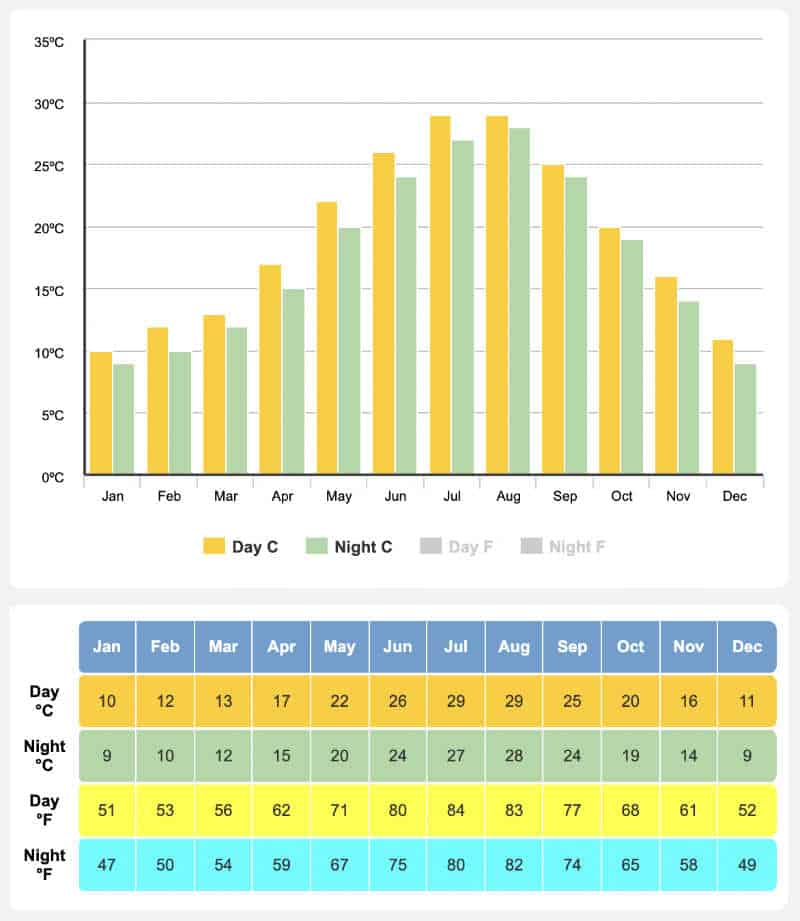
As you can see from the figure above, Greece has very mild weather compared to other European countries or even compared to North American weather.
The weather on the Greek islands can be very windy in the summer (July and mostly August) but this is something that cannot be predicted, so I am not going to give you any advice on that other than you should be prepared for it.
As a rule of thumb and according to my experience of having visited almost all greek islands the last 35 years, the only thing that can ruin your greek holidays is not the temperature or rain, but the strong winds that you may come across, which will prevent you from enjoying a day on the beach.
There are some greek islands that are notoriously windy (such as Andros or even some parts of Crete) but in general, you shouldn’t worry that much, and chances are that you won’t face any typhoons or storms (there is none of this in Greece by the way!).
Best Time to Visit Greece for swimming and beach life
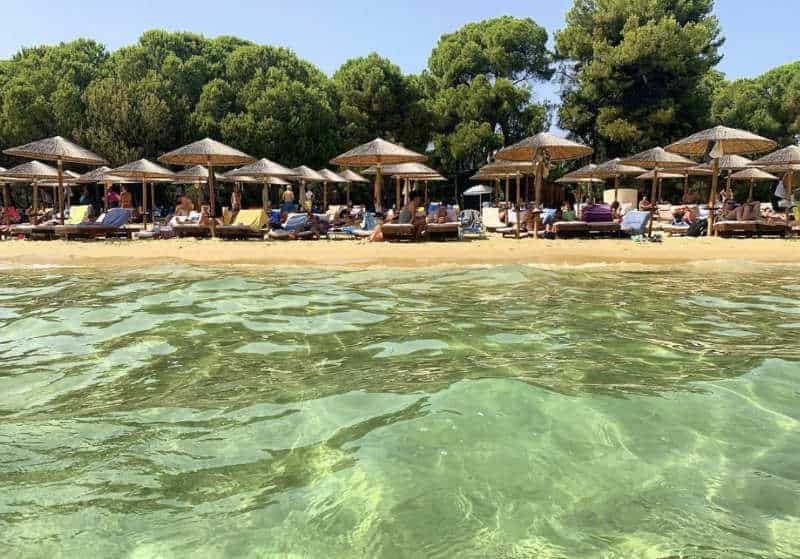
Beaches in Greece are some of the best in the world, so beach life and swimming in the crystal waters of the Aegean sea or the Ionian sea makes absolute sense as the main target of your trip to Greece!
The best time of year to visit Greece for beaches and swimming is during the summer months of June, July, August, and September as this is when the sea waters will be hot and you will enjoy the most beach bars and clubs on every island (or even mainland Greece).
Best time to visit Greece for good weather

The best time to visit Greece if you are looking for warm weather is any month between June and October.
The temperatures during these months are the highest of the year and they can actually be boiling (up to 42 degrees Celsius due to world climate change).
You should be very careful during that time because the sun can be very harmful if you are not protecting your skin properly or hydrating yourself regularly.
If you are not used to those temperatures or you want less hot weather then you should visit Greece in May or October because the weather is definitely less hot during these months.

You should also bear in mind that the weather during the winter (or low season) months from November till April can be very unpredictable.
You may get 25 degrees and sun or you may get 0 degrees and snow!
BUT as a rule of thumb, you should always have in mind that bad weather in Greece only lasts for a few days (3-5 days on average).
In fact, every time we have terrible weather in Greece with snow or colder temperatures…it’s on the news! 😊
Best Time to Visit Greece for Honeymoon

A honeymoon in Greece can be an exceptional experience but I truly believe you are going to have the best time if you go to Greece in June.
June in Greece has awesome sunny and warm weather which is perfect for swimming in your private pool or in the sea.
The great thing about June in Greece though is that in general, the islands are less crowded and less expensive.
This does not apply to Santorini and Mykonos though as they are expensive any time of the year nowadays but you will definitely find fewer tourist crowds during those months.
W hen is summer in Greece ?
Summer in Greece is the months of June, July, and August but you will also get sunny warm weather in May and in September.
For you to understand the temperatures in Greece bear in mind that April and May in Greece are like the hottest months you can get in major European cities such as Paris or London UK.
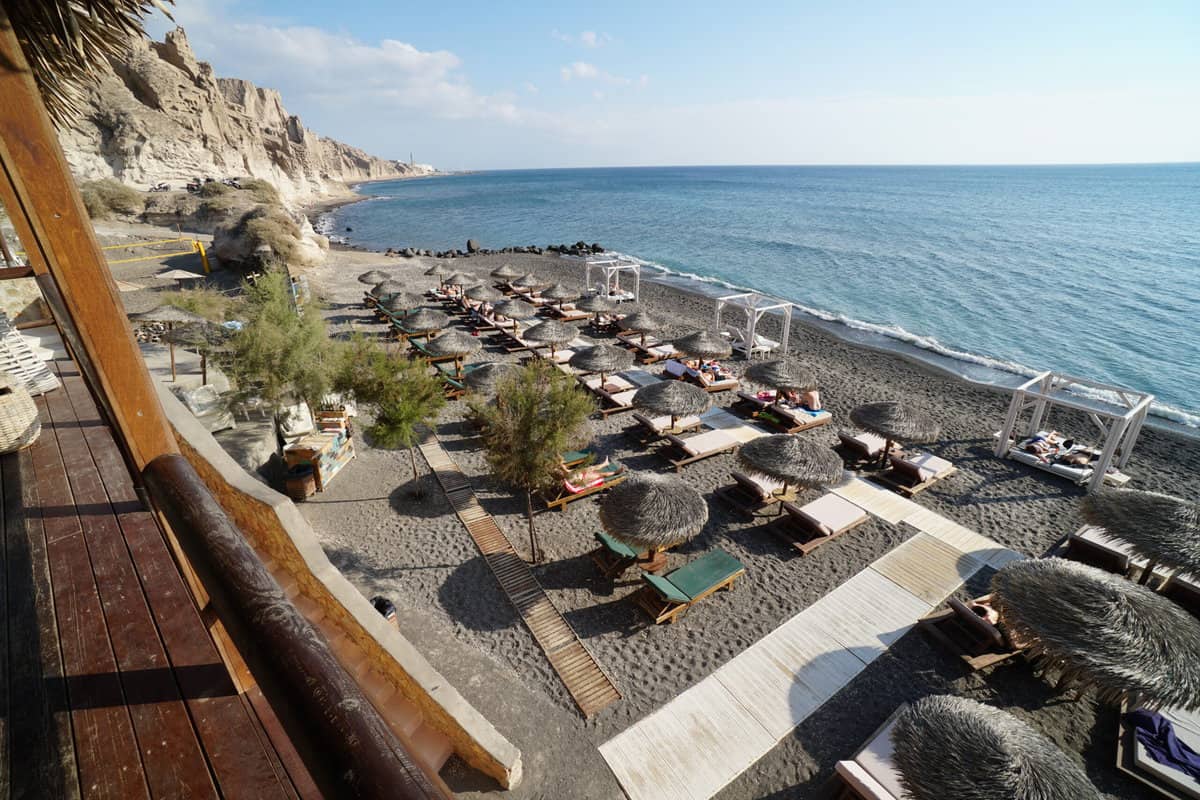
June, July, and August can be very hot (taking into account the global climate change as well…) you may get temperatures of up to 43-44 degrees Celsius (110 Fahrenheit).
Weather in Greece in September
I keep on telling people who want to go to Greece that September is the best month to do so because the weather is not that hot and most of the places are not that crowded with tourists.
Weather in Greece in September is exceptional with temperatures up to 32 degrees Celsius. Here is the weather in Greece in September in a nutshell:
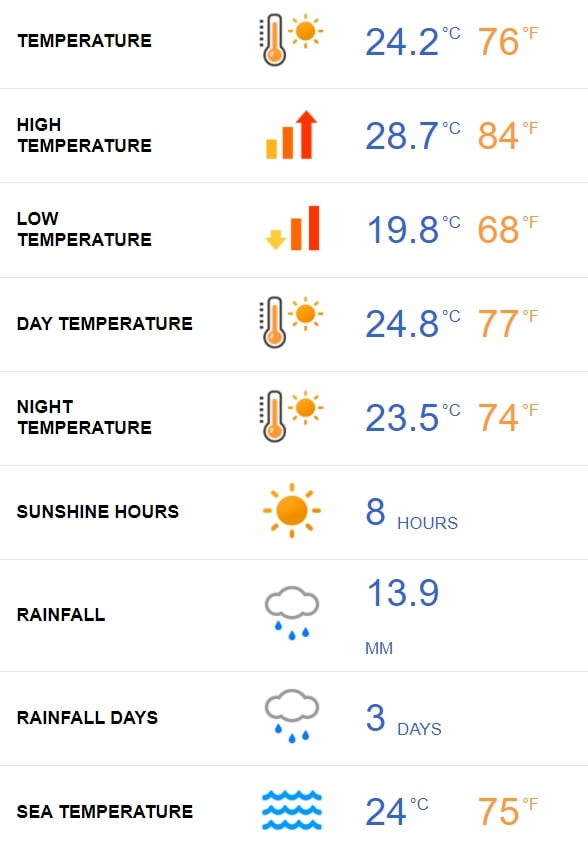
What is the best month to travel to Greece?
The best month of the year to travel to Greece and to the greek islands is June and September. This is usually called the shoulder season in Greece, while July and August is the peak season (or high season). During these 2 months, you will get warm summer weather (between 20-35 degrees Celsius or 70-95 degrees Fahrenheit) but you will also get fewer tourists and lower prices in general. The summer months in Greece are June, July, and August but most tourists and the large cruise ships go to Greece in July and August so these are the busiest and most expensive months. So, I would say that the best time to go to Greece is mid-June or mid-September where you will get warm weather but fewer tourists.
When should you avoid Greece?
You should definitely avoid visiting Greece during July and August as these are the busiest and also hottest months. You should also know that 99% of the Greeks go on holiday in August. If you want to visit any Greek island such as Santorini or Mykonos you should definitely avoid July and August and also possibly September as the last years September feels like August in these 2 islands.
What is the cheapest time to go to Greece?
The cheapest time to go to Greece is the low season (or winter) which is the months between November and March. You can also visit Greece in April or May but this is usually the time when the greek easter occurs and it’s usually the time when the Greeks go to the countryside or the islands they come from to celebrate Easter Sunday of the Greek Orthodox Easter. usually, the prices in hotels and Airbnb’s are slightly more expensive during that time. If money is an issue for you then I would recommend visiting Greece during the winter or at least visit in the should seasons of May-June and September-October.
How many days in Greece is enough?
You need at least 7 days in Greece but it really depends on your situation and if your visit is part of a longer visit in Europe. In theory, the absolute minimum number of days you need in Greece is 3 days. During these 3 days, you can spend 1 day in Athens and then head to one of the greek islands (make it Santorini if you can as it is the most impressive greek island). I do not generally recommend visiting Greece for such a short period of time as I am not a big fan of the tick-the-box holidays and I really like to spend some proper quality time anywhere but I also understand that everyone’s situation (and bank account…) is different so that’s my advice!
Which Greek island is the prettiest?
Well, if you ask a greek this question you will get a different answer! However, it is globally accepted that Santorini is the prettiest island of them all and there are excellent reasons to believe that in general. My personal opinion is that every greek island is an extremely pretty destination and you can definitely find beauty and amazing places on each one of these, even the less known ones.
The best time to visit Greece is definitely some time between the months of June and September.
All areas are usually less crowded in June but you will still get awesome warm weather and you should be able to go swimming and enjoy the sunny summer weather.
You should definitely avoid August as it is the most crowded month of the year and accommodation and restaurants can be very expensive during that time.
You should also bear in mind that most businesses (hotels, rooms, bars, restaurants, and shops) on the islands operate mostly between May and October.
The weather in Greece in September is awesome and it still feels like summer for the most part with sunny days and warm sea waters.
RECOMMENDED WEBSITES FOR GREECE:
🛏️ Booking.com is the website with the most available rooms and Private Villas in Athens, Santorini , Mykonos & Crete (more than Airbnb!)
⛴️ Ferryhopper is the best website to book your ferry tickets or check the timetables for Santorini, Mykonos , Crete & all greek islands
🏺 Get Your Guide has the best and largest variety of Tours in Athens and the greek islands (Santorini, Mykonos, Crete etc)
🚙 Rentalcars is the easiest way to rent a car or a quad for Greece with thousands of available options
✈️ Booking.com Flights has all the available flights to and from the greek islands
🚕 Book Your Driver (Taxi) directly with booking.com's large and safe platform of available certified drivers
SUBSCRIBE to my Youtube Channel for Updated Guides and Videos for the Greek Islands!
4 thoughts on “Best Time to Visit Greece and the greek islands”
Thanks for this! I’m planning a trip in late november, after reading your blog, I wondering if you think it’s still an advisable time to go since it’s going to be cold and rainy?
You are definitely going to have a great time any time you visit Greece but unfortunately you won’t be able to enjoy the beach life in November. Almost 100% of the business by the beach close at the end of October and the sea will probably be too cold for most people in November.
I wanted to know if you think I should visit in 1st week of April.. I am planning a trip for my birthday.. but I have received contradicting answers on google.. some say it is the worst some say it is good…will i get to enjoy the beaches in April? And is it lively in general during that time?
Hi, The weather in early April won’t be summer perfect so you won’t be able to enjoy the beach life to be honest. It also really depends on the place that you will visit. If you are looking to visit the islands then they will definitely feel deserted but Santorini always has lots of tourists throughout the year but the beach side areas will be pretty much empty.Bear in mind that April is usually the month where the Greek Easter occurs which is a pretty big celebration for us in Greece and all the areas (including the islands) get livelier. So, if beach life and awesome weather is your main priority then 1st week of April is not the best time to visit Greece. You are most likely going to get good weather but it’s not for sure as March and April have relatively unstabel weather but you may also get sunny days with 20 degrees celsius. You can definitely swim in the beach if you dare to, but the water will be cold for most people (it also depends on your experience and what you think is cold and hot). The main thing though is that most businesses on the beach side areas on all islands (restaurants, hotels and beach bars) will be closed as they usually open towards the end of April and early May and then close at the end of October. If you are looking to visit Athens though, April is probably the best time for all the attractions as you will avoid the crowds of the summer and the very hot weather. Hope that helps!
Leave a Comment Cancel reply
Save my name, email, and website in this browser for the next time I comment.
MORE TIPS FOR GREECE
- Where To Stay In Santorini
- Best Hotels in Athens
- Best Boat Tours in Santorini
- Where To Stay In Mykonos
- Where To Stay In Crete
- Where To Stay In Athens
- Best Luxury Hotels of Santorini
- Best Honeymoon Hotels of Santorini
- Tipping in Greece
- Best Hotels in Thessaloniki
- Best Hotels in Delphi
- Best Hotels in Meteora
- Best Hotels in Rhodes
- Best Hotels in Amorgos
- Best Hotels in Paros
- Best Hotels in Naxos
- Best Hotels in Milos
- Best Hotels in Skiathos
- Best Hotels in Zakynthos
- Best Hotels in Kefalonia
- Best Hotels in Alonissos
- Best Hotels in Andros
- Best Villas in Santorini
- Best Villas in Mykonos
- Best Villas in Crete
- Best Hotels in Chania
- Best Hotels in Oia
- Best Hotels in Fira
- Best Hotels in Imerovigli
- Best Hotels in Syros
- Best Hotels in Hydra
- Best Hotels in Spetses
- Best Wine Tours and Wineries of Santorini
- Best Tours in Santorini
- Best Sunset Cruises in Santorini
- Best Time To Visit Santorini
- How To Get Around in Santorini (buses, taxis and quads)
- Crete To Santorini (daytrips, tours, ferries and flights)
- Best Hotels at Heraklion Crete
- Best Villas in Heraklion Crete
- Best Greek Islands for families
- Best Greek Islands for couples
- Best Time to Visit Greece
- Best Cave Hotels in Greece
- Best Greek Islands Near Athens
- Best Family Resorts in Greece
- Best Chania Beaches
- Best Family Hotels in Crete
- Best Cave Hotels in Cappadocia
- Acropolis Museum: all you need to know
- Best Beach Villas in Crete
- Best Greek Island Tours From Athens
- Best Things to Do in Greece
- Best Beaches in Athens
- Best Things to Do in Pyrgos Santorini
- Best Hotels in Pyrgos Santorini
- Acropolis Tickets: Best Tips and Options
- Akrotiri Prehistoric City: All You Need to Know
- Santorini Tomato Museum: All You Need to Know
- Best Beaches in Corfu
- Best Greek Islands for Older Couples
TOP RATED HOTELS IN:
Santorini: Canaves Oia Suites Mykonos: Cavo Tagoo Mykonos Athens: Coco-Mat Athens Crete: Domes Noruz Chania Hotel Corfu: Corfu Imperial Resort Rhodes: Casa Cook Rhodes
Delphi: Amalia Hotel
Meteora: Doupiani House
TOP RATED VILLAS IN:
Santorini: Villa Aura
Mykonos: Villa Evi
Athens: Acropolis Villa
Crete: Cavo Dago Villa
BEST THINGS TO DO IN GREECE:
🌄 Santorini Sunset Cruise
🥾 Samaria Gorge Full Day Hike
🏛️ Acropolis Guided Tour
🪨 Meteora Day Trip from Athens
🏛️ Delphi Day Trip from Athens
ALL AVAILABLE FERRIES TO GREEK ISLANDS:
Readers said:.
“Just added this to my favourites!”
“I don’t know if I will have to go anywhere else for information!”
“Better than a travel guide!”
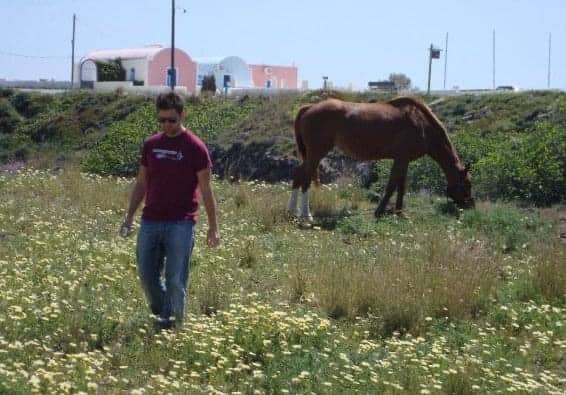
My name is Pavlos and I come from the beautiful country called Greece. You can follow me on Twitter here and I will try to do my best to respond to you personally. This is my blog to help you plan your next holidays to Greece and the greek islands, whether it is Santorini, Mykonos, Crete or even Athens. I was actually born in Athens, and I have been to almost all of the greek islands and pretty much most of mainland Greece. I know the ins and outs of my country and hopefully, my travel blog will help you make the most of your holidays.
Booking.com i s the website with the most available rooms and Private Villas in Athens, Santorini , Mykonos & Crete (more than Airbnb!)
Ferryhopper is the best website to book your ferry tickets or check the timetables for Santorini, Mykonos , Crete & all greek islands
Get Your Guide has the best and largest variety of Tours in Athens and the greek islands (Santorini, Mykonos, Crete etc)
Rentalcars is the easiest way to rent a car or a quad for Greece with thousands of available options
Booking.com Flights has all the available flights to and from the greek islands
Santorini Secrets
Owned by World Secrets Ltd , Hyett Court, Honour Lea Avenue, E201HH, London, United Kingdom Company Number: 10622010 All Rights Reserved Copyright World Secrets Limited 2024
When is the best time to visit Greece?
T he best time to visit Greece is during May, September, or the first days of October. Generally, you can visit Greece all year round and have a wonderful time. But the typical tourist season in this country is from the Easter period, through October. The peak season is in summer when Athens and the Greek islands offer their hospitality to tourists. July and August are the months with the most tourists. But the best period to visit Greece is during the late spring. The weather in these months is pleasant, with no presence of rain. Also, there are fewer tourists. This way, you can explore the country at ease.
Do you want to have a Mediterranean adventure? Our comprehensive guide will help you choose the right time for a Greece vacation.
When is the best time to visit Greece for vacation?
Travelers visit Greece all year round. Some months are better to visit than others, especially if you want to explore the sunny beaches, avoid the grand masses, or have fun in party islands like Mykonos. There are a few tourist seasons you have to remember before you book your ticket, like:
- High season: It is from June to September
- Shoulder season : This season includes the months of April, May, and October
When to visit Greece if you want to avoid the masses

The most popular seasons to visit this illustrious country are in late spring, summer, and the early times of fall. But why are these seasons so special? The weather is mild, all the archaeological sites are open, and there are many cafes and bars. These are the periods where you can also find the most tourists.
However, if you are looking for the best time to visit Greece to avoid crowds, you should consider visiting in winter. The weather may not be as hot, but you will have the opportunity to explore the most wild side of this country. Many hotels might be closed for the winter, so contact us to help you plan the perfect holidays and choose the most suitable accommodation for you!
Best time to visit Greece weather-wise

If you want to experience the enjoyable and warm weather but want to avoid the sweltering heat, you have to plan your trip in spring or autumn. In May, the average temperatures in Athens, the capital city of Greece, are from 61.5 to 74.8 degrees Fahrenheit. In June, the temperatures can reach 82.6 degrees Fahrenheit, an ideal temperature for spending your day at the beach.
In September, the average temperatures decrease in Athens to a high of 80.6 degrees Fahrenheit and a low of 69.6 degrees Fahrenheit. Nevertheless, many Greek islands are considered to be more peaceful in September, so you might want to think about it. With an average high temperature of 71.4 degrees Fahrenheit and an average low temperature of 62.1 degrees Fahrenheit, the month of October is even colder. It is a cold month but not nearly frigid enough to be unwelcoming. You have to remember that the nation is somewhat vast, especially early when the best Greek islands attract many travelers.
When should I visit the Greek islands?
Once more, the ideal time to go depends on your goals. Generally, the best weather to visit the Greek islands is in the late spring, early summer, or September. Yes, if you have no problem with the heat, you can travel even in the middle of summer.
In July, for instance, Santorini experiences an average high temperature of 84 degrees Fahrenheit and an average low of 73 degrees. The benefit is that the water is really warm at this time of year, averaging 75 degrees Fahrenheit. The island usually only has one or two days of rain in July. So, you can be sure to make some memories under the sun!
As the weather is still warm and bright and the crowds have subsided, we consider September one of the best months to visit the Greek islands .
When should I visit Greece for my honeymoon?

While a honeymoon in Greece can be amazing, we suggest visiting in June for the most enjoyable experience! Greece offers fantastic sunshine and pleasant weather in June, making it the ideal month to swim in the mesmerizing sea. June is a great month to visit Greece since, generally speaking, the best islands for a honeymoon are less congested and more reasonably priced.
Best Time to visit Greece for swimming

Greece boasts some of the most infamous beaches in the world. Take the chance to spend your time at the beach and swim in the pristine Ionian or Aegean seas. Greek waters can make your travel majestic. Also, they are ideal for family vacations .
During the summer months of June, July, August, and September, sea waters are calm and hot. With the infamous beach bars and clubs on every island, it is the best time of the year to visit Greece for swimming and some scuba diving exploration .
When should I visit Greece to get a lower price?

It is possible to go to Greece on a tight budget. All you have to do is make appropriate preparations. Travel to Greece is most affordable in October, November, March, and April. July is usually the most costly month to fly to Greece. So, if you wish to cut costs, you should aim to avoid the midst of the busiest time of year.
Although airfare is less expensive in April, keep in mind that hotel rates go up around Greek Orthodox Easter, which occasionally occurs at the end of April. There is a comparable rise at the end of December and the beginning of January. Hotels in July and August are usually costly.
Best Greek island to visit in April

If summer is not the ideal timeline to visit a small Greek heaven, you can visit a Greek island in April. But what is the best Greek island to visit in April and have some beautiful spring moments? This island is in the Cyclades. It is called Tzia. The beautiful Chora, the cosmopolitan Vourkari, and the wild scenery will take your breath away the minute you step onto this island.
Worst time to visit Greece

As mentioned above, Greece is a great place to visit year-round. But July and August, particularly in Athens, can be unbearably hot and muggy, with highs frequently exceeding 86 degrees Fahrenheit.
Conversely, January is the coldest month in Greece, with average highs of about 55 degrees F. However, the cold air makes it the best time to visit Athens’ or Thessaloniki’s ancient landmarks, stores, and art galleries.
You can visit Greece all year round but the best time is spring or summer. A trip to Greece can help you relax and create lasting memories. Contact us to help you plan the perfect trip!
5 best cities to visit in Greece
Here’s your go-to guide to the spots you don’t want to miss..

Cities rarely top the list on a Greek itinerary—many travelers just carve out a quick visit to Athens to see the Parthenon, then catch a ferry to the islands. And there’s nothing wrong with that.
But as someone who traded my hometown of Manhattan for Thessaloniki and Athens two decades ago, I am here to tell you: You’re missing out. Visiting the best cities in Greece can add so much to a vacation. Hear me out: Besides the sights and museums, you can live like a local, lounging in cool cafes, checking out the contemporary restaurant scene, and shopping at artisan-run boutiques. Plus, some of these cities are cheaper than high-profile island destinations—and all have easy access to beaches, either right in town or within close reach.
Of course, this doesn’t mean that you need to skip the islands. There are many cities that make a great addition to an itinerary—or a good jumping-off spot for island-hopping. Here are my favorite five cities to check out.
Athens: For classical antiquities and avant-garde art
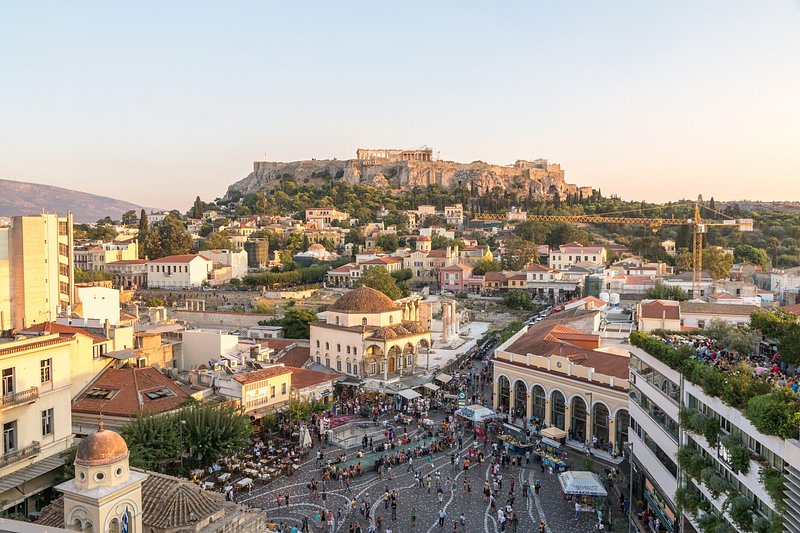
Even without the Parthenon , the Acropolis Museum , the Ancient Agora , and the National Archaeological Museum —all magnificent places to see— Athens would make a worthy destination. The city’s urban energy is sharpened by its contrasts, like the untamed nature surrounding Mt. Lycabettus , where you can hike to the top (or take a funicular) to enjoy a view that extends from the Parthenon all the way to the port of Piraeus and the Saronic Gulf . And then there are all the neighborhoods to explore, from the counter-cultural haven of Exarchia (for great street art and vintage clothing shops) to the elite Kolonaki district (home to the Benaki Museum of Greek Culture and the Museum of Cycladic Art ).
Highlights in the center of Athens include watching the Evzones (the changing of the guard) at Syntagma Square and checking out the catch of the day at the Varvakeios central market . On balmy summer nights, enjoy opera at the ancient Odeon of Herodes-Atticus near the Acropolis, a concert in the lively Gazi district, or a film under the stars at one of the city’s open-air cinemas, like Dexameni and Thisseon .
Where to eat : For a low-key dinner, Tanini Agapi Mou (which translates as “tannins, my love”) is a fun destination with natural and biodynamic Greek wines and snacks (cheeses, salads, bruschetta). Kolonaki’s Filippou serves classic homestyle dishes like beef stewed in tomato and wine or artichokes in an egg-lemon sauce, and the white tablecloths are a nice touch.
Hotel picks : Few hotels in Athens are as close to the Parthenon as the Herodion , in the serene Koukaki area. There’s a splendid view of the monument from its rooftop restaurant, as well as from some of the rooms. Elegant, minimalist Mona , converted from a 1950s textile factory in the sociable Psyrri district, is perfect for a design-forward stay.
Tip : As impressive as all the classical antiquities are, you don’t want to miss modern culture in Athens. A visit to the National Gallery gives a thorough introduction to the Greek art of the post-Byzantine era to the present (don’t miss the works of 20th-century masters like Tsarouchis and Moralis). The EMST, also known as the National Museum of Contemporary Art , is a great pick for avant-garde exhibitions, both Greek and international.
Thessaloniki: For a university town with ancient vibes

Greece’s northern port city—five hours by car or train, or a very short flight from Athens—offers a completely different experience. While a distant second to Athens in population, in lifestyle and culture, it’s second to none. This youthful yet sophisticated university town has been millennia in the making, with monuments from three empires casually integrated into the urban fabric.
Highlights include the Roman Agora and the Rotunda , the many UNESCO-recognized Paleochristian and Byzantine monuments like Agia Sophia and Agios Dimitrios , and the Ottoman-era Alaca Imaret and Bey Hamam . A wealth of museums—from the superb Archaeological Museum and the Museum of Byzantine Culture to the MOMus Museum of Contemporary Art span pre-history through the avant-garde.
Around sunset, everyone heads to the glamorous Belle-Epoque seafront for a volta—Greece’s answer to Italy’s passeggiata. Later in the evening, join locals at the bars and tavernas in the Ladadika neighborhood to see why Thessaloniki is known for nightlife.
Where to eat : Bougatsa (a flaky sweet or savory pie) is a favorite morning treat, especially from Bantis . For lunch, it’s hard to find a more satisfying meal than crisp fried salt cod with skordalia (a zesty garlic spread) served on a sheet of paper at either of the two Bakaliarakia locations by the harbor. For a sweet taste of Asia Minor, visit Chatzis Dairy in the central Modiano Market . Try the kazan dibi—a thick, caramelized buffalo milk pudding.
Hotel picks : The elegant Electra Palace , overlooking central Aristotelous Square and the sea, is worth the splurge. Zeus is Loose , also central, has huge windows looking over a park. It’s a sociable choice, with a rooftop bar and dorm rooms with bunk beds and shared baths (though you can also book a double with a private baths).
Tip : Thessaloniki is the ideal urban basecamp for a variety of experiences. Halkidiki , just an hour’s drive down the coastline, has famously dreamy beaches, like Kavourotrypes . Meanwhile, the world of Alexander the Great still dazzles at Ancient Pella and the Museum of the Royal Tombs at Aigai , each also an hour away by car. Want to go island hopping? Ferries connect Thessaloniki with some of the best islands in the North Aegean: Chios, Samos, Lesvos, and Limnos.
Chania: For Cretan character in a Venetian setting

My family has a summer home in Chania . Yet no matter how many times I visit, I can’t get enough of the photogenic Venetian Harbor , with its tangle of romantic, jasmine-scented alleys.
Despite its popularity with visitors, Chania still retains a strong sense of place, particularly in districts like Splanzia (just east of the port) or in lush, aristocratic Chalepa (a short taxi ride or pleasant walk to the east). Here, amid birdsong and neoclassical mansions, you’ll find the new Archaeological Museum , the Russian-style Church of Mary Magdalene in its large garden, and the Museum-Residence of Eleftherios Venizelos , a key figure in the history of modern Greece.
Nearly every afternoon in summer, you’ll find me at the elegant old cafe in the Municipal Garden , where locals love to gather to read the paper, sip thick Greek coffee served in a copper briki, and socialize under the trees. The beautiful outdoor Municipal Cinema , also in the garden, shows film in their original language with Greek subtitles.
Where to eat : Locals take a break from their errands for a Cretan-style bougatsa—here, it’s filled with tangy cheese and topped with sugar. I love Bougatsa Chania , which is right across from the post office, in case you have postcards to mail. For a traditional Cretan lunch or dinner, Mezedoscholeio is a good value. Reviewers rave about the lamb and the baked feta. Try to snag one of the tables on the patio.
Hotel picks : In a Venetian building, Splanzia Boutique Hotel hits high marks for atmosphere and a homemade breakfast served in the courtyard. Want to save money? I recommend the friendly Kumba Hostel , a short stroll from Koum Kapi Beach —you can book a double room with a private bath, or for deep savings, there are shared, dorm-style spaces.
Tip : The Samaria Gorge is unforgettable. Hikers set out for Xyloskalo (elevation 4,035 feet) close to dawn. From there, they begin the 10-mile descent to Agia Roumeli on the south coast, a village so isolated by rugged terrain that it can’t be reached by car. After a dip in the Libyan sea, a boat takes you to Sfakia for transfer back to Chania.
Rhodes Town: For medieval splendor and island-hopping

The medieval Old Town of Rhodes is a UNESCO World Heritage site that was once home to the Knights of Rhodes (later known as the Knights of Malta). Highlights include the Palace of the Grand Master —magical on a warm evening—and the Street of the Knights .
Just outside the old city walls, Rhodes is packed with a variety of sights from different eras.Charming Mandraki Harbour was once the site of the Colossus of Rhodes , one of the seven wonders of the ancient world. Very close to it, you’ll find the National Theater of Rhodes —a stellar example of Italian modernism. Across the street from the theater, by the Muslim cemetery and the Mosque of Mourat Reis , is a (hidden) highlight: the Villa Cleobulus , Lawrence Durrell’s home after WWII. The setting is just as he described it in Reflections on a Marine Venus (the perfect read before a visit to Rhodes), while the Marine Venus herself is now located at Rhodes’ Archaeological Museum .
Where to eat : A piece of sweet or savory phyllo pie fresh from the wood oven at Fournariko makes a perfect breakfast on the go. For dinner, 4 Rodies is a favorite with locals and visitors alike thanks to its homestyle dishes (don’t miss the dolmadiakia—stuffed vine leaves) and plenty of vegetarian options.
Where to stay : On a recent visit, I stayed at the spacious A33 Rhodes Old Town House with a large group of friends. It’s full of character—think, a pebble mosaic floor in the hall, exposed stone walls, and a velvet-cushioned reading nook. Solo travelers and couples might prefer the atmospheric 10GR Boutique Hotel and Wine Bar , in a historic stone building with a modern design.
Tip : All over Greece, KTEL buses run between towns and cities. At the KTEL station near Liberty Gate , you’ll find buses that will take you to fabulous beaches like Anthony Quinn Bay , about half an hour from Rhodes Town. I liked it so much that I threw away a plane ticket to spend two extra days here, snorkeling with colorful minnows and reading under the pines.
Corfu Town: For aristocratic glamour with an Italian (sometimes French, sometimes British) accent

Corfu Town, with its pretty Venetian Fortress , neoclassical houses, and warm palette of ochres and dusky pinks, offers a Greek-island experience with an extra hit of glamour. The Old Town , punctuated by the tall belfry of the 16th-century Church of Saint Spyridon , is recognized by UNESCO as a World Heritage Site. Landmarks from French and British rule give Corfu Town a cosmopolitan mood, especially around Spiananda Square . At the north end is the Regency-style Palace of St. Michael and St. George, now the Corfu Museum of Asian Art , with one of the finest collections in Europe. Meanwhile, along the western edge of the square, the early 19th-century Liston (Corfu’s famous Rue-du-Rivoli-like colonnade built during French rule) makes a great setting for a morning espresso or afternoon spritz. Even in sports, Corfu has an international flavor—you might see a friendly cricket match in the square.
Where to eat : With its fairy lights and beautifully set tables, the courtyard of the Venetian Well makes a dreamy setting for enjoying a five- or seven-course tasting menu of dishes like rockfish risotto and braised lamb with apricot and cured lemon. To try Corfu’s Italian-influenced dishes, like bordetto (fish with a zesty tomato sauce) or sofrito (beef in sauce of garlic, vinegar, and wine), visit Rouvas .
Hotel picks : Its central location and modern rooms, some with stellar views of Spianada Square , make the Arcadion Hotel a very good choice. The Angsana Corfu , about six miles south of Corfu Town, has a massive infinity pool overlooking the Ionian sea.
Tip : I love to come here during Easter week to see Corfu’s elaborate celebrations including a staged earthquake at the Church of Virgin Mary of the Foreigners (held on the morning of Holy Saturday), followed later by the “botides”—when Corfiots throw large clay vessels off balconies (watch your head!). But this is a wildly popular time to visit, so book early.
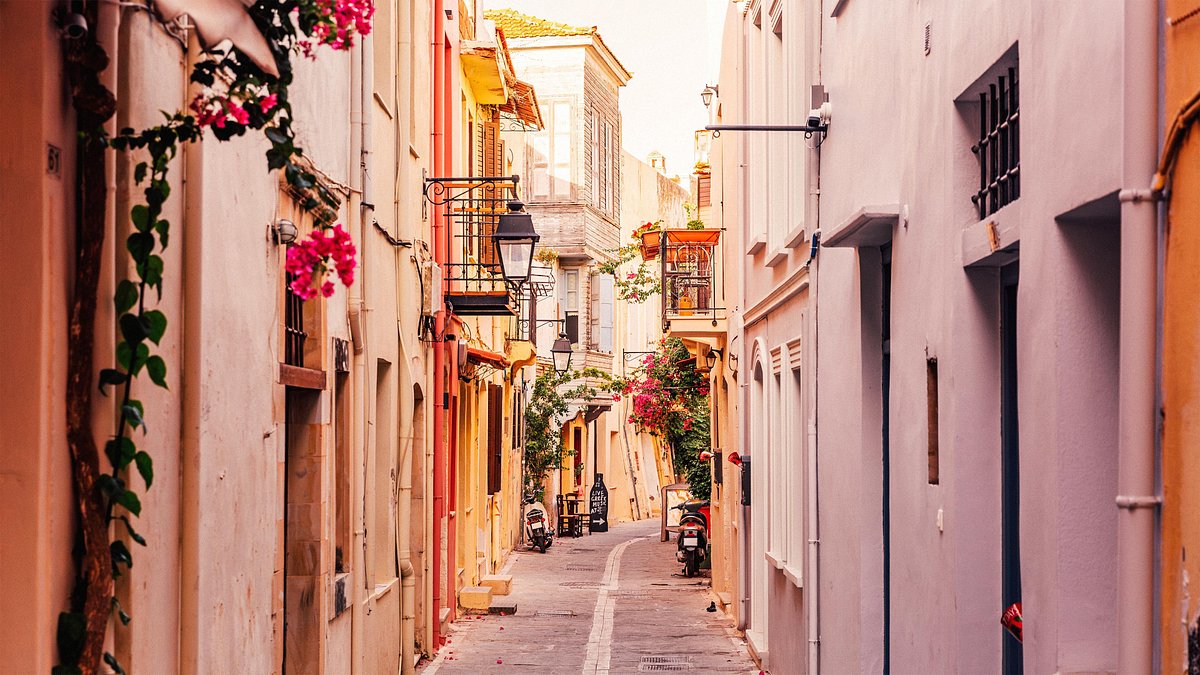

7 Best places to visit during Summer 2024
S ummer 2024 is around the corner, and it's time to plan a fulfilling getaway. Whether one likes exploring nature or soaking in the sun at the beach, the world has fantastic destinations for everyone to plan their Summer 2024 holidays. One can dive into a rich cultural heritage or just reminisce about beautiful sceneries.
Whether one wants to explore beautiful European beaches or hike across rocky mountains, the list curated below by the team at SportsKeeda includes beautiful and serene places. One can travel with their family or fly solo to these beautiful locations. The places mentioned below can be added to the bucket list of each individual.
7 must-visit places in Summer 2024
The summer season is meant for tropical destinations, sipping cool mocktails, or just taking a hike in the beautiful rocky mountains. One must visit the places mentioned below in the Summer 2024:
- Santorini, Greece
- Sydney, Australia
- Tangier, Morocco
- Rome, Italy
- Machu Picchu, Peru
- Barcelona, Spain
1) Santorini, Greece
Santorini, Greece, stands out as a top destination for Summer 2024. Their white buildings on the cliffs beside the deep blue sea are like a dream come true! The weather during Summer 2024 will be perfect for exploring the beautiful streets of Santorini. One can try delicious Greek food by the sea and watch the beautiful sunset over the caldera.
Santorini offers something for every traveler. Whether one wants to chill at the black sand beaches, learn history in places like Akrotiri, or go sailing around the Cyclades, there are a lot of activities one can do in Greece. The city provides the perfect itinerary for a memorable vacation in 2024.
Fiji is the ultimate destination to visit in Summer 2024. It has a perfect blend of tropical paradise and cultural richness. Known for its pristine white sand beaches, crystal clear turquoise waters, and vibrant coral reefs, Fiji is an ideal setting for those who are looking for a sun-soaked vacation.
The island nation is known for its plethora of water activities like snorkeling, colorful marine life, and exploring hidden lagoons as well as waterfalls. The summer weather enhances the experience and provides ideal conditions for enjoying the outdoors. This can be a dream Summer 2024 getaway.
3) Sydney, Australia
Sydney is the ultimate destination one can explore in the Summer 2024. Known for its iconic beaches, such as Bondi and Manly, the city comes alive during the summer months with vibrant festivals, outdoor events, and a buzzing atmosphere.
Sydney is known for its stunning landmarks like the Sydney Opera House, and Sydney Harbour, which provide a picture-perfect moment against the beautiful skies. The city is known for its diverse culinary culture, from seafood to global delights. Sydney's energy, when mixed with natural beauty and cultural offerings, makes it a perfect destination for Summer 2024.
4) Tangier, Morocco
Tangier, Morocco, offers a perfect blend of history, culture, and coastal experience. The Mediterranean climate brings out warm temperatures and a refreshing sea breeze during the summer months. This helps create an inviting atmosphere for travelers for relaxation and cultural exploration.
Tangier is filled with traditional cafes and bustling souks where people can sip delicious Moroccan mint tea . This experience can be a memorable summer escape with a perfect blend of relaxation and cultural discovery.
5) Rome, Italy
Rome beckons as a city renowned for its magnificent tourist attractions like the Colosseum and Roman Forum, alongside its delectable Italian gelato and mouthwatering Italian cuisine. This city has a perfect blend of history and modernity.
Rome's summer events include local festivals and add an extra layer of excitement. From open-air concerts to lively street markets, Rome is known to come alive with a festive spirit. One can immerse in the local culture, savor authentic Roman dishes, and visit pretty outdoor cafes. Rome is the perfect getaway destination for Summer 2024.
6) Machu Picchu, Peru
Machu Picchu is the ultimate destination for Summer 2024. The warm and dry weather during the summer months makes exploring the ancient Incan citadel a magical experience. Machu Pichu is known for its intricate architecture and amazing views.
Machu Picchu is known for its greenery and beautiful sunrises. The hike to the iconic Inca Trail has fresh greenery that adds an extra layer of beauty. The Ican civilization sites are a must-visit if someone is planning to take a trip to Peru!
7) Barcelona, Spain
Barcelona is an amazing place to go in the summer. It is known for its festivals, concerts, and cool street shows. One can wander down La Rambla and try tasty tapas. There are amazing buildings to explore, like Sagrada Familia and Park Güell, designed by Antoni Gaudí. One can also visit Barceloneta Beach, for a refreshing escape by the sea.
Barcelona is the perfect city to make beautiful memories with family during the summer holidays. It has a mix of culture, architecture, and beachy vibes, making it the perfect getaway for the summer.
One can visit any place from the list given above in the summer season. These seven global destinations can be the perfect places for relaxation and summery vibes. Every destination is packed with a lot of adventure, exploration, and lifetime experiences.
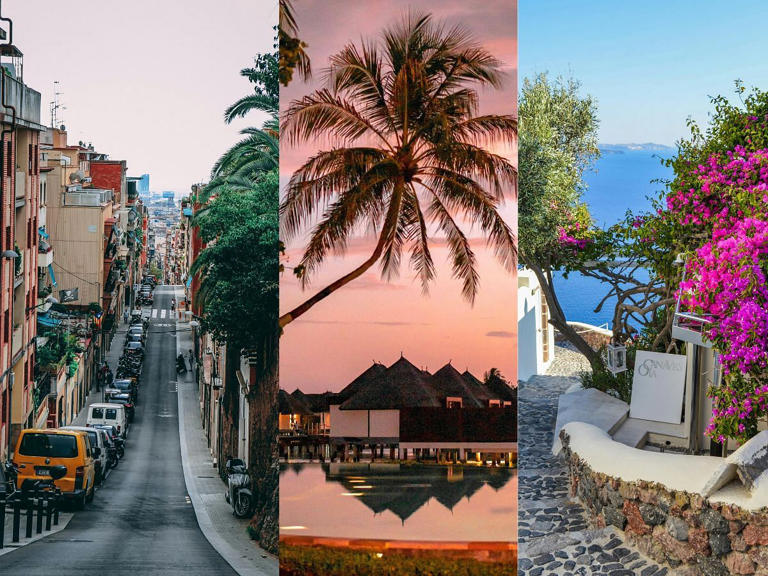

IMAGES
VIDEO
COMMENTS
Overall, the best months to visit Greece are anywhere between the end of April and the beginning of November. April is when the good weather starts to come out in Greece and by the time May hits, the sun is shining, the birds are chirping, and the water is starting to warm up.
For the best weather conditions, the best time to visit Greece is during spring (April to early June) or autumn (September to October) outside the summer peaks (July to August). These periods offer warm and sunny weather at around 24°C (75°F), without swarming crowds and the highest prices. While planning a trip to Greece, read on to find out ...
If it's your first time in Greece though, check these top 10 tips for traveling to Greece in the summer first. 1. Visit Greece in summer, but avoid July and August. Here is my number 1 tip: if you can, try to avoid July and August. Visit Greece in early June, mid September or even early October instead. Here's why June and September are the ...
Best Times to Visit Greece for Smaller Crowds. Unsurprisingly, the most popular times to visit Greece are the late spring, summer, and early fall months. This is when the weather is ideal, and all ...
Summer (June, July, August) Summer is the best time to visit Greece's beautiful beaches. Image Credit: Greg Montani from Pixabay. It probably comes as no surprise that summer is the most popular time to visit Greece. Unfortunately, this also means it's the most crowded time in Greece.
Greece is famed for its crystalline seas, ancient attractions, and warm hospitality.. Summer is when most travelers choose to explore its countless islands, while spring and fall are the best times of year to marvel at the myriad of archeological sites dotted around the country.. Winter can be cool and occasionally rainy but for those conscious about budget or interested in seeing how the ...
Glenn van der Knijff. The best times to visit Greece are in the spring and fall. From April to the beginning of June, the heat of summer has not yet set in and the cruise ships have not arrived with their thousands of tourists. From late September through October it's usually still warm enough for the beach but much less crowded.
Generally, the best weather in Greece is what you'll experience in May, June and September. Plenty of sunny days that aren't too hot make May an ideal time for long, leisurely walks in Athens. By June, the beaches of the Aegean islands are warm enough for swimming and popular islands like Mykonos aren't crowded yet.
Greek islands in the summer - credits: Shutterstock.com. One of the most common questions among travelers is, 'When is the best time to visit Greece?'Although Greece has its charms year-round (yes, there are plenty of reasons to visit Greece even in the winter), and locals have reasons for preferring one month or two over the others, almost everyone agrees that the summer months are when ...
Best for: Exploring the coast, summer sales. From early June onwards, millions of tourists land in Greece to discover its countless islands, architectural wonders, and delicious food. Temperatures can reach the high 90s on the warmest days, and the water in the surrounding Aegean and Ionian seas heats up accordingly.
Visiting Greece in Autumn. Autumn is an excellent time to explore both the mainland and islands without the intense summer crowds. Early Autumn is usually the best time to visit in terms of good weather - the weather is usually more pleasant (still relatively warm and less likely to rain).. During early autumn (September and early October), you can still enjoy the Greek summer experience (go ...
The best time to visit Greece is outside the busy summer peaks, during spring (April to June) and early fall (September and October). Temperatures are warm but not stifling, and you'll find that destinations are open but still relatively quiet. The period from November to February tends to be colder, but city attractions remain open and are ...
In fact, there are numerous festivals of music, theatre and dance happening in the summer months, across Greece. Read our festivals section for details. The islands are busy during the summer months. For warm weather everywhere without the hordes, the best time to visit Greece is outside of July and August.
While the best time to visit Greece is any time of the year, we might pick spring as the season with the best weather—especially if you set off on your Greece tour in May, when nearly every region of the country is glowing with bright sunshine and warm temperatures. Most importantly, the country isn't too busy with visitors in the spring ...
Autumn. Courtesy of Flickr/Taver. For many, fall is the best time to go to Greece. The weather, which gets into the high 60s during the day, is still warm, but the crowds have dissipated, making it easier to enjoy the water and beaches. Like autumn in many parts of the world, the leaves change from green to red to gold, giving nature lovers ...
In summary, Summer is 100 percent the best time to visit the Greek islands! Spring is a fantastic season to visit any area of Greece; with longer and warmer days, the landscape naturally blossoms with colorful flowers and fragrant herbs. The mountains in northern Greece are a perfect destination since the weather is mild and pleasant, allowing ...
The Best Time To Visit Greece. If you want good weather, fewer crowds and affordable prices - the best time to visit Greece is May, June, September and October. The temperature during these months can range from 73°F (23°C) to 82°F (28°C). "It's not too hot and not too cold.
The Best Time to Visit Greece for Good Weather, Fewer Crowds, and Affordable Prices. Published on: March 14, 2024 by Cynthia Valentine. ... The worst times to visit Greece generally include the peak summer months of July and August, and the coldest winter months of December and January.
Greece in June. June and July is the best time to visit Greece for beach holidays. It's warm enough around the country now to swim in the sea, in fact… you'll want to. With highs of 28°C / 81°F, lows of 21°C / 50°F and an average daily temperature of 24°C / 75°F, this is a great time to visit the Greek Islands.
Best Time to Visit Greece for Good Weather: For first-time visitors, good weather is usually the most important factor and the warmest weather in Greece and the Greek islands is between late May and early October when it's sunny, warm, and the water is good for swimming. Water temperature increases throughout the summer months.
For me, the best time to visit Greece is from September until the end of October. The weather on a lot of the southern islands, such as Rhodes and Crete, is still warm enough to swim, with average ...
Best Time to Visit Greece for Weather: the weather in Greece is at its best between June and October (temperatures between 20-35 degrees C and very minimal rain) When is summer in Greece (read to find out) Best Month to Visit Greece: May or October because the weather will be warm but you it will be less everywhere.
The best time to visit Greece is during May, September, or the first days of October. Generally, you can visit Greece all year round and have a wonderful time. But the typical tourist season in this country is from the Easter period, through October. The peak season is in summer when Athens and the Greek islands offer their hospitality to tourists.
Corfu Town, with its pretty Venetian Fortress, neoclassical houses, and warm palette of ochres and dusky pinks, offers a Greek-island experience with an extra hit of glamour. The Old Town, punctuated by the tall belfry of the 16th-century Church of Saint Spyridon, is recognized by UNESCO as a World Heritage Site.
Santorini, Greece, stands out as a top destination for Summer 2024. ... Fiji is the ultimate destination to visit in Summer 2024. It has a perfect blend of tropical paradise and cultural richness ...
Vinny Sandhu and Daniel Weston sit down to reveal the draw for the Euros of Cricket - European Cricket Championship 2024. #EuropeanCricket...